#black/african american baby john doe
Explore tagged Tumblr posts
Text
224 FACTS ABOUT
The Stig
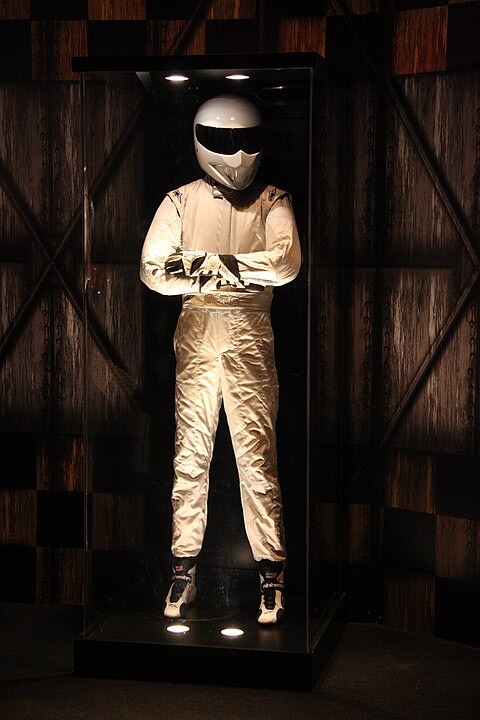
It is The Stig
It was originally going to be called “The Gimp”, but was renamed The Stig, which means having a bad fashion sense while being born poor
“We don't know its name, we really don't know its name, nobody knows its name, and we don't want to know, because it's a racing driver.”
The Stig wears its helmet on set and most cast members don’t know who it is.
The Stig does not know who it is because they wiped its memory when it got the job.
It is the Pope.
There is only one The Stig.
The Stig used to work in Rome[as the pope], but gave up its job to be able to keep up with its work here
It has no face
It is terrified of scouts
The drinks cabinet in its car contains 14 different types of custard
Its favourite T-shirt has a picture of a T-shirt
It is afraid of bells
It is confused by stairs
It never blinks
The Stig is kept in the cupboard when not in use
It naturally faces magnetic north
It has a digital face
The Stig has an evil twin named Black Stig who died after driving off an aircraft carrier but came back to life https://www.youtube.com/watch?v=8Lkh0uWFg9c
It will charge you if you attempt to remove its helmet
Its nipples are explosive
It paid a $25,000 expenses claim for some gravel for his moat
The Stig has three legs
The Stig once dreamt for a whole week straight about what Rubens Barrichello would look like in a ham slicer
The Stig is banned from the town of Chichester
The Stig is the reincarnation of Jesus Christ
The Stig bought a slightly dented white Fiat Uno from the Duke of Edinburgh
If you hold it in the wrong way, it doesn't work properly
It is 47% horse
It has 17 children due to faulty condoms
The Stig has a special pissing technique that causes floods
It once punched a horse to the ground
It has Mansell Syndrome
The Stig runs on diesel
It has a very small brain
It “has no understanding of the concept of money”
The Stig’s credit card says “The Stig” and is issued by The Bank of Money
The Stig’s favorite genres of music are: Morse code, whale songs, baroque music, advertising jingles, country & western music, sales techniques, foreign language learning tapes, ABBA but French, speeches of Margaret Thatcher, Elton John, pipe bands, vuvuzelas, national anthems, Tuvan throat singing, self help audiotapes, and “an annoying ringing sound”
The Stig has to receive awards in its left hand, as its right one is magnetic
The Stig has decided all northerners are edible
It’s mission statement is to "just go out there and drive fast"
The Stig’s opinion is worthless
The Stig has died multiple times, but the Grim Reaper is too afraid to tell it.
The extent of The Stig’s knowledge outside racing is two facts about ducks
Both facts are wrong
The three others once reenacted the journey of the three wise men, and at the end, the manger held a baby The Stig.
The next episode a month later, it was fully grown. Due to “Stigs grow very quickly, and the new The Stig was thus already fully grown.”
Stigs must be transported in delivery crates
The Stig has a fatter American cousin called Big Stig, who is a more relaxed driver
The Stig has an African cousin who only wears boots, a loincloth, racing gloves, and a helmet, has watched “The Lion King” 1780 times, ands second-best friend is a Cape buffalo
The Stig has a cousin who works as a truck driver named Rig Stig who can power slide and drift in trucks, has only one sleeve and wears special gloves, favorite song is “Forever Autumn" by Justin Hayward, and owns the world’s largest porn collection
The Stig has a red-suited Vietnamese cousin who is a communist and rides a motorcycle.
The Stig has a vegetarian cousin named Janet Stig Porter whose helmet is solar powered and wears overalls and socks with sandals
The Stig has a German cousin named Herr Stig who is identical to The Stig in every way besides having a mullet
The Stig has an Italian cousin named Bunga-Bunga Stig who wears a suit, is followed everywhere by three women, and only drives Italian sports cars
The Stig has a Chinese cousin named Attack Stig who is a kung-fu master, attacks anyone on sight indiscriminately, kicked James Lemay in the balls, beat up a large amount of the crew(even stopping in the middle of his timed lap to attack a track Marshall who accidentally entered its line of sight), and looks almost the same as The Stig
The Stig has a teenage cousin who wears headphones, wears low waist line pants showing its underwear, always looks at its phone, and made a mobile game titled “Top Gear: Race The Stig”
The Stig has an Australian cousin who lives in an open cut iron ore mine, wears dusty overalls and flip-flops, is very muscular, and has a very “large gentlemanly sausage”
The Stig has three other teenage cousins who are triplets, wear three different colored headphones and smartphones, and all have low waist line pants showing their underwear
The Stig has a Emirati cousin who looks similar to the normal Stig but wears a ghutrah on top its helmet and a huge diamond watch
The Stig has a relative of unknown association called “StigFoot” who lives in the woods
The Stig has a Japanese cousin named Ninja Stig who is a ninja, and wears a black helmet, a black ninja outfit, and has a katana on its back
The Stig has a business cousin named Business Stig who wears a red tie and a set of braces
The Stig’s father is named StigDad and wears a tank top and flare trousers
The Stig has another Australian cousin who lives upside down
The Stig has a New Zealander cousin named The Stug
The Stig has a Colorodonian cousin named Backwoods Stig who wears white racing overalls with torn off sleeves.
The Stig has a Yorkshire cousin named T’Stig with a flat cap on its helmet and 2 dogs by his feet at all times
The Stig has its own children’s book trilogy
The Stig has a chiseled jawline
The Stig has no friends
The Stig never blinks
The Stig roams the woods at night, foraging for wolves
The Stig is wanted by the CIA
The Stig sleeps upside down like a bat
The Stig can catch fish with its tounge
The Stig appears on high value stamps in Sweden
The Stig is illegal in 17 states
The Stig blinks sideways
The Stig’s breath smells like magnesium
Two of The Stig’s legs are hydraulic
The Stig lives in a tree
It’s sweat can be used to clean precious metals
It’s heart ticks like a watch
It’s voice can only be heard by cats
The Stig has two sets of knees
There is an airport in Russia named after it
Its skin has the texture of a dolphin
No matter where you are in the world, if you tune a radio to 88.4, you can hear its thoughts
The Stig has no understanding of clouds
Its earwax tastes like Turkish delight
The Stig is a master of politics
It’s tears are adhesive
If you set The Stig on fire, it would burn for a thousand days
The Stig can swim seven lengths under the water
The Stig has webbed buttchecks
Its heart is upside down
Its teeth glow in the dark
Its ears “aren’t where you would expect them to be”
The Stig once had an affair with John Prescott
If it felt like it, it could fire Alan Sugar
The Stig has upside down genitals
If it wanted to, it could crack the DaVinci Code in 43 seconds
Its ears have a paisley lining
The Stig is banned from the Chelsea Flower Show
The outline of The Stig’s left nipple is the exact same shape as the Nürburgring
If given a truly important job, The Stig will slack off and play croquet instead
The Stig invented Branston Pickle
On exceptionally warm days, it will shed its skin like a snake
The Stig is allergic to the Dutch
It’s first name is The
If it went in Celebrity Love Island, every one would be pregnant, including the cameramen
The Stig once threw a microwave at someone
The Stig once had a vicious knife fight with Anthea Turner
The Stig has nothing to do with the cash-for-honors scandal
The Stig is a CIA experiment that went wrong
The Stig only eats cheese
If you lick its chest, it will taste exactly like piccalilli
The Stig sucks moisture from ducks
Its crash helmet is modeled after Brittany Spears’ head
The Stig isn’t machine washable
All its potted plants are named Steve
The Stig’s scrotum has its own gravity field
To unlock The Stig, you must run your finger down its face
The Stig thought Star Wars was a documentary
The Stig is afraid of Australian trees
61 years ago, The Stig accidentally introduced the Queen of England to a Greek racialist
The Stig was beheaded, but grew it back
When it slows down, break lights turn on in his butt
The Stig is bad at soccer
The Stig once lost a canoe on a beach in the Northeast
The Stig once had to do time in a prison in Canterbury, because its teddy bear was named Baby Jesus
The Stig has never sat on Santa’s knee
The Stig has never watched Moonraker on Boxing Day
After having sex, The Stig bites the head off its partner
The Stig had to give up binge drinking when prices reached $1.50 a litre
Each of its toenails are exactly the same length as a woman’s nipples
It thinks Credit Crunch is a type of cereal
Its droppings have been found as far as New York
The Stig has a full-size tattoo of The Stig’s face on its face
It is impossible for The Stig to wear socks
The Stig can open a beer bottle with its testes
The Stig sleeps inside out
The Stig once had sex with an answering machine
The Stig invented November
One of its eyes is a testicle
Its left leg gets longer when it sees someone it finds attractive
The Stig doesn’t like getting its helmet wet
The Stig invented the curtain
The Stig thinks potato chips are a type of animal
The Stig is baffled by urinals
The Stig has twelve GCSEs, all in domestic science
The Stig has been producing artificial sperm for years, even though the team has repeatedly asked it not to
On Thursdays, The Stig becomes extremely bulbous
The Stig is highly contagious of the “The Stig Flu”, which killed countless pigs in Mexico
If The Stig compensated a soldier for getting wounded, it wouldn't try to take it all back again
The Stig made someone bald once
In the Autumn, all its arms turn brown and fall off
if it wrote you a letter of condolence, The Stog would get your name right
The Stig has terrible plans involving the Moon
The Stig‘s new Christmas range of fragrances includes the great smell of Wednesday
The Stig was turned down for the job of EU President because its face was just too recognizable
The Stig has never once hit a fire hydrant.
You shouldn't go around to its house for your Christmas lunch unless you enjoy the taste of seagull
The Stig has to take his shoes off with an alum key
The Stig’s New Year's Resolution is to eat fewer mice
Its discharge is luminous
There are 17 different reasons why The Stig is banned from the North Hampton branch of Little Chef
Its favourite airline pilot is Mark Webber, or two, actually
The Stig has an irrational hatred of Rubens Barricello
The Stig is terrified the BBC will reveal its salary because its paid in hardcore porn
Some people think the Scottish released it a little bit too soon
The Stig once spent all week slowly pushing an effigy of Rubens Barricello through his desk fan
The Stig has recently been releasing pop records under the pseudonym of "Lady Gaga"
Under its race suit, The Stig also wears a red G-string and suspenders
The Stig doesn't understand the word "envelope"
The Stig is the only person in Britain not to have slept with Alan Johnson's policeman
The Stig once tore a goat in half
Its nipples are explosive
In its wallet, it keeps a photograph of its wallet
Its favourite disease it had as a child was gout
The Stig doesn’t know what dogs are for
The Stig can't eat mashed potato for religious reasons
The Stig once received 47,000 Olympic tickets, all of them for the final of women's wrestling
The Stig refuses to acknowledge the existence of Nottinghamshire
The Stig once hacked into its own helmet
The Stig is the only person in Britain who knows what B&Q stands for
The Stig once spent its $1.5 million dollar bonus on French breast implants
The Stig has 50,000 photographs of its own camera
The Stig has high horsepower
The Stig is skilled in cocktail-making
The Stig is the only person in history to buy a DFS sofa when it wasn’t on sale
Its favourite boxing venue is Munich Airport
The Stig stores all of its shoes and cassette tapes on the motorway central reservation
Following the vote on gay marriage in Britain, The Stig got engaged to James May’s lawnmower
Its convinced that Henry IV is buried under the Follow-Through
The Stig used to be a stormtrooper, but it was kicked out when it tried to eat Darth Vader
The Stig is made of rubber porcelain
The Stig’s shadow is that of a beluga whale
The Stig can play guitar with the clutch
Its carbon fibre beard is chiselled in the most streamlined way
The Stig knighted the former Queen of England
The Stig once saved the former Queen from God
The Stig can hypnotize sheep
If bothered, The Stig could swim the entire Atlantic Ocean-underwater
The Stig once co-presented a Brazilian show about blimp disasters
The Stig once actually punched God
The Stig once killed a giraffe with just its feet
The Stig has a black belt in paper maché
Some say it is five foot tall with lead in its feet
Others say six feet with tall with air in its head
....but it doesn't care what you say
The Stig has contracted every STD known to man
The Stig has large inflatable breasts to get them out of speeding tickets
The Stig is one of the protons in the Large Hadron Collider
The Stig creates miniature black holes every time he sneezes
The Stig was the one who actually pulled Excalibur from the stone and is the rightful King of England
The Stig gave birth to Chuck Norris and the mother was Superman
The Stig has no understanding of queuing
The Stig once modelled for Page 3
Its feet are made from dog leather
The Stig invented the mankini because it was frustrated with how its speedos looked on it
The Stig is the reason why The Beatles split up
And finally: The Stig has never watched an episode of Top Gear because it prefers a different show that airs at the same time
“Right, that's the track, now we needed someone who could tame it. So we got ourselves a professional racing driver who could post consistently fast lap times. We um, we couldn't do that. Now we call this thing The Stig, okay, we don't know its name, we really don't know its name, no-one knows its name and we don't want to know because it's a racing driver and racing drivers have tiny little brains and therefore worthless opinions and they're very dull; doctors actually call it Mansell Syndrome. Um, its job is simply to go out there and drive fast.”
-God probably
#please reblog this took almost 4 hours#I have never watched an episode of Top Gear#I just like The Stig#comment if I missed one#The Stig#Stig#Top Gear#James May#Hammond#richard hammond#jeremy clarkson#my posts#art#these are all real by the way#they aren’t in order
39 notes
·
View notes
Link
#infanticide#stanton#latino baby doe#unsolved#unsolved child murder#unsolved cold case#unsolved murder stanton california#stanton california#crt transfer recycling center#unidentified latino baby doe#hispanic/latino baby doe#unidentified hispanic/latino baby doe#baby john doe#john doe#unidentified baby john doe#african american john doe#african american baby doe#baby doe#unidentified black baby#unidentified african american baby doe#unidentified john doe#orange county sheriff's department#orange county#orange county coroner#latino baby john doe#black/african american john doe#black/african american baby john doe#black/african american baby doe#hispanic baby doe#hispanic john doe
0 notes
Text
Books, May - June 2021
Tess of the Road - Rachel Hartman [dnf]
A River of Stars - Vanessa Hua
The Sealed Letter - Emma Donoghue
Giant Bones - Peter S. Beagle
Moominsummer Madness - Tove Jansson *
The Beacon at Alexandria - Gillian Bradshaw *
The Phantom Tollbooth - Norton Juster *
Libertie - Kaitlyn Greenidge
Stay - Nicola Griffith
Four Lost Cities: A Secret History of the Urban Age - Annalee Newitz [Thoroughly enjoyable, but also the sort of pop archaeology book where things like this happen repeatedly, and I’m sorry, but I laughed: “And then, as if by magic, the eminent University of Cambridge archaeologist Andrew Wallace-Hadrill appeared.” (As far as the narrative admits, they did not have an appointment; while they were wandering around Pompeii, collecting information about his speciality, he was wandering around Pompeii, happy to be encountered and become a source.)]
Teach Me - Olivia Dade
The Address Book: What Street Addresses Reveal About Identity, Race, Wealth, and Power - Deirdre Mask
We Are Watching Eliza Bright - A.E. Osworth [“I am not going to read the gamergate novel,” I said, “and especially not when it’s using 1st person plural MFA POV half of the time,” but then I voyeuristically devoured the gamergate novel which is, really, its point: “We are obsessed with what goes on where we can’t see it.”] *
Ivory Apples - Lisa Goldstein [what the hell?!? no.]
The Future of Another Timeline - Annalee Newitz
The Scarlet Seed - Edith Pargeter [the scenes that made me cry as a child still make me cry now, and that’s rather nice]
The Perilous Life of Jade Yeo - Zen Cho [Five books later, I’m prepared to admit that Zen Cho and I aligned for one glorious novel and some related characters (Sorcerer to the Crown; Rollo & Aunt Georgiana), and I’m mostly indifferent to everything else, but I keep trying because there’s always a sentence like this: “Being good-looking and interesting and having the heavy-lidded gaze of a romantic tapir does not excuse writing a foolish book.”]
Elementals - A. S. Byatt
Searching for Black Confederates: The Civil War’s Most Persistent Myth - Kevin M. Levin
What Katy Did Next - Susan Coolidge
Feed the Resistance: Recipes + Ideas for Getting Involved - Julia Turshen et al.
A Duke, the Lady, and a Baby - Vanessa Riley [dnf]
The Sibyl in Her Grave - Sarah Caudwell
Sabriel - Garth Nix *
Outcrossing - Celia Lake [dnf]
Mending Matters: Stitch, Patch, and Repair Your Favorite Denim & More - Katrina Rodabaugh [so I feel like this was a couple of blog posts inflated into a book]
Rosaline Palmer Takes the Cake - Alexis Hall [extremely funny, made me want to bake during a heat wave, likely to suffer in reviews from mismatched genre expectations: it’s romantic comedy, not romance (I’ve just looked and yep! this is a major complaint)] *
Tales from Moominvalley - Tove Jansson
Goblin Fruit - Celia Lake [dnf]
Coffee Boy - Austin Chant [trying to do more than its length and thin characterization can carry, but also heartening in the main character’s explicit refusal to embody a limited and patronizing narrative of marginalized suffering; I wouldn’t want every trans romance to do this so overtly, just as I don’t want every queer romance to be about overcoming homophobia, but I want a few of them to (fair also to note that in contemporary settings, I find boss/intern scenarios really unappealing, and no, I don’t care if they talk about it; had it been longer I would almost certainly have bailed)]
Uncanny Valley - Anna Wiener [didn’t really plan to read this; definitely didn’t expect to enjoy it as much as I did - I thought it would be just another new adult navel-gazing indictment of tech bros, and it is, but it’s got seriously good style to go with it] *
Lord John and the Private Matter - Diana Gabaldon
Behind Closed Doors: At Home in Georgian England - Amanda Vickery
On Juneteenth - Annette Gordon-Reed
Salt Magic, Skin Magic - Lee Welch
Lord John and the Hand of Devils - Diana Gabaldon [read the first two novellas, but my tolerance for Diana Gabaldon’s Diana-Gabaldon-ness is relatively low and the second novel wore it out; dnf]
Lord John and the Brotherhood of the Blade - Diana Gabaldon
A Seditious Affair - KJ Charles [because once you’re 75+ comments into an increasingly-involved modern AU, the only reasonable thing to do is give in (looking back at the innocence of this mid-June annotation...oh, you sweet summer child)] *
Four Hundred Souls: A Community History of African America 1619-2019 - edited by Ibram X. Kendi and Keisha N. Blain [in the end, I’m not sure the organizing principles of 5 year chunks and short word counts really allow enough scope for many of the essays, but look for this to show up on Most Challenged lists and as a target of reactionary legislation anyway]
A Gentleman’s Position - KJ Charles [see prev. entry in series]
The Secret Adversary - Agatha Christie [sometimes you should not reread your childhood books]
Fire Watch - Connie Willis
The Ruin of Gabriel Ashleigh - KJ Charles [possibly shouldn’t be an entry, but what the heck, it’s sold separately; see prev. entry in series]
The City of Brass - S. A. Chakraborty
American Quilts: The Democratic Art - Robert Shaw [that subtitle tells you exactly what to expect from the text, but the quilts are lovely]
Engaging Diverse Communities: A Guide to Museum Public Relations - Melissa A. Johnson
Strange the Dreamer - Laini Taylor [dnf]
#books 2021#books practical and pleasurable#i repeat:#are surprise!sexuality reveals actually a surprise to straight people? sometimes i wonder#beginning and ending with failure: how human
25 notes
·
View notes
Text
Static Shock: Shock to the System and Aftershock Review
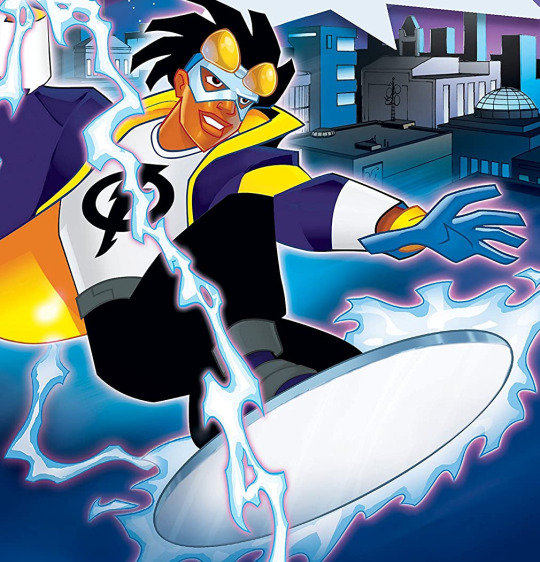
“You know what? 13 years ago, me and some friends sat in a restaurant all night and daydreamed about the kinds of stories we would tell if we had the chance. We wanted to expand the concept of superhero to include characters that kind of looked like us, who had some of the same background, experiences and dreams as we did. We wanted to create something fun that a new generation would respond to the same way we responded to our childhood heroes -and damn if we didn't succeed beyond my wildest dreams. Today, Static Shock is a household name with millions of fans of all ages (Is there stuff I'd do differently? Yeah, almost all of season four but why nitpick?) Static is the most successful thing I've ever helped create and I'm both proud and gratified that people have taken it into their hearts. “
Dwayne McDuffie, Co-Creator of Static and Writer for Static Shock
This review is dedicated to Dwayne McDuffie and Robert L. Washington III. Rest In Power Static Shock is awesome. I grew up with the show watching it both first run on the WB and second run on Cartoon Network and loved it as much as I did other large parts of my childhood courtsey of DC like Batman the Animated Series, Teen Titans and both Justice League Shows. What makes this unique among the DC Properties is that Static wasn’t really a big name when he got a show. He wasn’t even part of the DC Universe.
See as I had no idea for probably a good decade, Static actually came from Milestone Comics, a company ran by and focused on african americans. The goal was understandable: While black heroes existed at the time, and there were some fantastic ones like Storm, Jim Rhodes and Steel... these guys weren’t the center of their universes. The big faces of the big companies, Spider-Man, Wolverine, Hulk, Iron Man, Superman, Batman, Wonder Woman, The Flash.. were white. So milestone was a shakeup of that with the main teams and heroes all being black, from Icon, an alien who’d lived among man but rather than end up in kansas like say superman ended up imprinting on a slave woman centuries ago and has been with us since, who was encouraged by an energetic teenager named Rocket to put on a costume and do something with his powers and his community, Hardware, a tech genius who had his work stolen by a white asshole and wanted to fight back and BLood Syndicate, a group of gang members all caught in the “The Big Bang”, a huge fight between all of Dakota, the midwest city where the comics take place, that ended when the police released a bunch of experimental gas that gave them all super powers.
As most of you who have watched the show already know, this is where Static comes from. Static was the company making their own Spider-Man, i.e. a nerdy teenager who suddenly gets super powers, in this case Virgil Hawkins who at the prodding of a friend took a gun to The Big Bang to get revenge on a bully. .but ultimately couldn’t go through with it, decided it wasn’t him and got rid of the gun and ran.. and still ended up in it, becoming Static, a young hero dedicated to using his powers to fight other “Bang Babies”.. a term that dosen’t really sound that great and they really should’ve thought through. But Phrasing aside the character was great and I look forward to reading more and only haven’t because I have to buy the issues gradually, but DC is currently re-releasing the individual issues of Static, Icon, and Hardware weekly in anticipation of a reboot of Milestone Coming in May digitally on Comixology at only 2 bucks a pop, and rereleased the original print collections that were long out of print for 10 bucks each, though i’m getting static on it’s own since i’ts really not that much less expensive as it only collects four issues while Icon and Hardware both collect 8, so I can wait a bit there on Hardware and already own Icon: A Hero’s Welcome.. and really need to review it at some point.
While Milestone’s output was good, at least from the two books i’ve read, with Robert Washinton III, who sadly not only ahs also passed but was fucking homeless for a while in the 2000′s.. what the actual hell, writing Static alongside Dwayne McDuffie, whose later moved onto animation writing tons of Static episodes all of them classics including the school shooting episode, the first three rubberbandman episodes and both Anasazi episodes. Point is it had good writers and artists and even had a distrbution deal with DC, so they had a leg up on the glut of other comic book companies.. but happened to start at the start of the comic book crash, a huge downturn in sales in the 90′s as the speculator boom, i.e. a bunch of people assuming every number one would be worth golden and silver age money, forgetting a character has to BUILD INTREST and this stuff takes time, and whose attempts to sell fast flooded the market with comics no one wanted,, caused the roof to cave in and with a bunch of assholes pegging milestone as a “Company for black people” rather than you know, a company trying to add fucking diversity and represntation to the comics industry, and that simply wanted a unvierse that was centered around people of color instead of white guys. The company eventually had to shut down, and was left to lisencing. This is where the show comes in. Producers HAD been trying to make shows based on Milestone for a while, as far back as the mid-90s and the company was was all for it but the closest it got was an x-men style team series using various characters whose first draft was terrible and whose second draft by Alan Burnett, a producer on various DC Animated shows who’d go on to produce Static Shock, that McDuffie and others really liked but sadly did not get picked up. eventually though with presistance Static ended up getting a series and as I said McDuffie went on to write for it though he did not develop it. Some changes went into place naturally to make it work for an early 2000′s kids show and while i’ll probably miss so since again, only read one issue as we go. But due to Milestone coming back my intrest was peaking, hence finally reading the copy of Icon I had to buy from the library years ago due to keeping it overdue but am now EXTREMLEY glad I own as i’ts incredibly rare and really damn good, and wanting to read static, doing so lately since it’s finally on digtiial and again not too expensive. So join me as I give you a shock to the system and revisit this hell of a series to see if it holds up.. which just to cut that short it does and i’m only holding off binging MORE because I want the first two eps to be fresh enough in my head to review properly.. and also go over the various voice actors because that’s a thing with me now and charcter co-creator dwayne mcduffie because he’s awesome.
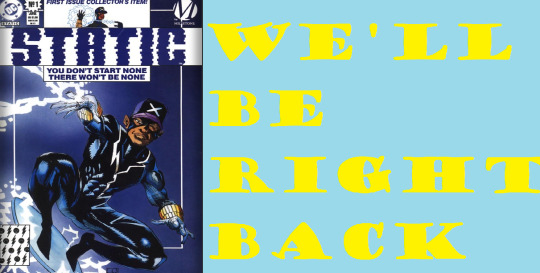
As I like to do when covering a series first episodes, let’s run down the voice cast.
First up is an UTTER LEGEND, and I use the term voice acting legend a lot, and mean it every time and have good reason to use it when I say it, and Phil LaMarr is a GOD in the buisness, having done a metric ton of voice acting roles, and being easily the most proflific black voice actor in animation. He’s also done some acting work, mostly in pulp fiction which I have not seen, but his true staying power and talent is in animation so here’s just the roles I feel are most notable or may not be very notable but i’m bringing up anyway because it’s my list.
His roles besides Virgil include Lester Payton the Texas Ranger who showed up for one very good episode of king of the hill to be badass and show up the hickish, stupid and very punchable local Sheriff, Gearld’s obnoxious older brother Jamie O on Hey Arnold, Hermes Conrad from futurama, Carver from the Weekenders (PUT IT ON PLUS DISNEY), Axel Foley for exactly one bit in Clerks the Animated Series, but anyone whose seen it will know exactly which one, Micheal on the Proud Family, Black Vulcan on Harvey Birdman (In His Pants), Hector Con Carne and Dracula on Grim Adventures of Billy and Mandy and Evil Con Carne, Jack on Samurai Jack something I didn’t know for decades (and I didn’t know about the carver thing till today though i’ts obvious in hindsight), John Motherfucking Stewart on Justice League and later Steel and Adult Static in the Unlimited seasons, Osmosis Jones on Ozzy and Drix, Bolbi Strogofski on Jimmy Neutron (And yes i’m just as shocked as you are.), Wilt on Foster’s Home for Imaginary Friends, Marcus on Life and Times of Juniper Lee, Bull Sharkowski on My Gym Partner is A Monkey and Also a Sociopath Please Help God My Life is a waking nightmare..... okay the rest of that title is implied but we all watched the same show, we all know in our hearts that was the title
Moving on, he was also, and yes there’s MORE: Maxie Zeus on The Batman, Philly Phil on Class of 3000, Both Robertsons AND Fancy Dan on the Spectacular Spider-Man, Jazz on Transformers Animated, Kit Fisto and Bail Organa on Star Wars the Clone Wars, Gambit and Bolivar Trask on Wolverine and the X-Men, Aquaman I, L-Ron and Green Beetle on Young Justice, J.A.R.V.I.S. and Wonder Man (Simon Williams) In Avengers: Earth’s Mightiest Heroes, Gabe and Carny on Kaijudo: Rise of the Duel Masters (Really miss that game and have been snapping up what cards I can get lately), Baxter Stockman in the 2012 Teenage Mutant Ninja Turtles (And there’s also an awesome photo of him with 2003 Baxter... the two best together in one place. I got chills), Dormammu (I’ve come to bargin) in various Marvel Shows, Noville in Mighty Magiswords, Zach’s dad Marcus in Milo Muprhy’s Law, Craig’s Douchey Brother Benard on Craig of the Creek, showing he’s clearly come full circle, And Mr. Scully on the Casagrndes. And given It took about two paragraphs to cover all of this, yeah, I MEANT legend.
Next we have Kevin Micheal Richardson as Virgil’s Dad Robert, and it’s the first time since I started introducing Voice Actors on a show that i’ve overlapped. I already covered him during the second episode of legend of the three caballeros, but for the short version he’s also very acomplished, very damn good and I somehow missed he played the old blind guy in hey arnold> Needless to say the dude is awesome.
Virgil’s Sister Sharon is played by Michele Morgan who was in the rap group BWP and did some smaller roles outside of this the one exception being Juicy on the PJ’s, which I have not watched much of but REALLY do not like, though i’ll at least give it credit for being a decently long lasted black claymation sitcom at at time when there were, and hoenstly still aren’t, many black animated shows.
Back to long casting sheets, next up is Jason Marsden, who is one of my faviorites as i’ve realized recently as Ritchie. As I also found out only recently he started on the Sitcom Step By Step and while that show is .. ehhhhhhhhh, he is great in it because he’s great in everything. He also apparently has his own internet variety show which I have to watch now. His roles include Max Goof, ironically given I was just talking about that role a few days ago, Haku in the english dub of Spirted Away, Micheal, the kid being yelled at by a bunch of 80′s cartoons characters not to take drugs in Cartoon All-Stars to the Rescue!, Nermal in the DTV Garfield movies and The Garfield Show, Tino on the Weekenders (SERIOUSLY DISNEY), Snapper Carr on Justice League, Rikochet on Mucha Lucha! for the last season (Why I do not knkow and while I love the guy he was not the right choice), Felix on Kim Possible, Chase Young on Xiaolin Showdown (WHich I did not realize was him and now I do easily his best role and I REALLY should’ve), Red Star and Billy Numerous on Teen Titans, Speedy on Batman Brave and the Bold, Impulse/Kid Flash II on Young Justice, and Fingers on Kaijudo. He hasn’t done as much lately which is a shame but hopefully i’tll pick up again.
Next up is Hotstreak, Virgil’s brutal bully turned unhinted pyromancer played by DANIEL COOKSY, another actor i’m happy to talk about and another faviorite I haven’t seen much of lately. Daniel was an actor from childhood, playing Budnick on Salute Your Shorts, but he quickly gained a long and storied catalogue of VA Work: His first big roll was as Montana Max on Tiny Toon Adventures and if there is a god he’ll be back for the reboot, Stoop Kid on Hey Arnold, the incomprable Jack Spicer on Xiaolin Showdown, far and away his best role and part of why Chronicles sucked so bad was he was he didn’t get to reprise the role, The titular Dave the Barbarian, Django of the Dead on El Tigre (Had no idea), Kicks utterly insufferable big Brother Brad on Kick Buttowski and apparently he’s back at it again after laying low for a bit as he’s voicing Snag in Long Gone Gultch.. which I already really needed to watch but hot damn, I missed him. Sign me up.
Frieda, Virgil’s crush and close friend who in the comics was his main confidante and love intrest but here is eventually pushed aside, is voiced by Danica Mckeller whose work didn’t seem all that familiar.. until I found out she was Ms. Martian on Young Justice. Hello, Megan. Very talented and she did get a major role in a dc show eventually so good for her. Can’t wait for season 4.
So with our major players out of the way, let’s talk about Dwayne. McDuffie is an AWESOME man and my respect has grown for him more and more with time. A writer and editor at Marvel, McDuffie has a decent resume doing smaller but awesome books, which I got most of for free last year when Marvel was giving out free digital collections due to the lock down, like Damage Control, a sitcom set in the marvel universe about the company that picks up after superhero battles and the logistics and antics that insue and Dethlok, about a pacfist trapped inside a cyborg zombie. He was as mentioned one of Milestone’s founders, and wrote Icon, Hardware and co-wrote the first few issues of Static. He’d go on to a pretty stacked career in animation, writing on this show and Justice League before becoming story editor and show runner for Unlimited , even making a return to comics as a result writing the Marvel miniseries beyond and an arc of Fantastic Four in which Black Panther and Storm filled in for Reed and Sue while the two of them worked on their marriage after Reed did.. pretty much everything he did in Civil War. He also became head writer and show runner for Ben 10: Alien Force and Ultimate Alien, revamping the franchise a bit, and Alien Force, at least the first two seasons are awesome and I feel people overreacted on the changes. Ultimate Alien is okay, but has it’s problems but the finale was awesome and left the man’s legacy on a high note.. as he sadly passed in 2011 due to heart complications. He is truly missed and produced some utterly amazing stuff whlie he was alive. So on that melacholy note let’s see what happens when his creation hits the tv screen shall we?
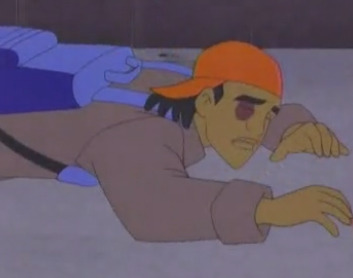
Shock to the System:
This episode is written by Christopher Simmons, who is apparently a huge art designer guy.. but i’m not sure that’s the same chirsptoher simmons. Much more notable is the writer of the episode after this Stan Berkowitz, who was showrunner for season 1 and has done a LOT of DCAU work and is suprising talent, having written a lot of awesome Justice League episodes including Secret Society and The Royal Flush One. Point is we’re in first class hands. Before the episode itself I want to talk about the intro and how it’s unique among DCAU shows. Like most Western Animation the intros for DCAU shows didn’t change much over the seasons with the most I can see is JLU changing up the footage to preview the current episode and later adding Hawkgirl to the intro after her return to the team. I THINK superman the animated series changed some of it’s footage too, but I can’t confrim it and may of just been imagining it. As i’ve talked about on my blog it’s normally a pet peeve of mine, mostly because shows you know, change after season 1, characters get added some one shot characters used for the intro never return, and after a while it can feel dated especially in more recent shows where the status quo is not at all set in stone and things change quite a bit. But sometimes it can be good enough that either the dated elements don’t matter or general enough that you don’t need to change it and i’ts just that good.. and given Batman the Animated Series has both in spades, you can see why i’ts probably my golden standard for intros and after superman the animated series DC mostly followed suit. But being part of the teen superhero boom of the 2000′s Static is unique in that it splits the diffrence: It’s intro gets the character across perfectly like a good intro should starting with Virgil getting out of bed and running a comb across his head before showing off to his sister to bug her and literally running into his dad who hand shim his bag and smiles, silently showing off his family. He then runs to school and runs into some trouble.. and said trouble changes for each intro, with Rubberband Man for season 1, Kanga (Whose name I only know because I happened to run across it) for season 2 and your guess is as good as mine for seasons 3 and 4, though Hotstreak is a constant. They still save some money for seasons 1 and 2 by recycling some animation.. but that’s alright with mea s it was good animation, and the improtant thing is cycling out old villians for new ones, while Season 3 is the only out and out redo to show off Richie taking on the Gear identity, adding about 10 seconds of intro to let him show off. Seriously it’s an utterly great intro and like the other DCAU intros outside of superman, stuck in my brain.
The other change that’s ENTIRELY diffrent from the rest of htem is that the music changes each time. The first two have the same formula just with a difrent vocalist and backing track: a superhero theme but with some hip hop beat boxing over it. The first intro is fine enough, not specattcular but stilll god. The second song.. is eh. Not really great and feels like a marked downgrade from season 1 and just dosen’t blend an ocrehstiral superhero theme with the beatbox elements NEARLY as well. The third song though is my faviorite.. even if I HATED Little Romeo as a kid because I really did not like his nick show, it’s more a straight up rap song, but it has a faster beat that fits the intro better, and Romeo’s bragging fits Virgil’s character and penchant for Spidey quips perfectly. I also find it ironic that the theme that blends in with the dcau the most, the first season’s, is the one from BEFORE they decided to put it in the same universe. Still this season’s intro slaps, I just like the LIttle Romeo one a bit more. The opening scene is picture perfect. Some masked crooks looting a warehouse are loading some stolen TV’s into a van when suddenly the lights come on one by one above one of the crooks before his tv switches to various channels before going haywire. Cue our heroes’ entrance. Let’s tak ea good look at him
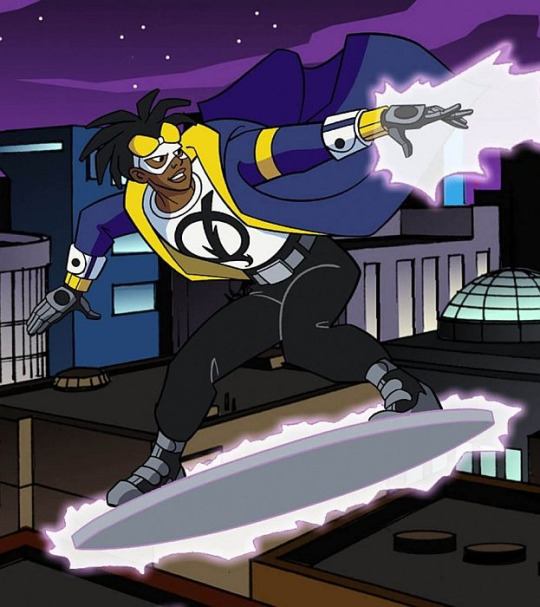
Static’s Costume is awesome. While I prefer the season 3 redesign, and clearly DC agrees as the redeisgn was used for both pre and post new-52 when they used him, and while he’s getting a fresh design for the reboot, said design takes a lot of cures from said outfit. As for how the outfit differs from the comics itself this is the design he had in the comics
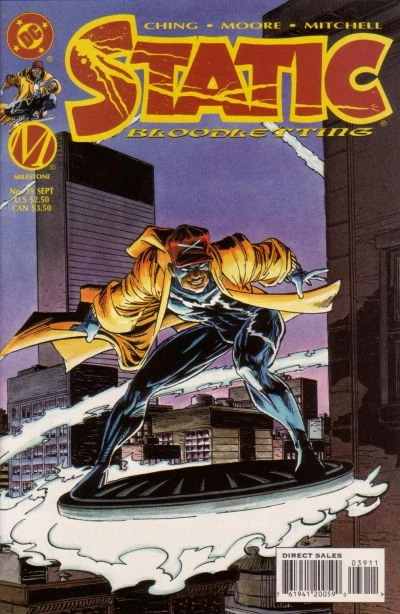
It didn’t change much from the first issue, with the exception of his now iconic big puffy jacket which was added pretty early into the character’s history but I was unaware of that and just assumed he had the bodysuit the whole time. The more you know. But as you can see outside of the cool puffy jacket over a costume the two couldn’t be more diffrent. While the Dakotaverse outfit is more a standard superhero outfit, with some regular clothes touches on top the first cartoon outfit comes off more realistic, looking fantastic, but still coming off as something two teenagers could realistically have thrown together with what clothes they could buy, while still looking awesomely superheroy. IN short it’s perfect and only topped by the season 3 onward look...
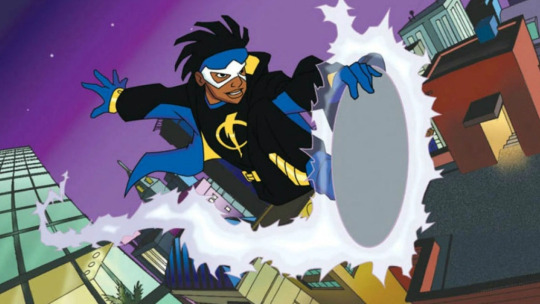
But the slicker look, with an even cooler jakcet and the new colors all fitting the lighting ascetic better, but fits: not only has Virgil come along farther since he started, but with Richie now having a genius brain as Gear, he can provide a far slicker, far more professional superhero outfit on the budget the two have. This show is just great at costume design.
So getting back to the episode at hand, Static puts up a huge sign in elecrticy saying “Bad guys here”, PFFFT, and then hides away and narrates that a few days ago he’d be the last person anyone would’ve expected to be a hero. Cue Flashback.
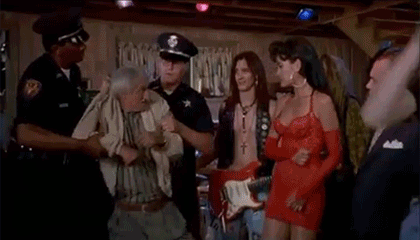
We meet Virgil Hawkins on an average day: rapping into his razor, getting into a petty argument with his older sister Sharon, as a younger brother myself I relate to this, and talking to his dad who tries to get them to cut that out. We find out his mom has passed via his sister making really terrible eggs and saying that’s how mom made them. Exposition! Though we do get a great bit through this as when his sister gets distracted by her boyfriend calling, he uses the opportunity of her leaving the room to dump the eggs.. after having earlier jokingly prayed to his mom for a way out of breakfast. “Thanks for looking out for me mom” That’s both very sweet and very hilarious.
This is a change from the comics it turns out as I was utterly flored to find Virgil’s mom alive and well when reading the first issue of Static. Turns out this was a change made during development and one Dwane McDuffie admitted in the interview I got the tribute quote from to not liking as he had a good reason for having Virgil have a nuclear family, as most black families in media at the time were just one single parent and a kid or two with the other having either left or died. He wasn’t too bothered by it as while he preferred what he came up with in the first place, the show DID get some really good stories out of her being gone and didn’t just have her be absent because shut up. Virgil is still working over her death and the way HOW she died ends up playing an important role in this episode and gives Virgil a dislike of guns, as she died to gang violence. So the change wasn’t for stupid or racist reasons, but likely both to keep the character count down while giving them something to work with for storylines. Or it could’ve been for stupid reasons and the writers simpily made lemonade out of that very dumb lemon, either way it ended up working. Virgil also plans to ask his friend Frieda out. Frieda was a bigger deal in the comics, being Virgil’s friend and confidante as well as his ocasional love intrest, but here while she was inteded to at least be his love intrest here, that sorta fizzled out. As for the best friend role we meet her replacement in Richie, which McDuffie conceded was the kind of change a studio would make swapping out a female character for a male one. That being said the crew made the best of it and Richie is awesome, a bit of an overcompensating dipstick at times, but a good sounding board and pal for virgil and funny as hell too. He was also gay, something only revealed post series by McDuffie.. but unlike say Dumbledore, it’s a bit easier to swallow here: The early 2000′s were an even worse time for gay characters in tv let alone cartoons, and if they couldn’t kiss or have sex scenes on regular tv, there was no way we were getting any representation in a children’s show. So it was largely just hinted at by Richie overcompensating in how “into girls” he was and i’m once again fine with this being word of god as it was literally the best they could do and his counterpart in the comics was also gay, if not as relevant. Ritch encourages Virgil to work on his opening to ask her out as it’s awkward as heck, hits a bit close to home.. but I do appricate the show just .. having him try and ask her out from the first episode. They likely would’ve drug thigns out a bit granted had they used Frieda more, i’m not blind to the convetions of the time. .but as someone who got the very wrong idea from tv that just waiting around meant a girl would like you eventually, when no you need to actually try even if rejection happens, I honestly wish we had more of this in media than the other garbage morals at the time.
So he prepares to , not helped by her mentioning guy after guy is asking her out.... but before he can F-Stop, the future hotstreak, shows up. F-STOP
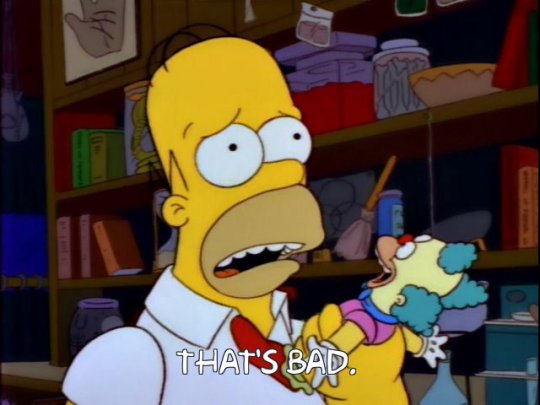
That being said...... it’s not as bad as the original gangster name for the comic’s version, Biz Money B. Yes BIZ MONEY B
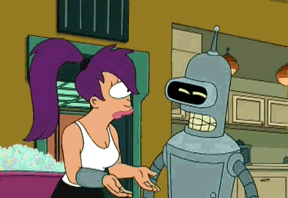
So yeah while F-Stop is no more intimidating, it at least means I can stop laughing. Francis, because I can’t type F-Stop without laughing and this review is already behind, shoves Virgil out of the way and agressively hits on Frieda, even saying “you smell good”, the international sign your a douchebag and also to call the police. Virgil steps up to the guy and gets PAINFULLY slammed into the lockers, something I give the animation team a lot of credit for, as you can FEEL how fucking painful that was. Virgil is saved by Wade, another local gangbanger who in the comics was a close friend of Virgils but here saves him seemingly just because.. seemingly.
On the way home though Virg’s problems don’t end as naturally, the giant sized asshole with nothing better to do has his goons corner virgil before VIOLENTLY beating him.. off screen but the noises, and the clear brusies including a black eye, on virgil afterwords.. just holy damn i’m suprsied they got away with this but it shows just how horrifing it was and that this is a step above regular bullying, which make no mistake is absoluttley terrible and the series would later do an episode on it and school shootings, into straight up gang violence. Wade shows up again and gets the bastards to flee.. but also makes it clear he can’t keep doing this.. and forces Virgil to meet him at his base under the bridge. And it’s a tense sequence, with Virgil KNOWING this is a bad idea but having no real choice and Wade making it abundantly clear that he wants Virgil to join his crew, and makes a chilling point: while Virgils dad RIGHTFULLY dosen’t want his son to join a gang as Virgil points out.. he can’t be there for him all the time and eventually one of those times, Francis will be around. And he may not surivive that. Virgil nods noncomittaly. At home it gets even more grim as he dosen’t open up to his family, understandably as his dad would jsut say to call the police and well.. we’ve seen how the police treat black people. At best they’d just try and use Virgil as an informant and that likely wouldn’t end fucking well for Virgil. Ritchie points out he can’t join a gang, virgil’s mom died that way.. see told you it’d be important to the plot.. but I like how the story dosen’t offer an easy answer.. well okay he gets electric powers soon enough but without the fantastic element this is just an innocent kid caught between either joining the very thing his mom hated or hoping a system not built to protect him will keep him alive. It’s utterly saddening and chilling and holy shit is it amazing a cartoon in the early 2000′s was able to get away with.. ANY OF THIS, and they handle it great, paired down a bit from the comics but even then it’s still incredibly balsy they got THIS much in.
Naturally Wade calls in his favor and our hero is forced to come running.. and soon finds out Wade’s brought him in for a massive gang war. Welcome to the big bang, baby. He hands Virgil a gun as things get started and Virgil.. drops the thing and tries to escape, in a harrowing sequence.. and runs into Francis because god apparently REALLY hates this kid today. As if to prove that the police show up and while that prevents a beating, they demand they disassemble. then release untested gas on them because of course they do.
As a result the big bang truly begins, with the various gang members getting mutated.. and naturally so does virgil. Though he wakes up the next day seemingly fine. How’d he get home? Does his dad know where he was?
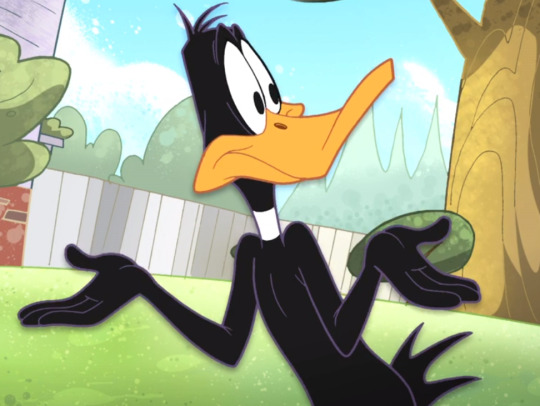
I don’t know and we’re not getting any answers, but Virgil soon finds weird stuff happening like his clock shorting out, change being attracted to him and his razor going wild. It’s only once he get sback to his room he gets an inkling of what’s going on and calls Ritchie to meet him at the Junk yard.. though it is a bit of a dick move as he dosen’t you know, tell him anything about Wade or Francis right away. He does at the yard though.. and that he has powers, having finally figured out how to use them to a point. And the series does provide a decent justification later as to why he’d get this so quickly: Virgil is a smart kid, gets great grades at school and apparnetly there’s even an episode later where he gets a scholarship to a fancy genius school. So him getting how elctromagntisim works or being a quick study on it makes perfect sense.
Richie suggest the obvious.. to become a superhero. And the thought.. hadn’t occured to Virgil. It’s honestly a nice twist on the old trope. That he hadn’t thought of it, not because he’s selfish or any of that or needs to learn a hard lesson, those have been done.. simply because the rush of getting his powers, and implicitly of having a way out of his current predciament, a way to keep Francis off his back and keep Wade from pulling him in further. His own path. But once i’ts brought up.. he jumps on it. Part of it is being a nerd like you or I, of course he wants to.. and being a good intetioned one, he knows this is the right thing to do. It’s waht makes a superhero a hero: Anyone can get powers in a universe like this, esepcailly the dcau, but it takes true courage and heart to use them selflessly and knowing you’ll be in danger. It’s why I love surperheroes: they often didn’t ask for this but they do it anyway because somebody’s gotta. We also get an intresting wrinkle is superman is, at least I think in this episode I could’ve missed it or misremembered things, mentioned as a fictional character. That’s because originally like the comics this wasn’t part of the DCAU.. but eventually the crew decided it shared staff from it, shared a network, both first run and on reruns, why not just make it part of the DCAU proper. I fully support this decisionf: While i’m midly annoyed unlimited never really used anything from static shock outside of Static himself in the time travel episode, despite you know Static and Gear having BEEN to the tower and not being much younger than Kara and defintely older than Courtney, I chalk it up to weird rights issues or something like that. But having Batman, Batman Beyond, Superman, Green Lantern and the Justice League itself all guest star was a good idea, and expanded both static’s universe and gave the DCAU something differnt as most heroes in it were older and more experinced in contrast to the up and coming virgil. Again really would’ve been nice if he and gear could’ve been a part of the expanded league but production might of just been too far ahead or, given he had his own series, they might just have wanted to stick to toher characters. Also begs the question why Icon or Hardware wasn’t adapted for the expanded League but hey, questions for later and the tricky logisitics of the milestone rights might’ve been the issue. I don’t know I wasn’t in the room.
So we get a costume montage, including Black Vulcan from Superfriends, who again ironically would be voiced by Lamarr not too long after this, though weirdly they DON’T use his outfit from the comics for this montage. I mean why not? It fits the gag and would’ve been a good second to last choice.But what could’ve been aside we get our winner and cut back to present day...

Thanks boys. Static finds out one of the things in the warehouse is a shipment of computers for the school and can’t help but show off, showing up to the school, where Frieda and Richie are setting up for the dance, and dropping off the computers, and even saying his catchphrase for the first time “I’ll put a shock to your system” (Which Richie chimes in with awesome line and I agree, great catcphrase), before helping set up and flirting with frieda.
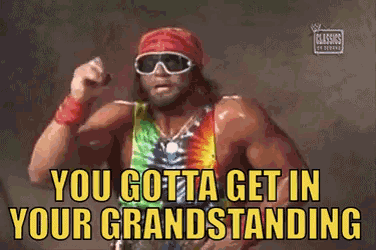
Though as Richtie says he’s a natural. He’s not wrong as he can work a crowd. .but back it up too as his first run out had him easily taking out the crooks, and as many teen superheros and fans of heroes of hte type, myself included will tell you, getting it right in one is not easy. Not even Miles MOrales was immune. All Static needs now is a villian.
And the end of the episode provides one as we see, in horrifc and once again damn suprising detail most of hte new metas aren’t doing so good and are melting and other stuff and we catch up with Francis whose burning up.. and naturally given that hair, though given he named himself F-Stop it’s the least of his problems, he’s got fire powers and escapes to “Have me some fun”
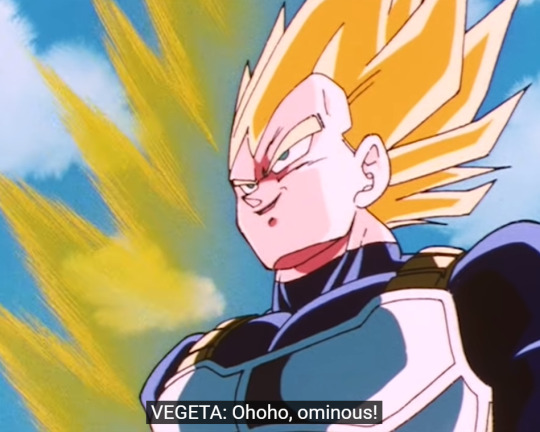
So with that we end episode 1. And it’s excellent, a great way to introduce the hero and while the warehouse opening is a bit superflous, it is a decent addition, showing our heroes first outing in costume and giving us a bit of an action scene to get us through the very heavy rest of the episode. But the rest of the episode is no less grippping, telling the tale of a teen caught in an unwinnable scenario who suddenly finds a way out. And speaking of which waht of Wade? Will we see him again? Is he perhaps Ebon, the series big bad as I thought when I was a kid? What comes of the man who directly caused static’s origin?
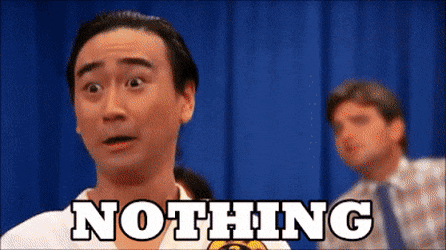
Yeahhh that’s the one mistep I think the pilot makes. Frieda is understandable as that was likely a simple change in creative direction. This though? Why build this guy up if your not going to bring him back. I mean where he went was probably the grave, as he probably did due to his mutation, but it’s still VERY weird to spend a whole episode focusing on this guy, building him up as a big personal threat to our hero.. and NOT have him become the series big bad. And maybe he WAS supposed to be ebon and they just changed their mind. I don’t know but it bothers me it bothers me a lot. Otherwise though flawless. ONe more to go.
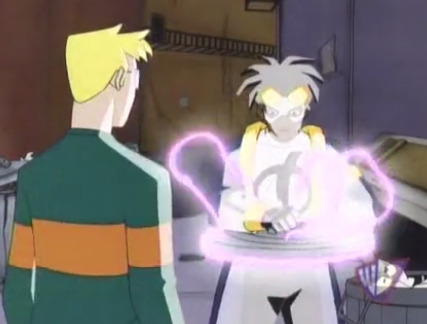
Aftershock: We open outside an electronics store, as our heroes watch the news reacap what happened in the first episode, with the media dubbing it the Big Bang and revealing their could be hundreds of “Metahumans”, as Virgil dubs after deciding the media’s term “Mutant” dosen’t fit, a nice wink to the fact that that’s the term used in dc comics and I believe milestone but could be wrong there. Me I like the term, has a nice ring to it.
At the store while Richie mulls over waht this means Static finds out he’s a human CD player.... this was before mp3 players and streaming on your phone made them horribly obsolete mind you and if you don’t know what one is congradualtions you live in some sort of bubble and you made me feel really old junior.
Frieda happens to be there and Virgil quips “What’s the matter they run out of britney cds”. Dude she’s not bad. Also be careful what you wish for man. Nickeback returned the year after this. You have not truly suffered through bad music yet my young friend. They spot a kid looking feverish, and he soon turns into a purple werewolf, as you do. It’s a bang baby.. those are richie’s exact word and you may not want to start a panic there bud. Just saying your best friend is one. THeir not all like this. Our heroes book it only to run into Francis who naturally refuses to let them leave and only doesn’t try to beat up Virgil because Virgil points otu the werewolf and nonplussed, he goes to fight it, scarring it off by revealing his own powers. He’s now dubbed himself Hotstreak which points for getting an actually good name kid. No points for what happens next as unsuprisingly getting powers did NOT mak ehim a better person and he attacks Virgil who blocks with a garbage can lid and thankfully is blasted into an ally. Richie tries to guard frieda for damn obvious reasons but gets hsi shirt burnt up because shut up Thankfully Static shows up, and we get our firsdt full on superhuman fight as both fight each other with aplomb, and it’s a damn good fight.. and one that goes pear shaped for Virg as he’s caught off guard when he finds out Hotstreak can use his powers to fly, and tackles him and his previous trauma causes him to freeze up. Thankfully , as Frieda put in a call earlier, the fire department arrive and HOt streak has to retreat, though Virgil is bummed that he “Choked”. And I love this as it not only shows Virgil’s inepxerince, as this is his first time fighting a bad guy but that just because he HAS power now dosen’t mean trauma and his previous fear of Hotstreak goes away or you won’t freeze up from time to time. It dosen’t make him weak or anything like some assholes would call it .. it makes him human. Humans make mistakes, and it makes him all the more relatable that he’s not pefect and that he did freeze up as I know I certainly would at last once in the circumstances.
Things don’t get better at dinner as Sharon and Pops argue over the bang babies with Pops calling them a meance and Sharon pointing out Static exists so they can’t all be bad. See assuming a group of superhumans are bad because a handful of them ar edick sis why the x-men had to get their own island nation. You can only save an ungreatful populous so many times before you say “fuck it i’m getting my own island, pay me for life saving drugs, save your damn selves and stop doing genocides on us. Kay thanks”. But he does bring up a valid point that rattles his son: We don’t know anything about the Bang Babies or their biological structures and it’s likely they might further mutate into monsters, Static included.
Virgil, understandably, wants to check this and thus he and richie compare blood samples in science, to no real conclusion. She he checks out with his doctor who assumes he’s sexually active in a great getting crap past the radar bit and a bit of realisim, but he agrees to the test though if something came up he would have to tell Virgil’s dsad and is up front about this. Nice dose of realisim.
That night City Council has a meeting and the Mayor TRIES to deflect Papa Hawkins questions about the bang babies which again, while being a judgmental ass as not every person hit was a gang member (Virgil, and as we discover later some others), and not every gang member is there by choice, some by circumstnace some, like virgil almost was, because they HAD no other option. Again years of reading x-men may of just made me a bit touchy on assholes admitely assuming superpower people bad. But it’s clear the public is upset and while she says an investigation is underway... Virgil and Richie are not only not convinced, but figure she’s actively covering it up. And unlike everyone else there who probably suspects the same, they can do something about it and tail her. It’s during this, and cleverly as I didn’t realie till writing this using similar skills to his human cd player act, Virgil listens in and discovers whose behind it: Edwin Alva, whose apparently richer than bill gates and a beloved phinarophist Alva, as it turns out, was actually the arch enemy of Hardware in the comics, taking advantage of the guy in his civiliian idtentiy and thus casuing him to launch a war on the asshole. He does transition into this series well though, being the one behind the gas that caused it and with the mayor agreeing to back off, planning to simply dump the info about the big bang on a disc then destroy everything for now till the heat dies down. Yup sounds like a corprate douchebag.
Static tails him, finds the lab and infiltrates it, stealing the disc.. but getting caught by Alva’s goon, and trapped in a glass prison, forced to use ALL his power to escape and barely getting out alive, but not before bouncing off alva’s car. Still he now has the proof.. and meanwhile Hotstreak, who I was wrong did get captured, is forced to take pill sbut spits them out once the orderly is gone. Dude.. WHY DIDN’T YOU WATCH HIM. Make sure he swallows that shit especially since, as he has no powers right now and can’t harm you.
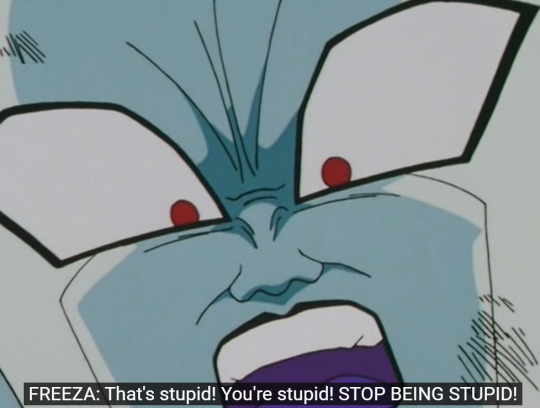
Hotstreak escapes off screen and our heroes discuss the disc before he shows up, and we get a REALLY fucking amazing scene: Virgil ducks into an Alleway and ritchie is worried.. and Virgil disarms him with just one word responses Ritchie: Virg you can’t take him. Virgil: Gotta. Ritchie: Well at least wait for the fire department Virgil: Can’t. It’s simpile but it gets the point across: This is his fight, he can’t wait for help, and people need him. And this is what makes a true hero: It’s easy to be a hero when everythings going well.. but it’s the true ones who stick it out against the odds and fight anyway. And he’s going to. So we get one hell of a fight, though naturally Hotstreak burns up the disc. And I do like this as it dosen’t feel contrived.. yes Static could’ve left it with ritchie.. but he wasn’t thinking in the moment and dind’t really have time to think abotu the disc, only that people were being hurt and he was all they had between them and Hotstreak. It was no choice at all. Still that pisses Virgil off that the last night’s work is now worthless, and he fully charges up and curbstomps francis who retreats into a clearing. Hostreak brags when static follows, as even he’s figured out Static needs to be around metal, as he’s usually on his disc or the street, and in the park there suppodsidly isn’t any. But he’s not THAT smart as Virgil points out two things: one, he hoped to do this on PURPOSE so they wouldn’t be around people and no on e would get hurt and 2).. this is a city, there’s metal everywhere.. and he awesomely and cleverly proves it by unlodging a sewage pipe with his powers and dousing his foe, winning and proving his stuff. I love this solution, it’s a clever spider-man type way to disarm him, using smarts and the einvroment instead of just brute forcing it. Though the sewage part wasn’t intetional our hero still won and gets praise from the people dumb enough to follow the fight.
However at home Virgil points out it was Pyrrhic Victory and shows off his smarts by telling the tale behind it, which I didn’t know,because tv tropes didn’t exist yet: king pyrhus fought the romans and WON.. but had so little armies left that he still lost overall. That’s what this feels like to Virgil: he beat hotstreak but any chance at a cure for Bang Babies and Alva going to jail for causing them is gone. His mood does get a boost though as the doctor calls and reveals he’s fine, he just has a bit too much elctrolytes and just needs to lay off teh salt. He celebrates, we get a quick gag and the episode ends
Aftershock is another stellar episoe, giving us Virgil’s first super foe and a personal one at that, while showing some growth. As richie tells him he’s not virgil anymore he’s static and he can’t let his past get to him.. and he does’nt going from cowering in fear to easily beating his foe with simple logic. It’s a good followup that answers questions you may have from the first ep, like what does this do to virgil’s body, who supplied the gas, and why has no one done anything about this, and sets up another villian for Static in Alva. Great stuff. I highly recommend these episodes and the show as a whole: it’s fast paced, grounded and enjoyable, having just enough levity to not be too dour but just enough tension and stakes to be intresting. A throughly fantastic superhero show and one that i’d certainly love to revisit on this blog If you have an episode of static or the dcau in general you’d want me to cover, my comissions are open and details are on a tab on my blog or can be gotten simply by asking me via ask or dm. Tommorow we’re going deeper underground, there’s too much damage in this town as the Lena Retrospective continues. So expect gay ducks, straight ducks and some terrfirmains. See you next rainbow.
#static shock#static#virgil hawkins#richie foley#robert hawkins#sharon hawkins#hotstreak#milestone comics#dc comics#dc animated universe#dcau#dwayne mcduffie#robert l washington IIII#kids wb#hbo max#2000s#animation#black lives matter#black history month
95 notes
·
View notes
Text
Best Female Spy Movies & TV Shows to Watch After Black Widow
https://ift.tt/eA8V8J
Black Widow is out, bringing the women-led spy genre to the Marvel Cinematic Universe. The film follows Natasha Romanov in the time between Captain America: Civil War and Avengers: Infinity War as she works to bring down the Red Room, aka the Soviet-affiliated program that took her as a baby and brainwashed her into becoming an assassin. While the women-centric spy drama may be new for the MCU, it’s has been one of the most prolific and entertaining action sub-genres over the past few decades. If you’ve watched Black Widow and you’re looking for more taut and emotional spy thrillers to check out, we have some TV and film suggestions for you…
Hanna
Many have seen the 2011 action feature directed by Joe Wright and starring Saoirse Ronan as a girl assassin raised in the wilderness by her spy father Eric Bana, but the TV series based on the film is even better. Currently moving towards its third season, the Amazon Prime series has so much more room to delve into the nuances of the film’s premise, especially in its second season, which moves completely past the events of the movie. While the first season leans into the coming-of-age themes inherent in Hanna venturing out into the world for the very first time, the second season chooses to delve further into the spy drama of it all, expanding the series’ focus to center some of the other teen super soldiers born into the same program Hanna was rescued from as a baby. If you would have liked to learn more about the other Widows Natasha and Yelena are working to save in Black Widow, then Hanna is the show for you.
Atomic Blonde
Stylish and featuring some of the best fight scenes this side of John Wick (the film’s director David Leitch, also worked on John Wick), Atomic Blonde stars the incomparable Charlize Theron as a spy tasked with finding a lost of double agents that is being smuggled into the West on the eve of the Berlin Wall’s collapse. Like Black Widow, Atomic Blonde only has so much narrative time to delve into the complexities of this set up and setting and, maybe sensing it won’t be able to do them justice, instead leans into the aesthetic and action of this world. It works, thanks in no small part to performers like Theron, James McAvoy, and Sofia Boutella, who bring to life the stress, violence, and desperation of this intersection of place and time far better than its script.
Queen Sono
American and British spy dramas often have white westerners traveling to other, poorer nations for missions, depicting a real-life colonial power structure while rarely interrogating it. Queen Sono, billed as Netflix‘s first African original series (it is a South African series, specifically), is a spy drama that centers Black characters and community in fun and powerful ways, bringing the familiar tropes of the genre to what will probably be a new setting for most American viewers. Queen Sono follows South African spy Queen (Pearl Thusi) as she works to balance her dangerous and clandestine missions with her personal life. Funny, emotional, and action-packed, Queen Sono is a must-see for any spy drama lover looking for something new—and it’s a damn shame Netflix won’t be moving forward with a second season.
Alias
To me, Alias will always be the original. The female-led spy drama was on network television when I was a teenager, and its combination (especially in the first season and a half) of fierce fight sequences, tense spycraft, and character-driven drama made it my favorite show. Like Black Widow, Alias is grounded in family drama, most especially the father-daughter relationship between Sydney Bristow (Jennifer Garner) and spy dad Jack Bristow (Victor Garber), but later bringing in other familial dynamics as well. The series starts as your classic double agent story, as Sydney decides to take down the agency she works for after they have her fiance killed, but, in classic J.J. Abrams style, the plot really spirals out from there—for better and worse. Airing for five season and more than 105 episodes, if you’re looking for more family-driven spy drama, Alias is the show for you.
cnx.cmd.push(function() { cnx({ playerId: "106e33c0-3911-473c-b599-b1426db57530", }).render("0270c398a82f44f49c23c16122516796"); });
Deutschland 86
All three “seasons” of this excellent German-language Cold War spy series that follows an East German boy forced to become a spy in West Germany are worth watching, but the second installment, set in 1986, gives us viewers many more lady spy characters to be impressed by compared to the original Deutschland 83 story. Main character Jonas remains the protagonist of this tale, but his Aunt Lenora, probably the best spy in the entire show, takes an even bigger role in Deutschland 1986 and the subsequent Deutschland 89, as does her lover/partner Rose, a South African operative working for the African National Congress and played by the MCU’s Florence Kasumba. Throw in Jonas’ baby mama Annett, back in East Germany working as a junior intelligence agent, and the mysterious Brigitte, and you have a second season teeming with complex and cutthroat women spies.
Nikita
This highly underrated spy series ran for four action-packed seasons on The CW before totally sticking its landing in 2013. Technically an adaptation of the 1997 La Femme Nikita TV series, which was in turn an adaptation of Luc Besson’s 1990 action film of the same name, Nikita quickly surpassed both originals to become one of the best female-led spy stories of all time. Starring Maggie Q as the titular Nikita, the series began after the former spy has vowed to take down the secret agency that trained her, known as the Division. Our story begins when Nikita plants her protege, Alex, within Division, with a plan to work together to take the agency down. Of course, going undercover comes with its own emotional and ethical complications, and Alex may not know all that there is to know about her mentor Nikita, and Nikita’s role in Alex’s tragic past. With a stellar supporting cast that includes Melinda Clarke and Xander Berkeley, Nikita was far better than it needed to be and, if your a fan of the action spy genre, is definitely worth watching.
Killing Eve
Maybe it was the Russian accent, but Yelena has mad Villanelle vibes in Black Widow, and I mean that in the least psychopathic way possible. Unless you live under a rock, you’re probably aware of this BBC America series starring Sandra Oh as a bored MI-5 agent and Jodie Comer as the spy-assassin she becomes obsessed with catching, but if you haven’t yet checked it out and are looking for another female-driven spy story with plenty of banter, then Killing Eve is the show for you. The second season gets a little rocky, but with a riveting season three and the announcement that season four will be the show’s last, now is the time to jump on the Killing Eve bandwagon.
Little Drummer Girl
In terms of tone or style, Little Drummer Girl shares little with Black Widow—it’s much more geopolitical thriller than superhero action—but I’m including the British spy series on the list because it does share a star with Black Widow. Yelena’s Florence Pugh plays an aspiring actress named Charlie who is recruited by Mossad to infiltrate a Palestinian group planning an attack in Europe. Based on a novel of the same name by acclaimed spy author John le Carré, the six-episode series is directed by Korean filmmaker Park Chan-wook and co-stars Michael Shannon and Alexander Skarsgård, and the talent is not wasted. The miniseries delves much more into the ethics of spycraft than Black Widow is able or comfortable doing, asking difficult questions about how violence and manipulation are used and justified across national lines. If you’re looking for a spy drama that isn’t afraid to ask the tough questions, then Little Drummer Girl is for you.
Gunpowder Milkshake
OK, this one is more of an assassin drama than a spy drama, but the cast is too good not to include it on the list. Starring Doctor Who‘s Karen Gillan and Game of Thrones‘ Lena Headey as a pair of daughter/mother assassins, Gunpowder Milkshake is another action thriller that is all in with the familial dynamics. Past the two stars, Gunpowder Milkshake also features the iconic Michelle Yeoh, Angela Bassett, and Carla Gugino, rounding out the cast of action women. The film doesn’t drop on Netflix (in the U.S.) and theaters (elsewhere) until Friday, but you’ll be ready.
The post Best Female Spy Movies & TV Shows to Watch After Black Widow appeared first on Den of Geek.
from Den of Geek https://ift.tt/3eoBohF
11 notes
·
View notes
Text
White Entitlement and Doctor Who: AKA Why I Like The Timeless Child
TW: Discussion of real life racially motivated medical abuse, general racism. This may hurt sensitive white feelings.
At the end of series 12 of the British sci-fi show Doctor Who, Jodie Whittaker's Doctor discovers that she has a secret past she was unaware of. Erased from her mind by her own people, the Gallifreyans. In a series of flashbacks we see a young Doctor. She's a little Black girl, standing alone below a portal that presumably leads to whatever Universe she called home. She's lost and alone. We don't know if she was abandoned by her family or simply separated from them by an unfortunate accident. She's then found by Tecteun, an adult white woman who was one of the earliest inhabitants of Gallifrey, the very planet the Doctor believed to be their own. She adopts the child Doctor and becomes a sort of mother to her. This seems, at first, like the act of a selfless person. She's taking in a child she doesn't know, who would most likely die without her. A happy ending.
But that's not where the story ends. As the Doctor plays outside with another child on Gallifrey she falls from a cliff. Instead of this being fatal she regenerates, just as the Doctor and other Timelords have been known to do throughout the history of the show. Her body is remade into a young Asian boy. Tecteun sees this and her first thought is to solve this mystery. We see The Doctor, now a little boy, sitting in a chair in a lab as his mother does tests on him. We're shown a montage of various regenerations of the Doctor, many of them children of color. It wasn't until after the episode ended that I thought back and wondered "how did this child end up in so many lethal situations while Tecteun remains alive and well?" which suggests that this might not be a series of accidents but purposeful results of the experiments being done on the Doctor by their own mother figure. What seemed to be a miracle before has turned into a nightmare that evoked in me the memories of similar events in real world history.
Henrietta Lacks was an African American woman who, in the 1950s, was being treated for her cervical cancer. Some of the cells of her tumor were biopsied by Johns Hopkins Hospital in Baltimore. These cells went on to create the HeLa cell line, the oldest and most impactful immortalized cell line in history. Without getting into too much medical jargon, the effect this had on the medical field was immeasurable. The problem? Lacks never gave her consent to have these cells taken, nor was she even informed that it happened. She was also never compensated for it despite the cells being used shortly after to craft the Polio Vaccine. Henrietta died in 1951, never knowing about these cells or what they did for world medicine. Her family wasn't even made aware until 25 years later. Henrietta's story is not unique. Countless black and brown people in history and in the present have been subject to experiments by medical science. Most of them without consent and without compensation.
In 1932 the United States Public Health Service conducted a medical study called the Tuskegee Study. They told 600 African American men in poverty that they would be receiving free health care from the federal government. 399 of these men had latent syphilis. They were told this study would last 6 months. In reality it was 40 years. These men believed they would be cared for by medical professionals. Instead they were left uniformed of the disease they had (they were merely told they had "bad blood"). None of them were treated with penicillin, despite it becoming the common treatment for syphilis by 1947. By the time the study ended in 1972, 128 men had died of syphilis or related complications, 40 of their wives had been infected with the illness, and 19 babies were born with congenital syphilis.
These stories were at the front of my mind during the course of this episode. After finally unlocking the secret to the Doctor's regeneration, Tecteun uses it as the foundation for all of Gallifreyan society, giving them all the power to regenerate. The ability to evade death. This power is what leads to Gallifrey being the most powerful and formidable race in the Universe. And what becomes of the Doctor? Their memory is erased. The Doctor's very DNA is used to build a dominant society, without their consent, without their knowledge, and without gaining anything in return. The Doctor becomes who we know them as; an outcast and a misfit. Someone who doesn't fit in with everyone else they know and doesn't know why. Everything about this story connected with me. It connected with my family, with my ancestors, and with the knowledge I have of what other people of color have gone through.
It wasn't surprising to me that some others wouldn't enjoy this plot change. After all, a large subset of the fan base already dropped the show simply because Jodie Whittaker, a white woman, was cast as the 13th Doctor. They thought it was too "PC" and "pandering" even then. I had already decided to pay those people no mind. What was surprising was that many of my supposedly "woke" friends also hated this finale. I saw countless tumblr posts, tweets, and messages declaring that the Doctor was officially "not relatable" anymore. They felt personally hurt that the Doctor was no longer what they saw as a normal person. They called it a "chosen one" story or even a "Mary Sue" (a character with so many things that are special about them that real people can no longer relate their experience to them). This entire concept was frustrating to me. Here I was, feeling connected to this character as a person of color for the first time in its entire 50 year run and other people were treating this as universally and inherently bad. They were calling the Doctor's history of abuse and memory loss, things that happen to children in real life, "special". Many were saying it should be left ambiguous, that it should never have been stated that these mostly nonwhite people were actually their beloved character. Effectively saying that people should be able to decide whether or not the Doctor has ever been black.
In no way am I saying everyone must enjoy or love this plot twist. Afterall, it's a big change. But to me, it screams White Entitlement to throw a blanket over the whole thing and say nobody could have enjoyed it. Nobody could find this new plot relatable simply because they couldn't. What they fail to realize is that not everybody will relate to every story and sometimes that's the whole point. This story was clearly created to be something more people of color could relate to than white viewers. To put them front and center for the first time in a show that is half a century long. It's okay if you don't personally connect to one major plot line of a character after all those years of them being made precisely for you. It feels reminiscent of the one spoiled, rich kid who's birthday you went to as a child who cried because instead of getting all 30 cookies in the box, they had to give one to each of the 10 other kids and had a mere 20 left to call their own. I assure you you'll have more Who stories to relate to next time around. It was just our turn, after waiting for so long without one. Perhaps it's time to share your cookies with the other kids who never got to taste them before. You don't have to love the idea of sharing them, but it might not be very kind to complain loudly about how much you wish you had gotten them all. Like the Doctor said, remember to always be kind.
#doctor who#the timeless child#13th doctor#the doctor#mine#long post#i'm not looking to change the minds of the 'this season is too PC' crowd#just the people around me who have been dismissive and antiblack without stopping to think#the ones who do care about equality and representation#but simply dropped the ball this time
733 notes
·
View notes
Text
April 5, 2021: Arsenic and Old Lace (1944) (Recap: Part One)
Yeah, so...Spectrum exploded last night.
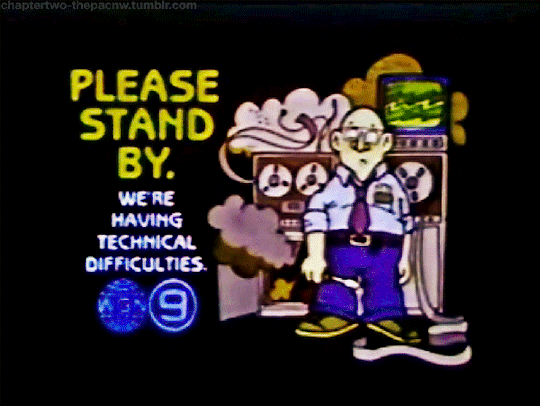
So, I'm unfortunately a little behind. BUT NEVER FEAR! I'll get back on time before you know it! So, uh...where were we last time? OH RIGHT! Let's talk about black comedy. And I don't mean black-and-white comedies, or comedies prominently featuring African-American culture and demographic. No, I mean dark comedies.

The "black comedy" functions off of macabre or taboo humor and jokes, and is often closely associated with biting satire and commentary in film. That definition is loose as hell, I know, but it's all about the subject matter. The most common subject matter for dark humor is death, of course, and related subjects to death. War, murder, strife, madness, and violence are also common topics here.
Some of the best comedies are black comedies, though. For example, Brazil (1985; dir. Terry Gilliam) focuses on themes of depression, dreams, terrorism, totalitarian governments, and madness. And it's GREAT. How about The Death of Stalin (2018; dir. Armando Iannucci)? The title ALONE should tell you everything you need to know about the tone and topic, AND YET...

It's HILARIOUS. And also informative! If you haven't seen it, I definitely recommend it. And again, that film is about, well...the death of Stalin, and the fallout of his disastrous and murderous regime. Dark, DARK topic, but very funny movie.
Dr. Strangelove, or How I Learned to Stop Worrying and Love the Bomb is about war; Fargo is about murder in North Dakota; Heathers is about a toxic relationship and the death and murder of teenagers; Birdman, or The Unexpected Virtue of Ignorance is about an actor's existential crisis and complete mental breakdown; and Trainspotting is about the devastating effects of drug addiction and features a DEAD BABY FOR CHRIST'S SAKE...and yet they're all full of laughs! Except for the baby scene. Fuck me, the baby scene in Trainspotting.
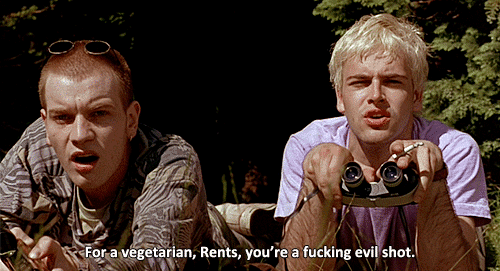
So, yeah, these are a diverse group of films, that's for sure. But where does it all start? There's 1942's To Be or Not to Be (dir. Ernst Lubitsch), which is about a Polish theatre company who need to escape in the midst of...well, 1942 Poland. If you don't get why that's dark, you should probably look up some history, bud. Charlie Chaplin would dip into the role in 1947's Monsieur Verdoux, which I mentioned last time. And there's the seldom-talked-about Kind Hearts and Coronets (dir. Robert Hamer), a 1949 film about murder for status, essentially.
But it's hard to argue that the most prominent early black comedy is 1944's Cary Grant vehicle, Arsenic and Old Lace.

Directed by Frank Capra, this film was based on a 1941 stage play, and is about...well, we'll get to it. While its prominence as a black comedy is one reason I'm watching this movie, the other is...well, to be honest, this is a movie I heard about CONSTANTLY from my Mom, as this is one of her favorites. And yet, like Dirty Dancing, I've somehow never seen it! Let's remedy that.
So, without further ado, let's get into it! SPOILERS AHEAD!!!
Recap (1/2)
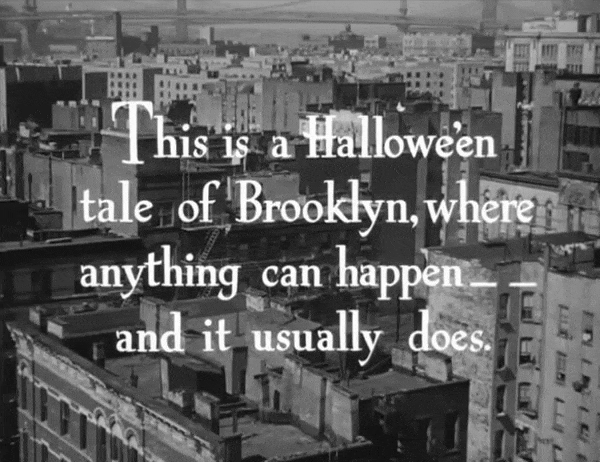
The film starts off with a BANG, as a man calls me a “big simp” to my face! Actually, he’s screaming at a Brooklyn Dodgers game, where a massive fight breaks out. This fight quickly transitions to a city hall, where a line of people are waiting to file marriage licenses. Amongst the line is Mortimer Brewster (Cary Grant) and Elaine Harper (Priscilla Lane).
Brewster is hiding from the press, as he’s a famous reviewer, and author of the Bachelor’s Bible, and it would be quite the scandal for him to get married. And yet, he’s head over heels in love with Elaine. After going through an existential crisis about the whole thing, he gives into Elaine’s sweet demeanor, and the two file their marriage license officially.
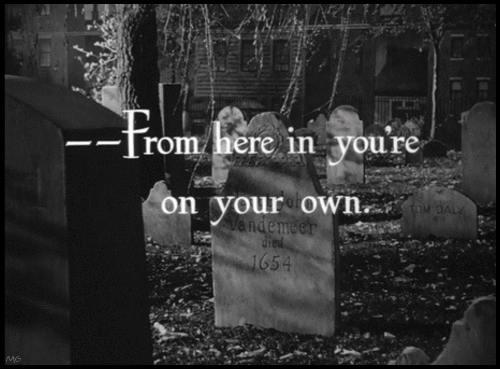
It’s Halloween day, and we move from the city to the suburbs of Brooklyn, where two policemen, O’Hara (Jack Carson) and Sanders (John RIdgely) are on patrol. Sanders tells O’Hara of the kindly Brewster Sisters, the sweetest women on Earth, both of whom live in the neighborhood. Currently, they are being visited by Reverend Harper (Grant Mitchell), Elaine’s father. He’s speaking with Abby (Josephine Hull) and Martha Brewster (Jean Adair), the kindly aunts of Mortimer.
Also living there is Mortimer’s brother Teddy Brewster (John Alexander), who apparently believes that he’s Teddy Roosevelt, which is...hilarious. Dude is hilarious, seriously. The cops come over to visit the two, and collect some clothes and toys for local charity. Also, Teddy only leaves a room by screaming “CHAAAAARGE!!!”, and running up the stairs, and I love Teddy a lot.
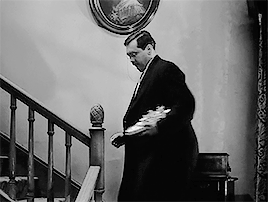
Reverend Harper and the cops leave for the night, and the sisters settle down for the evening. Abby and Martha state that their plans for Elaine and Mortimer should go as scheduled, which is probably talking about their marriage. Abby also mentions that she’s done something while she was away, to Martha’s delight and surprise. They tell Teddy that he’ll soon be digging a new lock for the Panama Canal...whatever that means.
Martha’s about to go to the basement to see what Abby’s done, but she states that because she was all by herself, the surprise is in the window seat. As she’s about to look at the surprise, Elaine shows up in the window, and the two arrive to give the happy news that they’re married. Elaine goes to tell her father of the news, while Mortimer goes to tell his sweet aunts. Afterwards, the two will be on their honeymoon, going to Niagara Falls. And I should say, they’re quite a sweet couple.

After telling the news to his aunts, he asks them where his notes are for his new controversial book, Mind Over Matrimony. They go to look for it around the house, and Teddy comes downstairs, dressed up in attire to “go to Panama.” Aunt Abby comes across a childhood picture of Jonathan, Mortimer’s brother and apparently a violent sociopath or some sort. She goes to burn the picture (geez), and Mortimer continues to look for the notes. He goes to the window seat.

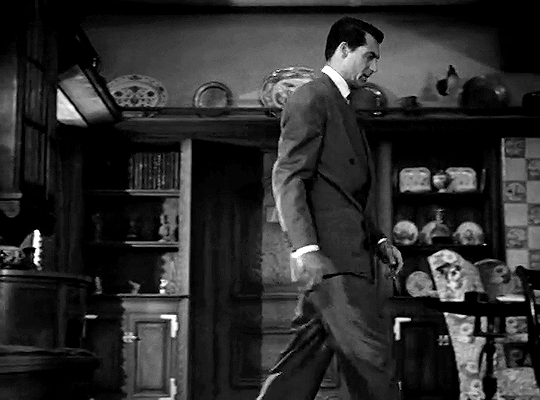

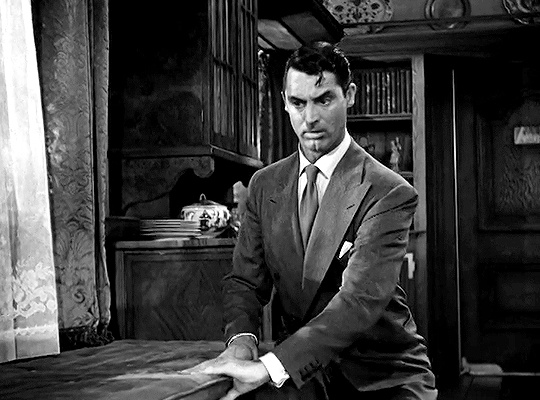
Yup! It’s a body! Looks like Abby and Martha’s sweet old lady act is a guise for some myurder! Which I know, just because it’s the most famous thing about the movie. However, Mortimer thinks the murderer is Teddy, and tells his sweet old aunts about the body, asking that he gets put into an asylum. But Abby notes that Teddy didn’t kill the man, and they already know about the body!
Which, yeah, surprises Mortimer, obviously.
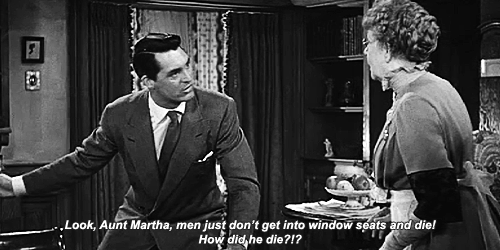
Abby cheerfully admits that the man, Mr. Hoskins, was poisoned by a tainted glass of elderberry wine, and that they did so on purpose, hiding the body before the Reverend came for a visit. The whole thing isn’t a big deal; it’s just Abby and Martha’s little secret!
After they leave, and brush off the whole thing as easy as needlepoint or macramé as a hobby, Mortimer, is completely broken by the whole affair, and is partially convinced that he’s dreaming. All the while, Elaine’s trying to get Mortimer to come over and speak with her father. But Mortimer can’t exactly forget about this whole silly murder thing, and goes to confront his aunts about it. He learns that Teddy’s digging not a lock, but a grave in the cellar. As he’s done with 10 other bodies. Or maybe it’s 11 others?

After picking up a phone call from Elaine, then hanging up abruptly (and understandably), Mortimer finds out how this whole thing started. See, the two have a “Renters Wanted” sign in their front lawn, and the neighborhood thinks that it’s there so the two sweet old ladies can offer help to anyone in need, even though they aren’t actually renting to anyone. In reality...well, they do it for another reason.
See, an older gentleman stopped by a bit ago, and he had a heart attack right there in the living room. After seeing how peaceful he looked, the two decided to bring in other lonely old men and bring in the same kind of peace. And from there...well, yeah, you get the general idea. They’ve been poisoning them with arsenic, strychnine, and cyanide mixed in with elderberry wine. Apparently, Martha’s got the mixture just right so that it tastes delicious. With all this explained, they offer Mortimer a sip of wine. Which he’s understandably nervous about.

But with all of that done, Elaine comes over to check in on him. But he’s not able to tell her anything, which greatly (and understandably) confuses her. He basically kicks her out (which enrages her, once again understandably), and calls a judge with the intent to frame the whole affair on Teddy, who’s always been.unstable. Which, for the record, is not even SLIGHTLY going to solve the problem.
But as he’s on the phone, a man named Gibbs (Edward McWade) comes in to rent an apartment. He’s all alone in the world, with nobody to care for him. And of course, this leads to the women trying to poison him with the wine. It’s a funny yet tense moment as he stops just short of drinking the wine, distracted by Mortimer’s freakout over the phone. But Mortimer gets off the phone JUST in time to scare Gibbs away and stop him from drinking the wine. And it is...VERY funny, goddamn.

As Mortimer tries to tell the aunts exactly what’s wrong with what they’re doing, the phone rings. It’s a call from Witherspoon (Edward Everett Horton), who runs an asylum that Mortimer wants Teddy committed into. However, they don’t quite have room for him, as they have too many Theodore Roosevelts at present. However, they do need more Napoleon Bonapartes. I love this goddamn movie.
Still, Witherspoon agrees to take him in despite that, and Mortimer head out to get the paperwork done. However, he asks his aunts to not do anything until he gets back, and he also proises that he’ll attend the “services” for their latest victim. He leaves, and kinda steals a cabbie’s car in the process (I love this movie, I’m telling you), and Abby and Martha start shutting things down for the night. However, as they do, they get a mysterious knock on the door. They pretend not to be home...only for a man with an ominous scar to enter the room regardless.

Let’s pause here, shall we? See you in Part 2!
#arsenic and old lace#frank capra#joseph kesselring#cary grant#priscilla lane#raymond massey#jack carson#peter lorre#jean adait#josephine hull#john alexander#john ridgely#userveil#johnsonshildy#userkeanu#usersasha#user365#comedy april#365days365movies#365 movie challenge#365 movies 365 days#365 Days 365 Movies#365 movies a year
19 notes
·
View notes
Text
Vampr Erik Origin
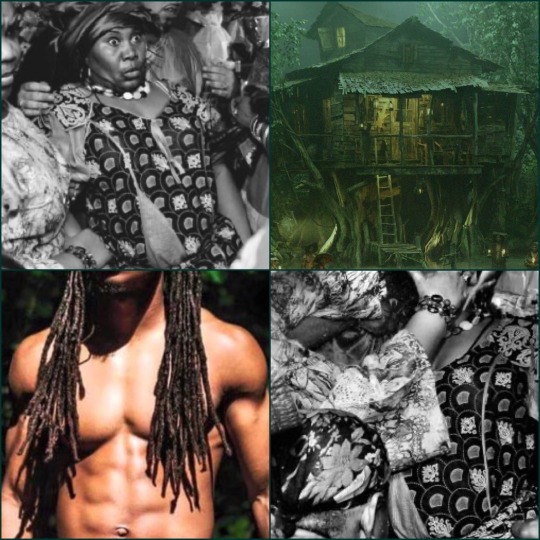
Okay so let me make a disclaimer:
I had to do a lot of research to try and create his back story in summary form. I basically learned a lot of shit that I didn’t know so with that being said, you guys can feel free to fact check me because I feel like this needs to be factual as far as the history of it goes. Also, Erik was born/reborn in an era that is very touchy. I mean, we go through crap as black people everyday but I used some very degrading words to represent how it was back in this time. If this is offensive, please feel free to let me know I will change it. I don’t want to offend or make anyone feel bad. So, here it is! This is the origin I came up with.

Erik Stevens is his alias but he was born Ricardo Dupoux. Erik was born in 1856 in New Orleans, Louisiana. Just 29 years before he became a vampire.
Erik’s mother was born in 1836. Her name was Fabiola Adonis and she is from Louisiana but her parents and family (Erik’s grandparents) are from Sainte-Dominigue which is now known as Haiti.
Erik’s father was named Jacques Dupoux. He was born in 1827 in Cuba and he migrated to Louisiana with his family when he was just four years old.
Both sides of Erik’s family originated in Sainte-Dominigue and began to migrate out during the black Haitian Revolution as free people of color. The Haitian Revolution was a successful insurrection by self-liberated slaves against French colonial rule in Saint-Domingue, now the sovereign state of Haiti. The revolt began on 22 August 1791, and ended in 1804 with the former colony's independence. It involved blacks, mulattoes, French, Spanish, and British participants—with the ex-slave Toussaint Louverture emerging as Haiti's most charismatic hero. The revolution was the only slave uprising that led to the founding of a state which was both free from slavery, and ruled by non-whites and former captives. It is now widely seen as a defining moment in the history of the Atlantic World.
Haitian Vodou, is an Afro-American religion that developed in Afro-Haitian communities amid the Atlantic slave trade between the 16th and 19th centuries. It arose through a process of syncretism between the traditional religions of West Africa and the Roman Catholic form of Christianity. Vodou is an oral tradition practiced by extended families that inherit familial spirits, along with the necessary devotional practices, from their elders. In the cities, local hierarchies of priestesses or priests (manbo and oungan), “children of the spirits” (ounsi), and ritual drummers (ountògi) comprise more formal “societies” or “congregations” (sosyete). In these congregations, knowledge is passed on through a ritual of initiation (kanzo) in which the body becomes the site of spiritual transformation. Many Vodou practitioners were involved in the Haitian Revolution which overthrew the French colonial government, abolished slavery, and formed modern Haiti. The Roman Catholic Church left for several decades following the Revolution, allowing Vodou to become Haiti's dominant religion. They referred to themselves as “serving the spirits” more so than using Voudou to refer to Haitian religion.
Jacques Doupoux and Fabiola Adonis were well respected within the Vodou community. Erik’s father was a hounsi bosale and Artisan. Hounsi is essentially a dedicated member of Vodou, an apprentice of priests. His mother, Fabiola, an Ounsi, oversaw the liturgical singing and shaking the chacha rattle which is used to control the rhythm during ceremonies. She had a voice that used to lull Erik to sleep. Jacques wanted Erik to follow in his footsteps and later become an oungan; a Vodou priest. He was born as a “child of the house” or a pititt-caye. Being an oungan provides an individual with both social status and material profit. Erik was present for his father's initiation when he was just a baby with his mother in a shared Ounfò; Vodou temple. There were four levels of initiation that Jacques Doupoux went through. That sealed Erik’s future.
The Ounfò was a basic shack in Bayou St. John. The main ceremonial space within the Ounfò is known as the peristil. brightly painted posts hold up the roof, which is often made of corrugated iron but sometimes thatched. The central one of these posts is the poto mitan or poteau mitan, which is used as a pivot during ritual dances and serves as the "passage of the spirits" by which the Loa; the spirits, enter the room during ceremonies. It is around this central post that offerings, including both vèvè and animal sacrifices, are made.
Free people of color owned the most property in Louisiana but of course, that didn’t go down in history because the whites didn’t like it. As for Erik’s family, his mother and father were free people of color that became sugar planters, for slave owners, and they also shared Haitian refining techniques to successfully granulate sugar. Erik favors his father more so than his mother, sometimes confused as his father’s younger brother.
The Colfax massacre and the Coushatta massacre happened in 1873. This sparked fear for Erik’s family and they held a certain Fete for Lwa which is a public ceremony. The drums beat, the congregation started to sing and dance for the Lwa. The Lwa came to the ceremony via possession. The Lwa prophesied, healed people, cleansed people, and blessed them and assisted them in resolving issues. Erik was 17 years old and he didn’t share this with his parents but he was running for his life from a group of white Southerners one day when he was walking the bayou of New Orleans. Erik ended up sleeping in Baton Rouge until the morning.
Erik often stays within the Ounfò, well into adult age. He became a hounsi bosale like his father, often participating as a ritual drummer or an ountògi. He would sing specific songs in Haitian Creole with some words of African languages incorporated in it. He was a Food Artisan like his mother. He admired her craftsmanship in the kitchen. Cheeses, breads, fruit preserves, cured meats, beverages, oils, and vinegars were some of her handmade specialties. This is one thing that attracted women to Erik besides his handsome features. He was Strong, tall, studly, rough around the edges and not afraid to challenge someone to a fight or a gun battle. Erik was charming, protective, heroic, funny, cocky which earned him the nickname “Big Ego Ricardo”. Erik was hard-working, religious, smart, sculpted, dependable, and an amazing lover in bed.
Long dreadlocks, whiskey-colored eyes, full, soft lips, and a smile with dimples so deep it charmed anyone. He wore fundamental ivory cotton band collar work shirts unbuttoned to show off his defined pectorals because he was proud of his body, sometimes paired the shirts with a vest, cotton brown or black knickers, riding boots, and a series of Vodou jewelry around his neck and on his fingers, some with symbols representing Papa Legba, La Sirene, Ogoun King, and Baron Samedi. During Vodou rituals, Erik would wear a cotton cloth around his head like a bandana, bare torso because of the amount of sweating he does during drumming to keep up with the dancers, Vodou symbols painted on his face to represent whichever Loa they were serving, white linen pants and bare feet.
He was obsessed with guns. He would often go down to the bayou to practice with stolen pocket pistols, shooting empty glass bottles and bean cans. He’s a protector, he did this just in case his family were in danger. The symbol of Vodou love on one of his ring fingers is what attracted his late wife, Justine LeBlanc to him when he was 27 years old. He was selling artisan bread one afternoon from an open shop window on Bourbon Street. Justine was six years younger than Erik. She was a Creole of color from Louisiana, like Erik, except her family were sent to Louisiana on slave ships from sub-Saharan Africa instead of Haiti like Erik’s family. She spoke a bit of English, and French with words from African languages. Erik spoke English and Haitian Creole with a little bit of Portuguese and Spanish.
Justine LeBlanc worked closely with Marie Laveau, who was rumored to be the granddaughter of a powerful priestess in Sainte-Dominigue, who began to dominate New Orleans Vodou that later became Louisiana Voodoo. These spiritual leaders served a racially diverse, mostly female, congregation. Weekly worship services took place in the homes of Voodoo leaders. Their sanctuaries were characterized by spectacular altars, laden with statues and pictures of the saints, candles, flowers, fruit, and other offerings. Voodoo ceremonies consisted of Roman Catholic prayers, chanting, drumming, and dancing. Vodou was brought of Haitian origin, however, the type practiced in Louisiana later in years is almost always known as Voodoo.
Erik was known to be a ladies man. He spent time flirting and fucking woman within his community. Pussy was practically thrown at him. Justine, however, changed all of that. They spent so much time together within one summer that Erik decided that he wanted to jump the broom with her which was symbolic of sweeping out of the old and sweeping in to the new to welcome a new household to the community. Justine lost her virginity to him the evening after their marriage and that’s when they started having children. Erik has two young twin girls; Rose Fabiola Dupoux and Felicie Ines Dupoux. After that, Justine couldn’t conceive anymore which she was often depressed about. Erik wanted to be fruitful because his mother came down very ill when he was five and she couldn’t conceive either. It was either her life or her ovaries so she had them removed.
Despite everything going on in America with slavery and racism, Erik; Ricardo, lived a happy life. He was feared and respected, a following of close male friends were like his comrades. They had his back, Erik had theirs. That all didn’t last very long. In June of 1884, when Erik was just 28 years old, things began to make a turn for the worst. Erik’s father, Jacques Dupoux, was lynched. With the 1880s dawning, a new era of violence ensued. White supremacy represented a central tenant of their platform and led to even greater levels of violence as they tried to reverse the advances made for African Americans during Reconstruction. They capitalized on rumors that black crime had expanded after the abolition of slavery. As a result, the number of lynchings soared across the South and hundreds of lives were being taken. Lynch mobs often justified their actions as attempts to defend white Southern womanhood from “libidinous” black males.
This angered Erik, causing him to gather a following of men who also lost family. Erik led the revolt to fight back white supremacy. They attached about 15 homes and killed between 55 to 60 whites throughout Louisiana. They also arrived on a local sugar and cotton plantation that often sought help from Erik’s own family for harvesting sugar cane. The revolt and about 20 slaves burned the plantation to the ground but that wasn’t before they hacked the entire family to death. Erik was made public enemy number one. His face was on wanted posters throughout the South but he was depicted wearing a scarf around his mouth and nose. Of course with Erik’s actions, some of his family and friends suffered. Vodou rituals were invaded and the members slaughtered. Marie Leveau and her following were protected but not Erik’s lineage.
Ricardo Dupoux AKA Erik Stevens returned home after successfully burning down another plantation and killing the entire family, including the children, execution style in 1886. Marie Laveau warned Justine that Erik was dangerous and he would endanger her and the children if she stayed with them. Marie instructed Justine to bring her something that belonged to Erik, something sentimental. Justine brought her Erik’s father’s ring that he wore around his neck. Marie performed a ritual that later informed Justine that Erik was in grave danger and this life as Ricardo Dupoux would soon come to a bloody, gory, gruesome ending. Marie told Justine that she couldn’t interfere because that could possibly go badly. Justine had to keep that big secret to herself to protect her children no matter how much she loved and adored Erik.
Erik wasn’t himself anymore. He became this angry, rude, vengeful man that killed without a backwards glance. He also turned to what is said to be evil magic in Vodou. Instead of becoming an Oungan, Erik became a Bokor and an occultist. A Bokor is a Vodou witch for hire who is said to serve the loa “with both hands”, practicing for both good and evil. Their black magic includes the creation of zombies and the creation of ‘ouangas’ talismans that house spirits. Bloods are usually chosen from birth but Erik was instead initiated in. He found the spirits, the orisha’s the Eruziles, not a priest in the flesh. The whites kept crossing the line in a spiritual and physical sense, it became Erik’s right to protect himself and his family with curses and hexes.
Erik caused moderate to severe suffering to those he seeked revenge on by hexing them and also using dark charms such as curses, the most heinous act on an individual; the worst kind of dark magic. He performed blood maledictions, a specific type of curse that may not kill the target but can remain within the victim's body, and be passed down as a genetic defect that can resurface generations later. Erik would inflict intense, excruciating pain on his victims, poison them, and cause flames called Move Dife which means “bad fire”, an enormous flame infused with dark magic to seek out living targets. Fabiola and Justine were afraid and they didn’t support Erik’s new choices. The light she saw in her son was indeed gone. He was of greatest fear within his community and within the Southern white community.
How did Erik meet his demise?
It happened in June of 1888, five months before Erik’s 33rd birthday. The White league and the Ku Klux Klan had been deactivated since the 1870s but some members worked closely together to hunt down and kill Ricardo Dupoux, soon to be known as Erik Stevens. He decided to use Erik Stevens as an alias since his name was so well known in Louisiana where he lived. No one besides the people close to him knew how his face looked since he wore it covered but his name however was remembered. If things didn’t go as planned for him and he needed to flee with his Mother, Wife, and children, he could have his name changed to Erik Stevens. A trusted friend named Augusto Richard’s wife named Beatrice Richard and her five children were held at gunpoint in their home. They found out where Augusto lives and used that as they way of finding Ricardo.
From what they tell him, Augusto’s family will be freed if he agrees to help the Southern white men capture and kill Ricardo Dupoux. At first, Augusto declined and said that Ricardo is a trusted friend of his. They punished him by beating his wife and threatened to hang her from a structure similar to a gallow. Augusto finally gives in, joining forces with the evil white men in exchange for his family's protection. Ricardo and Augusto have been friends since they were children. Augusto was sort of a co-planner with Ricardo to attack white supremacy and racists homes along with plantations. Augusto fabricated a new place to attack, suggesting that him and Ricardo go alone this time. Ricardo agreed without hesitation because he trusted Augusto. They arrived by horse outside of New Orleans near Maurepas Swamp……..
_______________
“Augusto...poukisa nou is it la?” Ricardo asked Augusto in Haitian Creole why they were there. He didn’t like speaking English just in case he was overheard. Ricardo’s eyes squinted suspiciously around him before he cut his eyes that looked black in the dark at Augusto.
“Mwen regrèt, frè,” Augusto spoke with a shaky voice, tears flooding his eyes. He told Ricardo that he was sorry.
Ricardo pulls out his pistol, aiming it at the shadows of the trees. He couldn’t believe he was being set up by someone that is supposed to be his friend. Ricardo told his wife and mother that he would be home safely and for them not to worry. He couldn’t trust anyone now. If he got out of this alive, he was going to cut ties with his followers.
“Well, well, well...look what we got here, a nigger with a gun!!”
Ricardo follows the source of that thick southern accent echoing in the night and finds a white man standing behind him with a gun pointed at his temple.
“Drop it, boy, or I will splatter this here swamp with ya monkey brains,” He threatened while making his gun click. Ricardo could see out of his peripheral more white men stepping out of the shadows. The moon light made the weapons in their hands shine.
“Listen to him nigger!!!” One yelled.
“AIN'T SO TOUGH NOW!!!” Another yelled while a series of laughter came soon after.
“Listen, I know ya can speak English, boy. Ya friend here told us everything. How ya niggers get a hold of books I wouldn’t understand,” He laughs before spitting in his face, “I’m gonna enjoy killing ya, just like ya enjoyed killing my friends ya fucking animal. This is how we’re gonna celebrate the ending of slavery...we’re gonna gut ya, and then we’re gonna throw ya filthy dead fucking body in the swamp so the gators can finish ya.”
The foul breath of this white man would have made Ricardo puke if it wasn’t for the gun pointed at him.
“Hey, Jenson, pass me my knife!” He yells, “I wanna Kill this one slowly.”
Like a swarm of stinky flies, the white men crowded Ricardo, some kicking him in his ribs, others in his face, bloodying him up. Ricardo didn’t drop to his knees willingly, he took each and every blow like a champion, even when his vision blurred from the blood trickling from a gash in his head from being pistol whipped. Augusto stood watching the entire thing. He was Disgusted with himself for allowing it to happen.
“Should we kill his wife? His mama? His little girls?!!!!” One of them punched him in the face while two men on each side kept him still since he’s so damn strong. It was almost inhumanly strong.
“AUGUSTO OU FUKIN TRÈT!!!” Ricardo yelled, before spitting out blood on the dirt covered ground. He called Augusto a fucking traitor, “Mwen gen yon fanmi! ti bebe mwen yo! ti bebe mwen yo! ou trèt!” Ricardo growled angrily with his deep fearful voice. He could only think about his family right now. What if some of these men were watching his house right now? They definitely were plotting something besides beating the living shit out of him in the swap.
“Kick this nigger down!!! It’s six of you and one of him!!!!”
A blow struck Ricardo’s spine so hard he felt it snap. He was on his stomach, his cheek hitting the dirt painfully. One foot was placed to the back of his head while angry tears fell from his eyes.
“Any last words? And say it in English before I slice your goddamn tongue off,” The man with the boot to his head spoke harshly.
Ricardo clenched his jaw while breathing in the dirt. He didn’t want to give them the satisfaction, however, the asshole in him wanted to toy with them.
“...Which one of ya is da father of Helen Landry?” He asks.
It was silent for a second until the boot on the back of his head was gone, being replaced with a hand yanking him by his dreads, lifting his head from the ground. Ricardo smiles smugly, his bloody smile almost as sinister as the blood from the gash in his head flooding his eyes.
“Let me ax ya something...are ya the reason my little Helen is dying? Doctor says she only has three days left...ya poison my little girl with ya voodoo magic?”
“I CURSED ya little girl with my Vodou magic…” Ricardo spits his blood in his face, “And if I were ya, I would go check on her, Doctors don’t always tell da truth.”
Augusto flinched when he witnessed Ricardo being kicked in the face. His jaw had to be broken now. He was being lifted off of the ground again, a sharp whimper of pain escaping his mouth. His feet gave out beneath him and now he was being dragged. His chest and abs were covered in dirt just like his handsome, swollen, and bloody face. His busted lip drooped and leaked blood while his groggy voice tried to form sentences. The men laughed at him but all Ricardo did was look at Augusto with unblinking eyes, one of which displayed broken vessels.
“Anything else ya got to say, nigger?”
The source of the voice didn’t matter to Ricardo. All he kept thinking about was his family and how he failed them. His father was probably ashamed. Ricardo looked towards the sky. If only he could call on Baron Samedi or Maman Brigette. He wasn’t in the safety of his Ounfò either. He could only hope that at this moment his mother, Fabiola, was summoning the spirits.
“Guess not, hold him down.”
With a dull, jagged knife, Ricardo was stabbed in his stomach. He felt like he was punched. The impact pushed him back a little and he wheezed. A tearing sensation and a noise followed. The pain took a while to kick but he could feel the blood trickling. When it was finally withdrawn, he felt something hot and cold at the same time, pulling the skin with it as it's removed. Ricardo’s cry was a brilliant sound to them, guttural chokes mixed with an agonized roar. His fists clenched and shook each time his skin was being torn to shreds. The knife rotated and the sound of his muscles and nerves being gouged growing louder. Then, without warning, the white man jerked it all the way into his stomach, until the shiny metal had disappeared inside him and the black handle was pushing against his broken skin.
“Die Coon!!!” They yelled in unison before celebrating with loud hoots.
“Look at him choking! This ugly motherfucker is bleeding out! Let’s take him to the water!”
Ricardo could feel his body falling to the ground. His hand clutched his wound but blood seeped between his fingers. He felt weak, his eyes opening and closing. Augusto stood there spewing apology after apology while crying hysterically.
“As for ya,” the white man that stabbed Ricardo multiple times drops his knife in the dirt, reaches in his back pocket with his bloody, cut up hand and pulled out a gun, “what? Did ya really think we were gonna let ya go free? Ya just another disgusting nigger too, and ya nigger bitch, ya nigger kids? Dem dead too.”
Ricardo watched with low eyes while Augusto took his last breath before being shot in the head, point blank range.
“Wastin’ all dese good bullets,” the white man pocketed his gun again, “Hall em’ up! Let’s take em’ swimming!”
_____________
Crowded tabletops with tiny flickering lamps; stones sitting in oil baths; a crucifix; murky bottles of roots and herbs steeped in alcohol; shiny new bottles of rum, scotch, gin, perfume, and almond-sugar syrup. On one side was an altar arranged in three steps and covered in gold and black contact paper. On the top step an open pack of filterless Pall Malls lay next to a cracked and dusty candle in the shape of a skull. A walking stick with its head carved to depict a huge erect penis leaned against the wall beside it. On the opposite side of the room was a small cabinet, its top littered with vials of powders and herbs. On the ceiling and walls of the room were baskets, bunches of leaves hung to dry, and smoke-darkened lithographs.
This is where Ricardo Dupoux rested upon a makeshift bed surrounded by oil burning candles. A sulfurous rotten-egg smell that is often associated with marshes and mudflats occupies the room. His entire body ached and the sharp pain prickled his scalp. Licking his dry lips with his equally dry tongue, Ricardo tried looking around with his sore eyes but the discomfort caused him to close them. It felt damp and gloomy around him, clearly nothing is quite what it seems to be. Ricardo could feel a powerful energy surrounding him, if only he could move his body. A few rickety floorboards creaked like someone was sneaking up on him and it made Ricardo jumpy. He wasn’t physically able to help himself.
“Ricardo Dupoux, ki sa yon sipriz bèl eh?”
A seductive voice of a woman spoke to him in Haitian Creole. This wasn’t a pleasant surprise exactly.
“Kiyes ou ye?” His voice was so hoarse and his throat felt raw.
“Who muh? Well...I’m yuh rescuer of course, handsome.”
“Kisa...ki kote sa a?” Ricardo coughs painfully. He could taste blood in the back of his throat.
“Well, don’t Yuh sound sexy speaking deh Creole to Mama Dalma. Yuh in muh shack, Ricardo.”
“Mama Dalma? Prètès Vodou a?” He spoke with astonishment.
“So, muh assumin’ yuh heard stories about muh from way back when...what else do yuh know bout’ me?”
“...Nothing.” He finally speaks English.
“Yuh know so much about muh voodoo mystic powers in the Caribbean 175 years ago…I’m honored.”
Finally, standing above his shell of a body was Tia Dalma herself. Tia Dalma was a practitioner of voodoo, a hoodoo priestess with fathomless powers that was perceived as a legend. Supposedly, she has uncanny powers to foretell the future, to summon up demons, and to look deep into men’s souls. She’s mysterious and beautiful with delicate patterns accentuating her hypnotic eyes, long but slender dreadlocks like him, deep melanin skin so smooth and unblemished, and lips painted black. She wore a sheer black dress that showed off her nudity beneath it, so many curves that looked delicious, and a mystical necklace dangling between her small breasts. Ricardo could feel her seductive energy enticing him into a tangled net. She playfully giggles while stroking Ricardo’s bare, sweaty chest with her long black nail flirtatiously.
“Poor baby, him carve yuh up?” She spoke with her Jamaican Patois. Mama Dalma looks Ricardo up and down like she wanted to mount him. She was so happy she couldn’t hide her beautiful smile.
“Did ya heal me, Mama Dalma? I thought I was gon’ die by a white man’s hand.”
“I’ve seen yuh fight big brawla, I’ve seen yuh cap a shot, I’m impressed wit’ yuh...haven’t seen a man deh brave in a while...queng dem white boys.”
“...ya been watching me?” He squints his whiskey colored eyes,“who ya for ya to be watching me?”
“Mhm, I been watching yuh, handsome...It’s because I want to save yuh...give yuh a better life than this.”
Ricardo was shivering, his skin pale and cool, difficulty breathing, mentally confused, and his blood pressure kept dropping. His chest was rapidly moving from breathing too fast, heart rate beating so fast it was almost painful, and he felt like he was running a fever.
“Easy nuh, yuh going into septic shock.” She takes her hand to pet his dreaded hair like a baby with the back of her hand.
“W-what?” His lips trembled. He was numb.
“Awoah. Muh herbes are keeping yuh stable but if I take deh herbes away...yuh die.”
Ricardo closes his eyes.
“Unless...yuh have two options, handsome.”
“One’s that I should trust? How do I know ya not poisoning me? Hm?”
“I’m gonna ignore deh...here are yuh options. Yuh can stay here on muh table and die slowly...or I can give yuh immortality.”
“Imòtalite? Baron Samedi?” He almost choked on his own spit from trying to speak.
“Better than the power of a Loa...yuh be immortal until meeting deh true death. Yuh have superhuman physical abilities, senses, flight, and healing.”
“What power is dat?” Ricardo’s eyes are glossy. He didn’t have much time. Mama Dalma was cunning, she could have healed him with her voodoo but what’s better? Healing him with the possibility of him dying again or turning him into what she became 175 years ago back in her little shack in a tree in Cuba, hanging onto her last breath. Ricardo was perfect in every way and she wanted to walk the earth with someone close to her...someone attractive and strong.
“Yuh ain’t got much time...make a decision, Ricardo Dupoux,” Tia strokes his face, “It could all be yours…”
Ricardo’s eyelids fluttered before he nodded his head. Anything to stay alive. Anything to get revenge. If he was going to come back stronger and immortal, he could wipe out every single one of them. He needed to get off of that table. Mama Dalma was convincing. Maybe it was her magic that persuaded him but none of that mattered.
“I’m glad Yuh agreed.”
Sharp, fangs extended from her teeth while she looked at him excitedly with hungry eyes. She came down on Ricardo with superhuman speed like a blur, causing his eyes to grow wide with surprise. It was almost painless, more like a pinprick considering how his body felt at the moment. The sharp points sank into his flesh like a knife to soft butter. His body twitched as his blood pooled around the back of his head, dripping to the floor of the shack and seeping between the wood. He started feeling even more woozy and lightheaded. She was really applying pressure with her fangs. He could feel his body going cold and then it felt as if his soul had left his body. Ricardo didn’t know how long this went on but it felt like forever.
Mama Dalma retracts her fangs, lifting her face from the crook of his neck slowly before staring down at Ricardo with her enchanting eyes. Her fangs pop out again and now she bites her own wrist before placing it over Ricardo’s mouth. He hesitated at first but Mama Dalma opened his mouth for him. Ricardo tasted his own blood before from his busted lip or if his gums were bleeding. He even tasted blood during a sacrifice at a Vodou ritual. It was vile with a salty metallic taste. However, Mama Dalma’s blood was surprisingly sweet, and scrumptious. Just that small amount dripping on his tongue gave him the effects of alcohol consumption.
“Deh is enough, Ricardo,” She tells him, “Ricardo...deh is enough.” She says with a more stern voice.
Ricardo wraps his hand around her wrist, applying pressure to keep it there. He could feel his body changing for the better already. Her blood...he couldn’t stop. He grunted, growled, and moaned from the taste. His tongue swiped her wrist and his own teeth tried to bite her for more but he was still so weak.
“Ricardo, deh is ENOUGH, no more!!!!!”
Mama Dalma yanked her wrist away speedily, her eyes staring down at her wound healing before her. She gave Ricardo a cold look, one that has him wishing he would have listened.
“When I tell yuh to stop, yuh listen,” She spoke with a spiteful tongue.
“It was so good,” Ricardo spoke with a weakened voice, “I want m-more.”
“Soon, muh child…” Mama Dalma kisses his lips, “Now we go to rest,” Mama Dalma wraps her arms around Ricardo and then with her superhuman speed they were out of her shack and laying in a dug up ditch. The soil was cold against Ricardo’s back. Mama Dalma places him in a wooden coffin, the moonlight creating a halo around her. His eyes drooped shut and he could feel his body shutting down like his organs were no longer working. Mama Dalma crawled into the coffin with him, resting her head on his chest and wrapping a single leg around his waist.
“When yuh wake, muh child, yuh will be Erik Stevens now...Ricardo Douboux died tonight.”
Mama Dalma kissed his cold cheek before she shut the coffin so they could finally rest until tomorrow night when Erik Stevens will finally be immortal.
247 notes
·
View notes
Text
I Care A Lot, Malcolm & Marie, Capone, The Life Ahead and the News of the World: Everything I watched in February.

Newsflash ! The cinemas still aren’t open and I’m starting to lose hope in them ever opening. Despite the UK government drawing a step by step guide into lifting the UK out of lockdown (like its flat pack furniture and not a critical pandemic) with cinemas due to open in April, I wouldn’t hold my breath seeing as our own human biology and its resistance is the actual measure of when it is safe to go out and about, not what our government says. So until everyone is vaccinated and has sustained the first few months of vaccination symptom free, I’m having to sift through Netflix and Amazon for something to watch, like I’m looking through a charity shop sale; without much luck. Don’t get me wrong, I’m all for these streaming services, I (my dad) pay for them for Christ’s sakes and I know that one day I’ll be eating my words when I’m offered a Netflix deal that I (in a Vito Corleone voice) “cannot refuse”. However, unlike some of the creators on Netflix, I’ll make the most of this opportunity and be incredibly anal about what I want to make, even if it kills me.

I feel like so many people are given the license to make whatever they want for Netflix and then I look at the trophy wall of Emmys that HBO has garnered over the years and consider their quality writers and casts. I would say most recently, shows like The Crown, Sex Education, Top Boy and Bridgerton are Netflix’s exceptions currently, being both of quality and giving us something we actually want to watch. And guess what all these shows have in common?! Not only are all the casts largely British but all productions of these shows are British too. The British quality of TV programmes for streaming services in the US is a win win for all; Americans get to watch our good quality TV and we get Golden Globes. Most notably, The Crown did exceptionally (as it always does) at this year’s Golden Globes, further proving the show's excellence despite controversy. I thoroughly praise Netflix's resistance to label the show “fiction” and the lengths it took in making the show as authentically as possible, despite the criticism. The awards speak for themselves and the Crown has scooped up several this year so far.
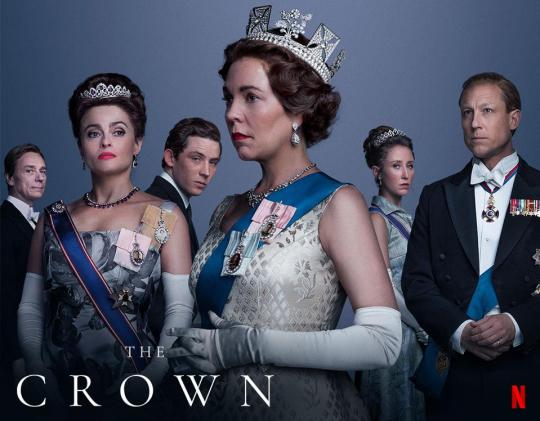
To conclude, I want the cinemas to open just as much as anyone, but I’m happy to comply with the stay-at-home-and-watch-Netflix-rule for now. For now...Here’s everything I watched this February.
Annihilation (2018) as seen on Netflix
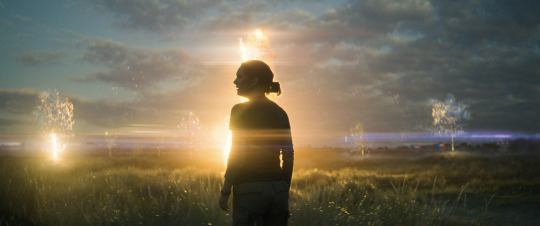
Netflix’s Annihilation starring Natalie Portman, Jennifer Jason Lee, Gina Rodriguez, Tessa Thompson and Oscar Issac was a multitude of things that were difficult to comprehend. This is not me saying this is a bad film, in fact its me saying the complete opposite as the complexity drew a tangible beauty to the film from beginning to end. I reeeaaalllyyy liked the beginning and how the first scene sucked you into the crazy and fanatical story that later unfolded. Natalie Portman as always was wonderful in this role, playing a biologist who enters another world in search of her husband, who’s gone missing on a similar expedition to hers. Like with most sci fi films, it was difficult to gather the meaning of such a film, however this lack of meaning didn’t draw away from the story or how it was portrayed, in slow and enigmatic shots that told the story with a natural pace. If you’ve seen / liked Ex Machina (2014), Annihilation has the same director and I would thoroughly recommend you watch this too as the way Alex Garland merges sci fi with horror is incredibly seamless.
Score: 10/10
Eastern Promises (2007) as seen on Amazon Prime

This film starring Naomi Watts, Viggo Mortensen and Vincent Cassel was incredibly dark and gritty. Even though I’m not Russian, I found Mortensen and Cassel’s Russian personas to be rather good for a Dane and a Frenchman. Their on screen chemistry was also really good and its make me wonder why I haven’t seen a film with these two in it before. The story follows Anna (Naomi Watts) a nurse and her hunt for the true identity and life of a baby that was born to a 14 year old girl. Nikolai and Kirill (Mortensen and Cassel) are Russian gangsters living in London and set about covering up this obscene scandal and getting rid of the product of it, a baby girl belonging to the condemned and now deceased child. It's a difficult plot to wrap your head around and like I said, it's incredibly dark. Actor and director David Cronenberg (A History of Violence 2005) directed this film and helped Viggo Mortensen with a nomination for Best Actor at the 2008 Academy Awards.
Score: 8/10
Fifty Shades of Grey (2015) as seen on Netflix

So remember how I said I was DESPERATE for films this month...I watched Fifty Shades of Grey with zero expectations and I can say definitively that it was worse than I thought. It's a true miracle that both Dakota Johnson and Jamie Dornan still have careers 6 years after such a film was released and I personally wouldn’t rush to cast either acting in my film after seeing this. Harsh, I know but reputation is everything and when you sign onto something that instead of highlighting your acting abilities, highlights your body parts, what am I supposed to think... I’m all for body confidence and what not, but I feel like most of this film sort of abuses sexuality and sexual expressions. The fact is, the BDSM part of this film wasn’t even that bad, it was the characters that pissed me off the most and their LACK of character in fact. They were orchestrated in such a flat way and the only time where either one of them found any character was through the sex itself and the discussion of it, especially Anastasia’s character. The most profound and irritating thing about this film is that Anastasia’s life seemed to only have meaning when she met the so called handsome, charming, wonderful, drop dead gorgeous Christian Grey. What does that teach us about women people? I’ve said it once, and I’ll say it again, sexualising women in film and media shouldn’t be the only reason for them to be there. And the entirety of Fifty Shades of Grey is built upon that fact. Even though the novel was written by a woman, it definitely missed the point in giving us a strong female character who could both be into sex and taken seriously at the same time. Seems like a really hard thing to do in cinema as filmmakers either go for the over-hyped sexualised prostitute, the caring mother or the nun. Like female professionals have never had sex in their lives… think again. I like to wonder what it would’ve been like had it been Ms Grey and Christian as her submissive. Not only would that mix up the character dynamic and go against gender confirmation, it’d actually be interesting. But maybe I should just write that story altogether...To conclude, the characters in this film were flat and the entirety of the film hyped up sex and the act of it way too much. It's like making a film about walking or breathing.
Score: 1/10
Malcolm & Marie (2021) as seen on Netflix
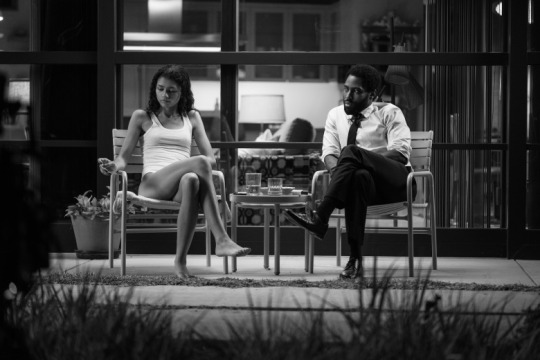
Malcolm & Marie received a lot of attention in the media and sadly not for the right reasons. In fact, what’s so childish about the backlash is that hardly any of it had to do with the filmmaking techniques Sam Levinson (Euphoria’s creator) used or the story he wrote. More of it had to do with Levinson’s controversial ideas about how the media likes to view and prod film like a goldfish in a bowl, acting ostentatiously towards the art and appearing woke as opposed to just seeing film for how it is. I gather many film critic’s egos were bruised when Levinson used the lead character, Malcolm (John David Washington) as a butcher to film critics. He says things like “I’m choosing to make a film that’s fundamentally political, but not everything I do is political because I’m Black” in reference to the ignorance of some film critics who stamp politics onto any black directed film, attempting to brand the films with their own understanding of the film as opposed to its real message and story. Malcolm spends the majority of the night loathing a fictional “white LA reporter” and betting on her exact words for his own film, about an African American woman trying to get off drugs. What he says is funny, so funny it's true. White reporters DO do this and instead of embracing Levinson’s satricalism, the real LA white reporters of our media got overly offended and used the “lack of story” card as a backdrop to fuel their distaste at being called out. Had they known Levinson’s intentions with this film, they wouldn’t have reviewed it all together as I’m sure Levinson knew what he was getting himself into when mentioning the annoying “white LA reporter” and making the stereotype central to the lead's frustrations towards the industry. Levinson also graciously mentions that even though Malcolm has such hatred towards the critics, he is their fuel and by making his so-called “art” he only joins them in the argument . Levinson made his bed when he made the film and I think he’s sleeping rather comfortably. No one even bothered to praise both Zendaya’s and Washington’s performances, which were phenomenal considering the circumstances and the added pressure of having to carry a whole story in one room using only each other to fulfil that story. The cinematography was ambitious and overall, it was a simple yet well executed story. What are y’all complaining about?
Let's put egos aside and focus on the actual film for once, rather than how its perceived the articulation of your opinions towards it.
Score: 10/10
Coming to America (1988) as seen on Amazon Prime
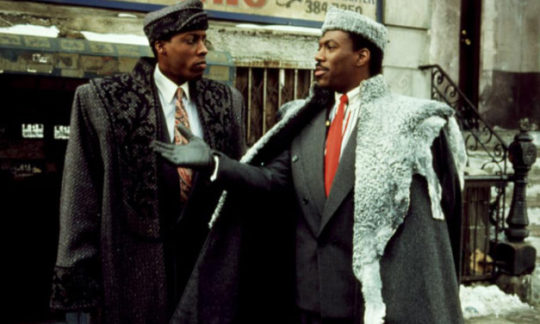
At this moment I truly was becoming a slave to streaming services. I wasn’t particularly leaping at the opportunity to watch this film, however I chose to watch it as I heard that Eddie Murphy was releasing a sequel this year. As someone who doesn’t like comedy, I found this rather funny in places but it's hard to laugh at the black stereotypes portrayed in such a film even when those stereotypes were perpetuated by a black person. There was also a lot of misogyny, something else that I don’t call comedy but just misogyny. I found it hard overlook these moments and kinda saw this element as the downfall to the film which detracted from any of the other comedic moments.
Score: 5/10
Do the Right Thing (1989) as seen on Amazon Prime
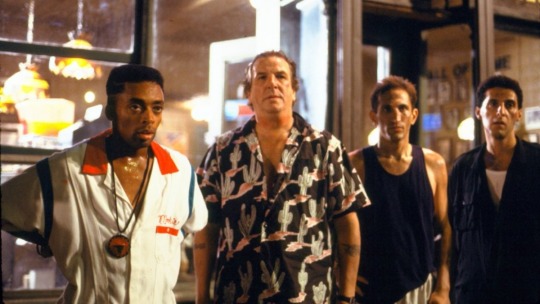
One of Spike Lee’s earlier films, Do The Right Thing is a film I’ve been dying to watch for quite some time. The film is like a fascinating book, with chapters on each of the plights of living in Brooklyn in the 1980s. Though it takes one character’s perspective, there are a multitude of other stories that can be found in this film, with them interlinking seamlessly and coming together at the end. This isn’t a film about race but rather one about anger and its potential to divide people, especially when things become heated and fingers are pointed. It covered a variety of perspectives which I like, almost like an episodic series where each episode is different and takes on a different character. This structure added variety to the film and allowed it to cover a multitude of topics in a small space of time. The structure of this film was only successful because its characters, who were funny, three dimensional and above all, had something to say. Director and writer Spike Lee played Mookie, the lead, a pizza delivery man and quite the f**k up on the streets of Brooklyn, using his mouth more than his actions to get by in life. I really liked the balance of moments of comedy and severity which had me laughing in places and immediately stopping afterwards. Well written and I commend Spike Lee for having written, directed and starred in the same film.
Score: 10/10
The Life Ahead (2020) as seen on Netflix
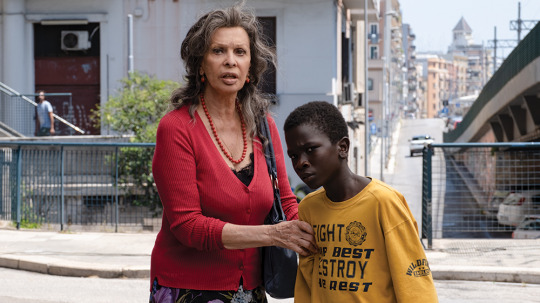
As an actress, Sophia Loren is one of my all time favourites. On seeing films such as A Special Day (1977) Two Women (1960) Marriage, Italian Style (1964), I began to appreciate the work of Sophia Loren and notice how much of an icon she still is today. Having picked up several awards over an expansive 71 YEAR career, she has been honoured many a time by the Golden Globes and Oscars as one of the finest actresses of all time. Her presence on screen is inspiring and she’s been often referred to as the Italian Marilyn Monroe for her beauty inside and out. Here at the age of 86, she plays a Holocaust survivor and foster mother who cares for a troubled boy in The Life Ahead. Loren’s character, Madame Rosa, eventually saving him from a miserable life thieving and selling drugs on the streets of Italian. Loren’s son, Edoardo Ponti directed this film for Netflix and was generous enough to give us Sophia Loren’s presence on screen once more by casting her in the film as the lead.
Score: 9/10
Gold (2016) as seen on Amazon Prime

I found Gold to be one of those talky, talky films that starts at the end and ends at the end (if that makes sense) which in my opinion isn’t the most courageous structure one could use, but is common in biopics. It either starts on the protagonist’s death bed or at the point where the police have just caught them and for Gold it was the latter. The appearance of women in this film was second to none and that’s not me saying the director should’ve added female characters for good measure or token but why make a film that only appeals to one demographic, despite the intensity of the story...film is universal after all and if a film appeals to one certain group then what’s the point of releasing it? This doesn’t detract from Matthew McConaughey’s performance though as a “prospector” looking for gold in Indonesia. Even saying this, the character was very typical of him and it didn’t truly stretch his ability as an actor, not like Dallas Buyer’s Club (2013), Killer Joe (2011) or Interstellar (2014) did. To sum up Gold into one word it’d be “meh”.
Score: 7/10
Creed (2015) as seen on Amazon Prime

This was one of the most surprising films of the month. I’m not crazy about the Rocky films nor see myself watching all of them anytime soon, but Creed appealed as a more modern take on the hit franchise. Michael B Jordan plays Adonis Creed, son of Apollo Creed, a champion boxer who died during a fight before Adonis was born. After being adopted by Apollo’s wife, Adonis Creed sets out to follow his father’s footsteps by becoming a champion heavyweight boxer himself, much to his maternal mother’s displeasure and his coach’s the one and only Rocky Balboa (Sylvester Stallone). The story is similar to that of Rocky and if anything, is a complete revival, using the son of one of Rocky’s former fighter as a backdrop to tell the story. Director Ryan Coogler (Black Panther 2018, Fruitvale Station 2013 ) brought this story to life and a courageous performance out of Michael B. Jordan. Not only was I fascinated by boxing by the end of the film, but just the whole idea of Adonis Creed, a fighter and not a quitter who thoroughly believes in pursuing your goals until they are obtained. Not only is this film for boxing fans but for those who share that same universal message and refuse to give into their own inhibitions to achieve great things. We should look to athletes more often in this respect and consider the pursuit of our own desires as boxing matches and marathon races more often as it helps put our fight into perspective and teaches us never to give in.
Score: 11/10
Arrival (2016) as seen on DVD
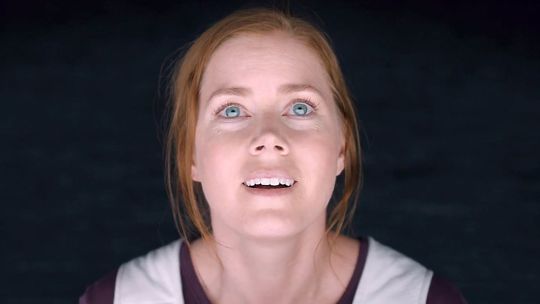
Before anyone comes for me for not having seen Arrival, before I was a movie buff I had briefly come across the film several times but had never taken the time to sit it out and watch it from beginning to end. I’m glad I did as Denis Villeneuve is one of my favourite directors evah and along with Christopher Nolan, I consider him as the King of Sci Fi. Every single one of his films is incroyable (as the french say) and it's a mystery why he hasn’t been handed an Oscar yet. Arrival is this slow and beautiful story of a linguistics teacher (Amy Adams) who agrees to help on a mission to communicate with extraterrestrial life forms that have landed on planet earth in the form of twelve huge spaceships. Structure isn’t something we typically consider when watching a film, but it plays such an important part in Arrival for time and the manipulation of it is the main theme of this film. Essentially, the language in which Dr. Banks translates from the intelligent life form gives its readers the ability to see into the future, which is when we come to realize that she’ll have a child, who will die of an unnamed disease. Despite this fact, she decides to live the life fate intended for her. The reason why Arrival is a highly credible film is because of the coverage it has as a film in terms of what it's trying to say as a film. From someone who finds it hard to bring out the emotion of a screenplay, Arrival is a great example to me as a film that combines both a cinematic feeling and a strong emotional presence throughout the film. It doesn’t abandon emotions or relationships just because the film is about aliens, but instead embraces them into the story and intertwines them with the aliens who’ve come to planet earth. At the end of the day, we can have explosions, spaceships and aliens galore, but if we’re unable to connect with characters on an emotional level then the film becomes boring. Arrival is far from boring and may bring a tear or two to your eye by the end.
Score: 11/10
The News of the World (2020) as seen on Netflix

I feel like it's impossible to hate a film with Tom Hanks in it and The News of the World definitely fits into that. Five years after the US Civil War, Cpt. Jefferson Kyle Kidd (Tom Hanks) spends his days travelling around the US ‘reading the news’ to anyone who’s willing to listen. The majority of the US was illiterate in the 19th Century, meaning it was up to people like Jefferson to inform others of the ongoings in the world by reading them the paper. It’s a wondrous thing to think about, how information was once spread throughout the world in such an archaic format. Jefferson did this off his own back, not asking for much and finding fulfilment in the reactions to the news that he “broadcasted” to them. Whilst on his travels, Jefferson comes across a young girl (Golden Globe nominee Helena Zengal) who’s negro family had been killed by lynchers. The girl was originally from a Native American tribe but had been separated by them, leaving her to fend for herself. When Jefferson comes across her, he’s reluctant to take her in at first but decides to take her to some relatives across the country. It’s definitely the role you expect of Tom Hanks and his heart warming nature is captured for us in this film for Netflix.
Score: 9/10
The Mask (1994) as seen on Netflix

It's hard for me to label The Mask as a good film as that would mean shaking off the horrendous amount of misogyny it has and the lack of diversity within its characters. Films mean different things for people, but ultimately most of them reflect an element of humanity and explore it on screen with originality and authenticity. Cameron Diaz’s character was only there to fulfil the sexual appetites of the men around her, which is something I loathe in female characters. Originality The Mask has, authenticity, not so much. That's probably the reason why I hate comedies so much, most of them are written by men and are about men so it can get quite boring to watch at times. I liked the idea of The Mask but it definitely could’ve been executed in a less misogynistic way.
Score: 5/10
Jackie (2016) as seen on Amazon Prime
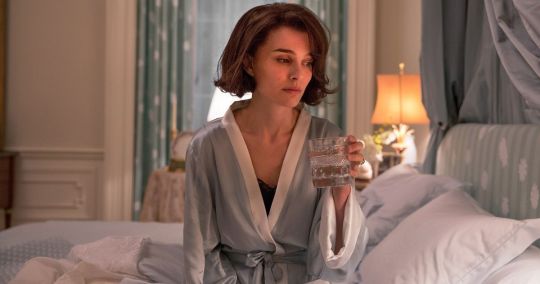
One word; perfection. This film was hands down one of the most beautiful, genuine and honest films I’ve seen in my entire life. It had me reminiscing Todd Haynes’ Carol (2015) in a number of ways, from the similar filmmaking techniques to the slow and melancholy atmosphere that was being created on screen. The AMAZING Natalie Portman plays Jackie Kennedy, wife of John F. Kennedy who was brutally assassinated on a visit to Dallas, Texas in 1963. The fact that I didn’t even KNOW that his poor wife was in the car with him at the point of the assassination is shocking. On watching the film, I learnt Jackie was a remarkable, brave and intelligent woman who after her husband's death put so much into preserving her husband’s legacy despite his lack of popularity. The way the film is shot and the music by the brilliant Mica Levi (Under the Skin 2013 , Monos 2019) just ties everything together into a enigmatic and wonderful film. Natalie Portman was nominated for Best Actress at the 2017 Academy Awards and rightly so. This film has further proven my thoughts on her as one of the greatest actresses of our time. I seriously cannot EXPRESS how much I love this film, directed by Chilean director Pablo Larraín, who’s also made another film that I can’t get enough of Ema, which was released 2 years ago.
Score: 12/10
Foxcatcher (2014) as seen on BBC iPlayer
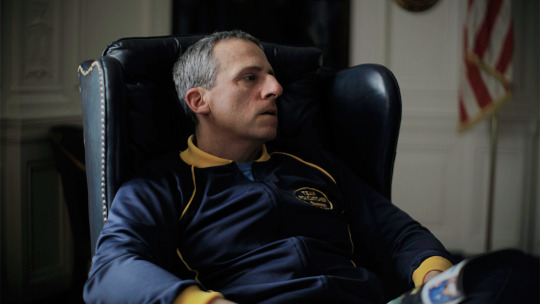
When we first think of Steve Carell, our minds probably drift to his most notable performance as Michael Scott from The Office or even Gru in Despicable Me. It's rare for a so called “comedy” actor to find his way into films with a more dramatic substance and over the last few years, this is what Carell has been showing us on screen, with this role in Foxcatcher and more recently, in Felix van Groeningen’s Beautiful Boy (2018). Foxcatcher is the true story of a wrestler offered the opportunity to train with a private wrestling team owned by a huge chemical corporation. Channing Tatum plays Mark Schultz, a quiet and reserved wrestler who trains alongside his brother David (Mark Ruffalo), also a champion wrestler. What's sad to see in this twisted story is how validated Mark feels once the powerful and wealthy John Du Pont (Steve Carrell) begins to take an interest in him and takes him under his wing. This relationship drives a wedge between Mark and his brother David, but much to John’s displeasure, it doesn’t last long. This is definitely a story of power and how people can react in bad ways when they are owed too much of it. Every performance in this was astounding and the slow and subtle telling of the story was truly beautiful to watch. Foxcatcher is a film I’ve been dying to watch for some time and it DID NOT disappoint. Period. The film was also nominated for five Oscars back in 2015, including Best Actor and Best Supporting Actor.
Score: 11/10
In Fabric (2018) as seen on BBC iPlayer
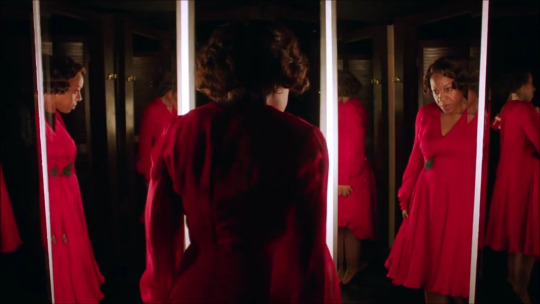
Based on the current reviews of In Fabric, I deem the film a poncy experimental spectacle. Not only did it not say much, but what it was trying to say was rather disturbing and quite frankly bizarre. However, it's not a film I can necessarily hate on as it is experimental, meaning from the get go, I shouldn’t be expecting any sort of clear cut narrative, with relationships, protagonists, conflict or hierarchies. Experimental films are more about exploring a central idea and having all its “characters'' not essentially prove the idea, but just talk about it, like a debate but everyone agrees in the end. A debate where everyone agrees would be boring, which is why I find experimental films to be boring as most of the time they don’t have a meaning and sadly as humans, we’re obsessed with finding the meaning of things or else we’ll go crazy. And I would say this film definitely left me crazy at the end, proving the idea of man’s constant need to find meanings in things. In Fabric wasn’t really relatable, funny, clever or bold. It kinda just...was.
Score: 5/10
Delicatessen (1991) as seen on DVD
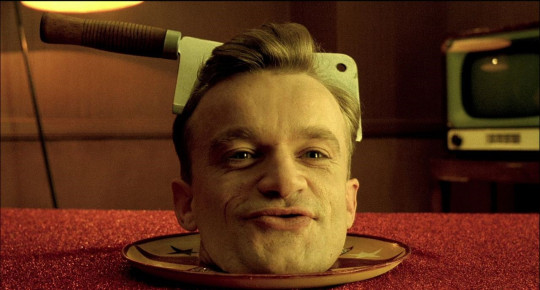
I love how the world likes to think that the American film market is the only film market when in actuality the French created the actual concept of cinema and the idea to project “movies” onto a large screen. With this has come a plethora of incredible movies from France that have gone onto to change the film industry forever. There’s a reason why the most prestigious and exclusive film festival in the entire world is held in the South of France and not LA. Jean-Pierre Jeunet is the auteur behind Amélie (2001) one of the most well known independent films ever to be made and before Amélie came Delicatessen. This film is Tim Burton meets Wes Anderson but in French and tells the story of a man working for a butcher and the crazy characters he meets in the same apartment as him. By the end it's clear that The Butcher is selling more than pork and beef down in his store and that the new tenant is due to be the next item on sale. I loved how weird and larger than life the characters were and the otherworldly set design used for this film. There were so many moments that are quite hard to explain the beauty of them and if you’ve seen Wes Anderson or Tim Burton’s work, you’ll notice the similarities between this film and their work, perhaps showing a french influence on the current American market.
Score: 10/10
Amélie (2001) as seen on DVD
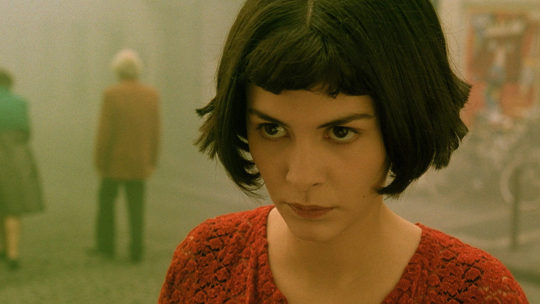
Continuing on with the French theme, I was reminded this month of the beauty of Amélie. Every, single, shot in this film is pure perfection and I bet all my money that Wes Anderson was a mega fan of this film when it came out. It's truly a film like none other and it’s only this time around did I realise how much I RELATE to Amélie. The way she sacrifices herself for others and gets nothing in return, the lengths she goes to tell someone something instead of JUST SAYING IT, her lack of friends, I can definitively say that there isn’t a character on screen that I’ve related to more than Amélie (besides Elio from cmbyn). If you haven’t seen Amélie have a word with yourself.
Score: 11/10
Pan’s Labyrinth (2006) as seen on Amazon Prime
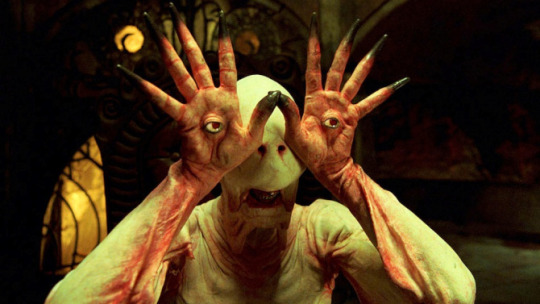
Pan’s Labyrinth was a surprisingly amazing film and I wonder why I hadn’t seen it sooner. I was astounded to see it was in Spanish which I thought made the story somehow better. It's rare that we see such high budget and well known film that’s in a foreign language but I’m glad this film got the noise it did when it was released. Guillermo del Toro (The Shape of Water 2017) tells us the story of 10 year old Ofelia and her discovery of magical creatures in the woods that inhabit the outskirts of her new home. Not only that but it’s 1944. The Spanish Civil War has been over for five years but small groups of guerrilla rebels continue to fight against the new fascist dictatorship led by Francisco Franco. This is a well structured film that shows two strong worlds and combines them in a satisfying way, which isn’t an easy thing as sometimes films can get lost in the facts of history instead of the emotions and dynamic relationships. The set design in this was UNREAL as always and I really felt for the characters and their given circumstances. And that’s what we call a film.
Score: 11/10
I Care A Lot (2021) as seen on Amazon Prime
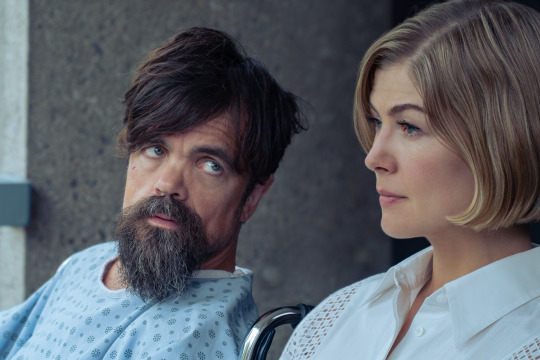
For a full review of I Care A Lot, follow the link: https://ratingtheframe.tumblr.com/post/643763403606867968/a-strong-performance-from-rosamund-pike-that-we
Score: 8/10
Interview with a Vampire (1994) as seen on BBC iPlayer
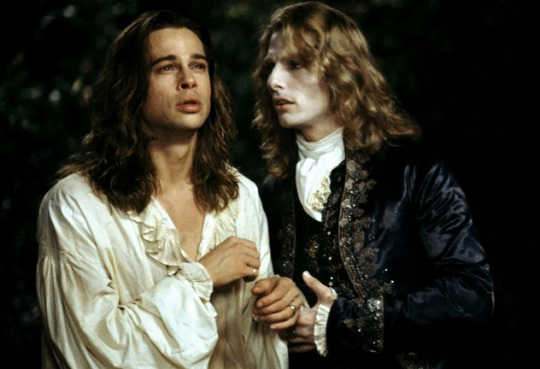
We were doing SO WELL until I made the costly decision to watch this waffle of a film, directed by Neil Jordan. Not only was the story all over the place, but the dialogue itself was incredibly on the nose and self explanatory throughout. It feels like there was more talking about the film instead of showing the film, which just made me switch off from early on in the film. I hated the casting of Tom Cruise in this and there were moments when I believed his character, but none of them outweighed the overarched and over bearing performance he was attempting to give. Brad Pitt was marginally better but the performance of Kirsten Dunst who was 12 years old at the time this film was released, outdid both actors. She was the only character that I truly felt for / cared about and her on screen presence was both enviable and wise beyond her years. Personally, I can’t explain what this film was even about because I truly didn’t get what was going on, however if you’re a fan of Kirsten Dunst’s work, this would be a suitable film to watch in that respect.
Score: 4/10
Fargo (1996) as seen on Amazon Prime

Fargo is probably most known as a Netflix series, but before that, it was originally a film directed by the Coen Brothers and starred the likes of Frances McDormand, Steve Buscemi, William H Macy and John Carroll Lynch. I’ve been meaning to watch Fargo for quite some time and I was not disappointed with the outcome of it. It's one of those good old fashioned crime films, with lots of twists and blood split throughout the film. The film won two Oscars in 1997; one for Best Actress which was handed to Frances McDormand playing a police officer investigating a string of murders in Minnesota and another for Best Original Screenplay. A really well constructed story with a fantastic cast and great cinematography work from Roger Deakins (1917 (2020), Blade Runner 2049 (2017) The Shawshank Redemption (1994).
Score: 10/10
The Darjeeling Limited (2007) as seen on Amazon Prime

The Darjeeling Limited further proves to us Wes Anderson’s ability to create entire new worlds and show us stories that take place all across the world. Three brothers, Peter (Adrien Brody), Jack (Jason Schwartzman) and Francis (Owen Wilson) have travelled to India in an attempt to bond with one another “spiritually” after the death of their father. Peter and Jack aren’t too keen on this little expedition, irritated at their brothers' intrusiveness over the trip. The majority of the film is set on this fanatical train travelling across India and yet again, we are blessed with some phenomenal production design to tell us a fun and uplifting story. What’s more is that the boys’ mother (Anjelica Huston) lives in India as a nun at the foot of the Himalayas. This becomes the real reason for their venture and such a thing changes the character dynamics between the three men. India is shown in all its beauty in this film using the backdrop of three men’s relationship with one another as a story.
Score: 9/10
The Life Aquatic of Steve Zissou (2004) as seen on DVD
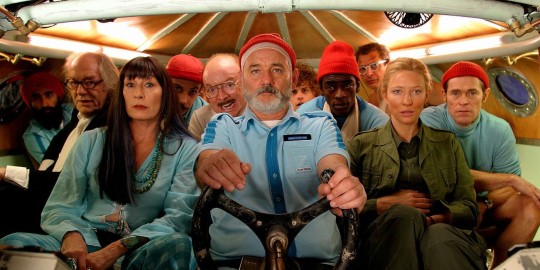
Another one of Wes Anderson’s lesser known films but equally as good as the rest, this film follows a group of marine explorers travelling across the pacific to try and kill a shark that supposedly ate a member of Steve Zissou (Bill Murray) ’s crew. With an all star cast composed of Bill Murray, Owen Wilson, Cate Blanchett, Jeff Goldblum and Anjelica Huston this film was entertaining, enlightening and cinematographically ambitious. Steve Zissou is a fictional character who makes a living off of extreme and dangerous marine explorations. He makes films of his travels using his crew and after screening his latest film, he meets a young man (Owen Wilson) claiming to be his son. Evidently, Zissou is reluctant to accept that this man is his son and uses his presence as financial gain to the project. I appreciated all performances in this film and the set design (as always with Anderson’s films) was exceptional.
Score: 9/10
Life of Pi (2012) as seen on Amazon Prime
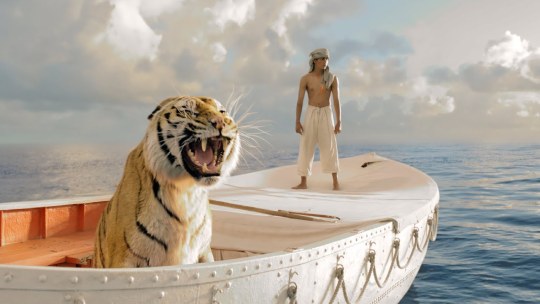
A highly visual and emotional film that carries beauty throughout in both performance and story, Life of Pi was directed by Brokeback Mountain (2005)’s Ang Lee and tells the story of Pi (Suraj Sharma and Irrfan Khan) a young boy alone in the middle of the Pacific Ocean with a fully grown Bengal Tiger. Winner of 4 Academy Awards including Best Director at the 2013 Academy Awards, this film does a phenomenal job of reminding us why cinema is such a superior and infinite art form. Pi’s family are on their way from India to America, exporting a large number of their zoo animals in hope of selling them once they reach the other side of the world. After a horrendous storm ravages their cargo ship, Pi is left all alone in the ocean with what only appears to be a small dingy, but to his horror, he comes to find that the zoo’s tiger Richard Parker is keeping him company in the middle of the ocean. Now if that ain’t a viable story, then I don’t know what is. To make a film look like it was set in the middle of a Pacific and with a Bengal Tiger is no small feat. Suraj Sharma’s performance was both truthful and powerful, despite the film being mostly shot in a studio with nothing but animation for Richard Parker. This is one of very few films that does the original novel justice.
Score: 11/10
Capone (2021) as seen on Netflix

Yikes. Capone has not been getting a lot of love in the media since its release on Netflix on 24th February. Personally, it's not the most god awful, offensive film I’ve seen and yet I wouldn’t have been the one to have made such a film either. The film is supposed to depict the last year of the infamous and notorious Al Capone, who suffered from numerous illnesses at only the age of 48. Tom Hardy plays the blood thirsty gangster and I have to say, this was a thoughtless casting choice. Hardy doesn’t have an ounce of Italian in his face and he put on this larger than life caricature of an accent that had me feeling rather sorry for him at moments when I shouldn’t have been. The acting was exceptional, but believable and interesting? That’s another argument altogether. Cinematography and sound wise, I thought the film was excellent in those respects but again, those should be additions to the integral story of a film. I get why Hardy signed up though, what actor wouldn’t want to play a mob boss? Maybe the point of Al’s life in which this film was built upon was perhaps wrong for the screen and I’m sure most would have preferred Hardy to play Capone at his peak. This film is a clear example of people getting ahead of themselves when they first explore an idea for a film. This film could have easily been saved in the development stage had someone said let’s not do this.
Score: 5/10
Creed II (2018) as seen on Amazon Prime
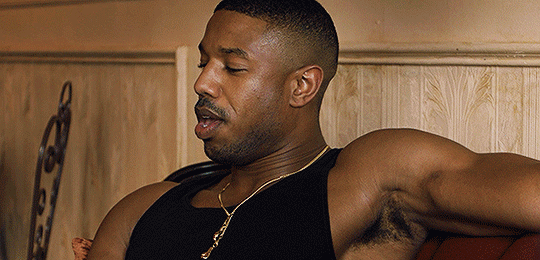
Obviously a prequel will always outdo a sequel, however I found Creed II to be just as meaningful as the first film. Maybe even more so as Adonis Creed (Michael B Jordan) is becoming a father his responsibilities have shifted dramatically. He’s also desperate to fight Viktor Drago, a Ukrainian ruthless boxer whose father accidentally killed Creed’s father in a match decades before. Drago is tough, beyond what he and his coach Rocky (Sylvester Stallone) could ever imagine and because of this, it drives a wedge between Adonis’ relationship with his coach. Creed thinks Rocky doesn’t believe he can beat Drago but Rocky insists not fighting the bull of a boxer would benefit him greatly, after all, look what happened to his father. The character dynamics have shifted in this sequel, but the structure has remained largely the same. We kind of knew what we were being served at the end and the change in character was there for everyone.
Score: 10/10

...and that’s it! Everything I watched this February, you do not want to KNOW how long this list took to compile. Thanks for reading and see you next month!
ig: @ratingtheframe
#Movie Reviews#new movies#movies#natalie portman#sci fi films#alex garland#netflix original#Netflix movies#netflix#fifty shades trilogy#malcolm & marie#zendaya#john david washington#sam levinson#euphoria#coming to america#do the right thing#spike lee#the life ahead#sophia loren#matthew maconaughey#creed#michael b jordan#arrival#denis villeneuve#the news of the world#tom hanks#the mask#jim carrey#cameron diaz
22 notes
·
View notes
Link
Other possible Holocausts: why pro-lifers are lying to us, and why thats a good thing
…
Ive had a running argument over the past few years that the raw lack of anti-abortion terrorist action proves no one really thinks abortion is murder, ie. intentional 1st degree murder of a life equal to yours or mine.
Ive always gotten pushback to quote WillyWang:
The "revealed preference" of those that oppose abortion but don't firebomb clinics and kill doctors? It won't help, you'll be made an example of in the negative sense, and civilized norms are more important than a useless symbolic point. One clinic destroyed won't end abortion, after all.
From which this Effort-post got its Genesis:
Would you say the same about those who participated in the french resistance or Warsaw Ghetto rising to Nazi Germany?
Everyone of those claims applies there: they were likely to be made examples of, they were damaging civilized norms, and any given action had relatively little to no impact.
Yet the same people who insist abortion is murder, and thus that America is committing a holocaust, yet denounce any of the people who employed violence against abortion doctors or clinics, and can’t distance themselves fast enough from any call for violence... none of those people apply the same logic to the first holocaust. None of them say the frenchmen who bombed german police stations where dangerous terrorists who deserved their executions, none of them denounce the Warsaw ghetto rising as an attack on civilization.
…
If anti-abortion advocated genuinely believed a fetus was a equivalent human life to yours or mine or the little kids they see walk to school, and that this was an ongoing holocaust of American Children at a scale possibly 10x or more what was done to the jews... they wouldn’t need to come up with ad hoc reasons why they don’t resort to violence, their mind would be screaming at them to take bloody vengeance 24/7 in righteous outrage, demanding that oceans of blood and fire be unleashed that it might wash clean the horror, that nuclear fire would be be an acceptable emergency shut off to end such wanton and cruel slaughter... and if thinking through all the logic they concluded that no violence wouldn’t help and they must pursue some peaceful negotiation to stop the slaughter, then their minds recoil and call themselves cowards and the moment of coming to that conclusion would be an ongoing trauma they’d carry with them for the rest of their life, even if they knew they were 100% right. They would meet the “pro-choice” and barely be able to conceal their desire to see them dead or imprisoned... they would meet women who had had abortions and scream bloody murder at them and tell them they deserve the death penalty, the way many of the same people react when presented with women who’d murdered their children, but after their children had left the womb.
The people who were jailed for assassinating abortionists, or fire-bombing clinics would be folk heroes lionized in songs and crowd funded hagiographic documentaries and folk traditions, like John Brown, or John Wilkes Booth, or Louis Reil, or Saco and Vancety, or Huey Newton, or Malcolm X, or David Koresh, or Levoy Finecolm... or hell even just Jesse James, or Killdozer.
Americans abort on average 1 million plus babies a year... that means if abortion is murder and those are human lives, then the 50 years since Roe vs.Wade has been a worse crime than the holocaust, slavery, or the crimes of Stalin, and we’d have to consult a historian to see if they were worse than Mao (on a per capita basis, certainly)...
This would be the worse crime ever commited, the greatest mass slaughter ever perpetrated in human history, and 50 years later our society would remain committed to repeating it in the next 50 years.
If that does not demand violence, then nothing in human history ever has, no even defensive war has ever been justified, and only Jainists and Jehovah’s witnesses are morally acceptable actors. An extreme unexceedable pascifism we know the vast majority of anti-abortion advocates do not endorse, since they overwhelming supported or at-least did not conspicuously oppose the wars in Iraq and Afghanistan (over a mere 3000 Americans dead, and a less than a years abortions worth of Iraqis killed by Saddam) and continue to conspicuously “Support our troops” troops that exist to carry out violence, despite their moral commitments saying they can apparently never in human history be justified.
.
When i say this proves “Pro-lifers” clearly do not believe a fetus is an equal human life, thats me being incredibly charitable. That is me extending a overwhelming large olive branch, that is me expressing a stupendous care and concern and sympathy and brotherly love to rival the best 19th century dinner host, the dearest of friends, a benevolent older sibling, a lover, a parent, a mother who on hearing the taped confession of her son to serial murder, doesn’t hesitate once before screaming “you monsters you’ve drugged and tortured him! What threats have you made to my grandchild! He would only say such things to save his daughter’s life!”
My claiming they are full of shit and lying to themselves, to you, and to me, is an expression of love and faith in my fellow man which until now I did not realized I possessed nor was capable of...
Because if I merely took them at their word? If I believed that they believed what they say they believe? They would be monsters.
.
Lets play a game called “Other Possible Holocausts”. Approximately 800,000 babies where aborted this year.
Lets imagine the US government has just announced that crime has gotten to cumbersome and that over the next 3 years it plans to execute every single one of the 2.4 million people in US prisons jails and Jeuvenile detention centres.
Lets imagine that to reform education, the US resolves to kill the bottom 1% of all 80 million students in the country based on an age adjusted standardized test every year.
Lets imagine hatred of the obese takes off, and a policy is passed to resolve America’s 30% obesity rate by the mass instituting of bounties on hunting and killing the obese... that every year 800,000 to 1.5 million tags will be issued for a fee to allow the hunting of the obese in return for monetary rewards on successful hunts and getting to keep the carcasses for meat base animal foods and the manufacture of fuel, or fat based household products. These bounty hunters become known a “whalers”.
Lets imagine the US announces its done with African Americans... if the problem hasn’t been solved since 1619, its not going to be... and so they’re going to genocide all 40 million African Americans at a rate of 2% a year, for the next 50 years.
Lets imagine opposing extremists get in charge and decide the racists rednecks have to go, and so they’ll be forming death squads to roam the South, Appalachia, and the rust belt, with the objective of killing 800,000 poor whites a year, “until the problem is solved”... with many happily stating 50 years of this would be acceptable, while others state it’d be perfectly fine to renew it another 50 years after that.
…
These are all American lives, and according to pro-lifers of equal moral value to the babies aborted every day, no better, no worse.
By saying this and by saying violence is not and cannot be justified to resist it, they are saying that their reactions to any one of the above eventualities would be to continue to live their lives as they have lived the past 50 years.
I do not know how to respond to that. Even if Abortion is truly murder of an ensouled equal human life... The Pro-choicers committing the murders don’t think it is... hell the Nazis murdered 6 million jews and a further 5 million undesirables, but they didn’t think of them as human, they thought they were monstrous and “life unworthy of life”, like a burning man begging you to shoot him so he doesn’t suffer or hurt his fellows... a mercy in a way.
Pro-lifers on the other hand claim these are equal viable human lives of equal status to yours or mine or perhaps even greater.... They’re Children.
And their reaction to the greatest mass slaughter in human history, the reaction of almost half the electorate, who regularly talk about the need to resist tyrrany and defend the weak (as both left and right in the US do, in their way), their reaction is to vote every 4 years, and have it perhaps not even be the #1 issue if the economy seems bad, they have the opportunity to vote for the first black president, or the Orangeman says something crude about Mexicans... they won’t be single issue voters even when it comes to the greatest crime ever committed in human history?
.
I refuse to believe it. Even I, cynical as I am, have to believe we are not that far gone, and the age of men has not come crashing down... i would believe the US capable of such a crime, but to believe that a double digit percentage of Americans could look at that, recognize the victims as their fellow humans,recognize their state and society as committing mass murder of their neighbours, future friends, and relatives...to recognize that they have a moral imperative to act on this... and then just go “welp them’s the breaks, gotta be civilized” because 9 people in black robes said it wasn’t murder?
Holy fuck. No that is not how people work, that is not how humans behave, I cannot accept that, and leftists who spent the summer rioting in response to fewer than a thousand police killings of black men a year, who remember the civil rights and anti-war movements, who kinda vaguely recall that they’re supposed to remember Huey Newton, or Saco and Vanseti, or those Rossen...something people... who like to imagine they’d have been abolitionists in the 19th century. They’re right to call bullshit.
They’re right to call the pro-lifers liars who don’t believe their own messaging, and instead just want to control women’s bodies, after a lie like that to their face, they’re right to treat them with scorn.
…
Pro-life is rescuable as a sentiment and an activist movement...
But not while it claims a Holocaust is going on and somehow magically no violence could ever be justified to resist it, thus lining up all the arguments that will allow the next holocaust to be committed without resistance.
There have been a double digit, perhaps even a triple digit number of mass murders and genocides in the hundreds of thousands or millions of people, since the 20th century. America is enabling its ally Saudi Arabia to commit one against the Yemenis right fucking now.
We need to be very fucking clear about what it is justified to do to members of a regime that commits such a crime, and what it is definitely justified to do to the immediate perpetrators of the murder. And That we will back violent resistance to such a horrible crime by the state even if it serves only to make the resister a martyr we’ll praise, or it degrades “civilization” (what civilization could remain in such a regime?), or it ultimately has no effect (it is on the survivor to try harder)... The major members of the House of Saud deserve the Gallows under international law for what they’re doing in Yemen , as do their American attaches and core enablers... and if that comes from a Judge in the Hauge or from a convoy of irregulars in pickup trucks, or from lone assassins who manage to get through to them, It is justice, and i will praise it.
What we cannot do is pretend that genocides and mass slaughter on unconscionable scales are occurring and then come up with excuses for why we should do nothing and anyone who does resist is a criminal. Or else those excuses will be the ones that allow the next real genocide in the west or on US soil to actually happen.
If there is a genocide or democide or whatever you want to call mass slaughter. You must recognize the justice the violent resistance to it, even if you personally do not participate, or you must admit you were lying about there being such a crime... to say otherwise, to say a state can commit such a crime and still retain its right to your loyalty, to say a people up to and including its victims must obey such a thing, a creature made of bureaucracy that has set its sights on massacring humans by the thousands if not millions... it is to side against the human race in a war of extermination.
And as someone whose pro-choice as they come, I’d much rather, if the pro-lifers really believe its murder, I’d much rather they start a bloody civil war, than for it to become the norm that that is ethically acceptable.
3 notes
·
View notes
Text
MEET THE NEW WEST, SAME AS THE OLD WEST
In the second act of Once Upon A Time… In Hollywood, washed-up actor Rick Dalton is on the set of a TV western as his stuntman and best buddy, Cliff Booth is revisiting Spahn Ranch, a former set for movie westerns. The ranch has been taken over by a bunch of hippies who follow some guy name “Charlie”. The heavy of the hippies is a fella by the name of Tex Watson. When conflict arises between Cliff and the hippies, one of the girls runs off to fetch Tex, who’s busy showing a tourist couple around the ranch. Hearing that there’s trouble brewing, Tex snaps to it, galloping across the western landscape on horseback and wearing a black hat. It’s a sweeping shot straight out of a John Ford film. That’s when it clicked for me…
Tarantino has made his third western.

Although there were always spaghetti western elements in his films (especially in Kill Bill vol. 2), QT hadn’t made a full-fledged western until 2012’s Django Unchained. Though entertaining and with an African-American lead, the film is his most straight-forward movie. We know who the heroes are, we know who the villains are. Wrongs are righted with a six-shooter and a hero’s grin. Its followup was another western, 2015‘s The Hateful Eight, a much darker and far less heroic film. All of the characters are flawed if not outrightly fucked-up. If Django Unchained was the sumptuously shot crowd pleaser, The Hateful Eight was the claustrophobic, nihilistic reversal. The western myth of heroes and villains is subverted by an unsavory group of characters who drag each other through snow, blood and racial slurs. Maybe the Old West was a pretty rough place to live in after all!
And now, in 2019, QT transports us to another Old West: 1969 Hollywood.
Fifty years ago. Half a century. Pretty old, right?
Already contentious with reviewers, one of the main debates surrounding Once Upon A Time… In Hollywood is its handling of Sharon Tate and the Manson Family. In the summer of ’69, when Tate, her unborn baby and her houseguests were brutally murdered by three members of the Manson Family, it sent shockwaves throughout Hollywood and America. The utopian dream of the 1960s was over. That’s the sanitized, less complicated history anyway. At the time many people were blaming satanism and Tate’s husband Roman Polanski for his hedonistic ways. Plus anyone deep in the trenches of late 60s hipdom knew that some of the peace-and-love spouting Flower Children might be psychopaths that could turn on a dime. Such darkness was foreshadowed in the music of The Doors and Velvet Underground. As Joan Didion recalled in her seminal work The White Album:
“Black masses were imagined, and bad trips blamed. I remembered all of the day’s misinformation very clearly, and I also remember this, and wish I did not: I remember that no one was surprised.”
Knowing this I find it disappointing just how many reviewers fail to see how sympathetic QT is to Sharon and her friends. They’re shown as cool people with a good vibe (only Roman is shown to be prickish when he speaks rudely to a dog). Sharon and Jay Sebring like to listen to records and enjoy life. No satanism. No orgies. And Sharon’s a generous person. She picks up hippie hitchhikers and buys her husband a Thomas Hardy novel. She relishes the communal experience of watching herself in the Dean Martin film The Wrecking Crew. It’s not just about her. She’s enjoying the connection she’s making with the theater’s audience. On the infamous August night, the film’s narrator talks about how Sharon, in the late stage of her pregnancy, was feeling hot and anxious. In short, Sharon is humanized. She’s a thoughtful, spirited and benevolent presence throughout the film. I think reviewers who view her just as “a Barbie doll” are revealing more of their own lack of empathy than QT’s. And people getting hung-up on how many lines her character speaks have some skewed priorities. As if the only way a person has worth is if they talk a lot. Talking. Talking. Talking. There are so many empty vessels running at the mouth these days. Social media voices bombard us constantly. There’s something to be said for some quiet dignity every once in awhile. Regardless, Once Upon A Time… In Hollywood isn’t Sharon’s film and it’s not a biopic. It’s Rick and Cliff’s film and it’s a western.

If comedy is “tragedy plus time”, then the same can be said for any work of art. The mythology of the Old West often mixed historical and fictional characters. Whether they were Billy The Kid, Wyatt Earp or Butch Cassidy, we’ve seen countless retellings of their exploits, never exactly the same, never entirely accurate. That’s what makes it a myth. A good portion is made-up. Going back to Homeric and Arthurian legends, the foundation of storytelling has always been a collision of fact and fiction, chronicle and embellishment. People make too much of QT altering historic events. Are the Nazis of Inglourious Basterds and the Manson Family of Once Upon A Time… In Hollywood any different than any other mythical villains of earlier works of art? If a filmmaker can’t riff on a fifty-year-old historical event, then what are we really doing here? Do we just want the cinema of Marvel Comics and discreet biopics? QT doesn’t treat history any different than the filmmakers of the 1960s treated the events of the 1860s. Tex Watson, galloping away in his black hat, is a signpost for this. It’s QT’s way of saying: “Every time has its myths, every time has its black hats and white hats”. And the Manson Family, filled with bloodlust and megalomania from the top down, fulfill the role of black-hatted villains quite perfectly.
Does this make Rick and Cliff, two middle-aged white guys who love booze and hate hippies, our white-hatted heroes? Hell, no. With the exception of Django Unchained, that was never QT’s bag. He’s all about the anti heroes of spaghetti westerns and Sam Peckinpah films. Men who have done plenty of bad, sometimes unspeakable, things. They’re only the hero because they wrestle with their past and because there’s always a meaner, badder fella waiting to shoot it out with ‘em. Clint Eastwood’s character in the The Good, the Bad and the Ugly is only “Good” because Lee Van Cleef is so clearly “Bad” (and Eli Wallach “Ugly”). In 1992’s The Unforgiven, Eastwood’s character talks of killing “women and children” in his past. Yet he’s still clearly our hero. The Old West is a morally complex time in which one’s heroism is often defined by a greater and competing villainy.
So when it’s revealed that Cliff possibly murdered his wife and got away with it, he’s stepping into the role of anti hero with a dark past. Is Cliff haunted by his past? Not seemingly. He’s more inclined to shrug it off with a smirk and swig of beer. Shit happens y’know. This makes him exactly the type of guy murderous hippies shouldn’t fuck with. They justify their bloodlust with a self-serving philosophical bent: Entertainers taught them to kill via TV and movies, so it’s okay to kill the people who are involved in making TV and movies. QT makes the bold and provocative choice to not confirm whether Cliff did or didn’t kill his wife, but if he did, he probably wouldn’t dress it up as anything other than a burst of brutish violence that he was lucky to get away with. He loves his dog though, and he’s a good friend. In real life that might not justify liking the guy, but in a western that’s usually enough. Ultimately these character choices made by QT are to set up a mythic showdown between Cliff and the Manson Family. He’s good because they’re bad. It’s the same reason Cliff was shown going head-to-head with Bruce Lee. Masked racism by QT, a known lover of Asian and martial arts films, or a way of building up Cliff’s status to mythical proportions? There was once this ex war hero, who became a stuntman and maybe killed his wife, and he once threw Bruce Lee into a car door on the set of The Green Hornet! Cliff is Paul Bunyan. He’s Bill Brasky. A folk hero for stuntmen and for his time.
And did you hear that one tale about Cliff and the Manson Family…?
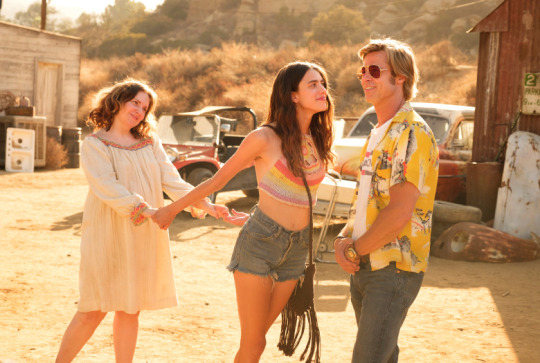
Rick’s bread and butter is now guest-starring on various TV shows in which he plays the heavy and gets his ass kicked by the show’s star at the end of the episode. Rick is a boozy, bloated hot mess of a man who’s prone to crying. A lot. His first burst of tears in the film is at the Musso & Frank parking lot, after an agent gives Rick a harsh dose of reality regarding the state of his career. Cliff, always keeping his cool, gives Rick his sunglasses and says, “Don’t cry in front of the Mexicans.” Remember — this is a western. Anyway, if Cliff fills the role of macho, gives no fucks, murderous outlaw, Rick is the contrasting “modern man” or, to use a western term, “tenderfoot”. The film begins with a behind the scenes segment for Rick’s old show Bounty Law. In it an interviewer talks to Rick and Cliff about what a stuntman does. During the interview there’s a quip about Cliff carrying Rick’s load. So right out of the gate, QT brings our attention to the idea that Cliff is the real deal and Rick’s the actor playing a role. This notion is repeated throughout the film (even one of the Manson Girls, “Pussy”, makes reference to Cliff being more authentic because he’s a stuntman rather than an actor). Regardless of whether Cliff murdered his wife or not, he’s an ex military man and war hero, so obviously he’s killed people before. So in addition to taking falls and performing dangerous stunts for Rick, he’s more of a bona fide western anti hero than Rick ever could be. Fittingly, while Cliff and the Manson Family black hats are sizing each other up at Spahn Ranch, Rick is busy acting in a TV western. And Rick keeps crying. A lot. He even cries in front of a little girl who simultaneously coddles and reprimands him. No doubt, Cliff would view this as potentially worse than crying in front of Mexicans. But Rick can’t help himself. He’s both a man of his time and out of time. He can’t roll with the hippies and spaghetti westerns but he’d never last a day in Cliff’s shoes let alone the wild frontier. Even at the end, in which Rick finally gets the chance to become an avenging hero (involving possibly the greatest payoff in cinematic history) if one steps back and thinks of the climactic set-piece, Rick is merely stepping in at the end to grab all the glory after Cliff and his wonderful dog Brandy did most of the heavy lifting. Thus Cliff is yet again carrying Rick’s load.
But this doesn’t mean Rick doesn’t have a victory. He does. It just comes at the midpoint, and it’s the closest thing to a real-life victory in the film. When Rick shows up to play the heavy in the TV western, he’s reached his low-point. Like a different part of the anatomy going into ice-water in Raging Bull, Rick is submerging his face into ice-water in his trailer, struggling with a hangover and hopelessness. Making matters worse, the artsy director shows up and tells Rick he wants him to play a hippie-style outlaw with a fringe jacket, mustache and long hair. The only thing Rick does more than drink and cry is insult hippies. He’s living his worst nightmare as an actor. QT makes another one of his most interesting choices by showing the subsequent scenes from the TV show in the same film stock and style as the main narrative. Thus when juxtaposed to Cliff at Spahn Ranch, Rick’s battle with his growing irrelevance as an actor is given the same cinematic weight. This isn’t just a TV show within the movie — it is the movie! This battle or showdown is just as important as Cliff’s eventual showdown with the Manson Family. Rick struggles. He fucks up his lines. He comes totally unglued in his trailer. This looks like the end of the road for him as an actor. He eventually gets his shit together, embraces the role and goes for broke. It’s a credit to both QT as a filmmaker and Leo DiCaprio as an actor that the villain Rick plays in the TV show ends up being more intense and visceral than the one he played in the main narrative of Django Unchained. Rick’s chops as an actor are restored and he decides to go to Italy and star in spaghetti westerns. He learns to maximize his talent in order to roll with the times.

A protagonist who is at odds with changing times might seem regressive or even reactionary to some people today, but it’s also a hallmark of westerns, especially the westerns of the late 1960s and early 1970s. From Once Upon a Time in the West to Butch Cassidy and the Sundance Kid, an impending future of railroads and industrialization is always treated with uneasiness by the heroes. These changing times aren’t going to include them. Their wild and free ways will soon come to an end. Nowhere is this theme most prominent than in the work of Sam Peckinpah. In many of his westerns, The Wild Bunch, The Ballad of Cable Hogue, Pat Garrett and Billy the Kid, the heroes are viewed as endangered creatures who are all too aware of their fate. The character of Cable Hogue even meets his end when a motor car rolls over him. He’s killed by the modern age! Another Peckinpah film from this era, Junior Bonner, is set in 1972 Arizona but can also be considered a western (creating a template for QT’s western that’s not set in the canonical “Old West”). The protagonist and title character is an aging rodeo star (brilliantly played by Steve McQueen, who perhaps not so coincidentally also appears in QT’s film). In Peckinpah’s film, Junior has lost his edge and returns home to take a breather and maybe get his chops back. His struggle is not unlike Rick Dalton’s. They’re both aging entertainers and they both fear they’re washed-up. And as with all of Peckinpah’s westerns, encroaching progress is a threat to Junior’s simple cowboy ways. All of these above mentioned westerns are filled with a bittersweet quality; a nostalgic snapshot that’s destined to become yellow and brittle. The power of myths is they suggest immortality for our heroes.They might be long gone but they live through these tales. Whether’s it’s the Old West of outlaws in dusty little towns or the Old West of ’69 Hollywood, people once lived in these places and they lived vibrant, foolhardy and sometimes dangerous lives. Maybe they didn’t live or die exactly as the tale accounts, but they did indeed live and they did indeed die.
In his film QT references another “man out of time” western: The Life and Times of Judge Roy Bean. Written by John Milius, directed by John Huston and starring Paul Newman, the film is a highly-fictionalized account of the life of Judge Roy Bean. At the climax an elderly Roy Bean reemerges from a self-imposed exile to have a showdown with businessmen who have surrounded his beloved town with oil rigs. When his enemies ask who he is, Roy Bean shouts “Justice, you sons of bitches!” This is immediately followed by a shootout in which Roy defeats his foes, blows up the surrounding oil rigs and goes out in a blaze of glory. In real life Roy Bean died in his bed after a heavy bout of drinking. What’s most interesting is how QT referenced The Life and Times of Judge Roy Bean. After the climax of Once Upon A Time… In Hollywood there’s a triumphant but wistful epilogue in which one of our heroes is faced with a future that we all know is a fantasy. Over this scene is an evocative piece of music that sounds like it’s from a fairytale and it plays over the end credits. The piece of music is entitled “Miss Lillie Langtry” and it’s the main theme from The Life and Times of Judge Roy Bean. Lillie Langtry was a British-American socialite Roy Bean was enamored with and he even went so far to name the saloon in his town after her. “Miss Lille Langtry” plays over the end credits of Once Upon a Time… In Hollywood and the opening credits of The Life and Times of Judge Roy Bean. But before the credits in Roy Bean we see written in storybook fashion:
“Near the turn of the last century the Pecos River marked the boundaries of civilization in western Texas. West of the Pecos there was no law, no order, and only bad men and rattlesnakes lived there.
…Maybe this isn’t the way it was… it’s the way it should be.”
With Once Upon a Time… In Hollywood, Quentin Tarantino pays homage to a socialite/actress who was tragically murdered before her time and two endangered heroes—one an outlaw stuntman, the other an entertainer—neither of who existed but men like them did. For two hours and forty-five minutes, the onward march of tragedy and time is defeated through a spirited, Old West mix of bravado and audacity. Maybe it’s not the way it was…
But it’s the way it should be.
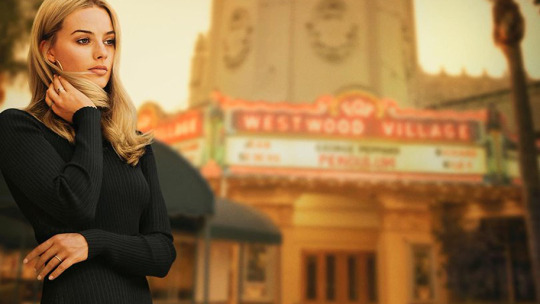
41 notes
·
View notes
Note
"#just because you have a bias about certain socioeconomic groups which tend to listen to country doesn't mean" // Yup. I tend to side-eye folks who are like "I like all kinds of music except country and [Insert a genre of music usually associated with Black creators like rap and hip hop]" You're not slick, ppl. I know what you're saying.
^^^^^^^^^ You hit the nail on the head.
It’s racial bias. It’s socioeconomic bias. It’s bias against people groups who have less respect and say in society.
From my tags on this post:
#don’t get me started on a long rant of the progressive side of country music and what’s been progressive FOR DECADES#from times near its BEGINNInGS#through the modern age#just because you have a bias about certain socioeconomic groups which tend to listen to country doesn’t mean#that that’s actually what the genre is or who the artists are#I could go for a LONNNNG time about this#a LONG time#some of the best protest songs I know of today’s current political situation#are country#or have like ya’ll forgotten about the folk revival#of the 1960s#or…#gahghfnfddhgnghfngh#I AM GAY AND I LISTEN TO COUNTRY#NYEH!!!!
Now. I understand disinterest in a genre because it’s not your aesthetic, but when people express their feelings for country, R&B, hip-hop, etc. …the dialogue isn’t casual “It’s not my thing.” The dialogue is a hateful, passionate retaliation.
Other genres aren’t treated like this. It’s normalized and encouraged to hate on country and rap. These genres are systematically treated with less respect and that disrespect culturally arose because these genres are associated with less-respected demographics.
(Country music is associated with people of low socioeconomic status, for people who aren’t explicitly aware.)
Anecdotally: I’ve caught something interesting about anti-country music sentiment. Many people tell me they can’t stand the “twang.” Half the time, I’ve noticed that their internalized definition of “twang” isn’t the vocal technique; it’s that they can’t stand the presence of a Southern accent. And hooboy does that have TONS of sociocultural bias issues. As a linguist, I’ve read endless sociolinguistic studies about how Southern dialects are treated as “lesser,” and how speakers of the dialect are automatically judged to be less intelligent, etc. It’s not good, folks.
Sometimes, to help friends get out of their anti-country mindset, I’ve “tricked” them into liking country. See, genres like bluegrass grew closely out of Scots-Irish folk music. Often, we’re playing the same tunes on both sides of the Atlantic. So I play a few instrumentals, my friend goes, “Oh! I love Celtic music
The biases against those demographics color how people view the music. There’s endless things that can be said about hip-hop bias, holy shit. I won’t focus on that today because I don’t believe I am qualified to be a spokesman. Someone who understands that genre better, and other genres associated with the African-American community, and is African-American, would be a better human to listen to than me. I defer to their knowledge and experience. It’s hella important to understand what bias has been reflected against those genres.
But there’s just as much bias against country music, against another demographic. And I’ve found it wild how it gets treated on places like tumblr, which wants to stand up for underprivileged groups, but somewhat inaccurately associates country music as “anti-gay conservative evil white person music” rather than music of people historically of lower socioeconomic status.
Yes, some of the demographic that listens to country music or plays country music are bad apples. But like… thinking the music is JUST THAT is a huge disservice to what country actually is and who the music artists actually are.
The history of country music is one giant collaborative melting pot of people from many different cultural backgrounds. Broad West African influence. Mexican influence. Italian influence. German influence. Scots-Irish influence. Cherokee influence. More. Early record labels like OKEH foolishly separated “hillbilly music” (presumably white folk music) from “rhythm and blues” (presumably Black folk music) without understanding the constant racial, demographic, regional, and cultural cross-pollination that occurred between the musicians from country music’s origins. And while there ARE certain issues in country music’s past and present, and we can’t let those issues go forgotten, that’s far from the whole story. We shouldn’t romanticize issues, but we should acknowledge that this music genre has given us major strides too.
Country music is the banjo, brought from Africa, combined with the mandolin, brought from Italy, combined with the fiddle, brought from Ireland, combined with the guitar and the dobro and the accordion and the upright bass and the electric guitar and the electric bass and whatever instruments you want to put in there.
Country music is African-American musicians like DeFord Bailey, the first radio star ever introduced on the Grand Ole Opry (THE most revered country music hub out there), blues harmonica performer, playing to crowds decades before segregation was de-legalized. He toured with white Opry musicians who treated him as one of their own. It’s soul music genre pioneer Ray Charles producing a studio album entirely dedicated to country music hits like “Hey Good Lookin’” from Hank Williams. It’s country star Charley Pride, who despite the racism against him in the 1960s rose to fame and made audiences fall in love with his beautiful voice. It’s the African-American musicians who inspired many commercial country stars, like Arnold Shultz influencing Bill Monroe and the railroad workers inspiring Jimmie Rodgers.
Country music is stars like Johnny Rodriguez and Rick Treviño, singing country music in Spanish, and using obvious Latin flavors in the genre.
Country music is filled with badass women like the ladies who STARTED THE GENRE ROLLING IN THE FIRST PLACE, Sara Carter and Mother Maybelle Carter (whose guitar style is hugely influential to this day) and Maybelle’s daughters Helen, June, and Anita; the first female music manager in the music industry, Louise Scruggs; songwriters like Felice Bryant and Loretta Lynn; the most awarded female artist in Grammy history Alison Krauss; and powerhouses like Dolly Parton who stepped out of an over-controlling entertainer’s shadow to become a badass in all things like supporting the LGBTQ community, contributing to pro-transgender films ahead of their time, and starring in sex worker positive productions like “The Best Little Whorehouse in Texas.”
Country music is filled with activism. Johnny Cash showed a heart for those forgotten by society. He toured many times in prisons. Cash especially was an activist for Native American rights. He toured with Native American songwriters so audiences could hear their own words (I’ve been trying to find names but I’m having difficulties re-finding that information, so my apologies for not giving names of those who deserve to be mentioned). Cash released albums dedicated to exposing past and present injustices against the Native American people. He went on tours specifically to Native American reservations.
And it’s not just Johnny Cash!
Country music is many stars from the Grand Ole Opry banding together to release AIDS benefit albums - big names like Alison Krauss, Willie Nelson, Marty Stuart, aurgh I’m too lazy to write them all, PEOPLE.
Country music is Earl Scruggs and his sons playing at the Vietnam War Protests.
Country music is tied in with the fucking folk revival of the 1960s, which was deep in left-wing activism and the Civil Rights Movement. Folk singers sang traditional Appalachian and English ballads alongside their own compositions, topical pieces protesting the current political situation. You can call one artist “folk” or “Americana” and another one “country,” but the influences were intermingling, and it’s why we have Bob Dylan and Woody Guthrie and Joan Baez and John Denver and Pete Seeger owning a banjo that says, “This machine surrounds hate and forces it to surrender.”
Dammit, I have a full BOOK that discusses country music and political ties.
There’s another book out there, which I haven’t read, that discusses the relationship between country music and the queer community, and how bias against country music is NOT as reflective of the listening demographic as we stereotype. I’ll take the word of one reviewer who said:
[Nadine Hubbs] explores country music lyrics, presenting a great deal of evidence suggesting that working class America is not inherently homophobic, but that as middle class cultural taste has changed to include formal acceptance of homosexuality, this process has included pinning homophobic ideas on the working class.
Country music is lyrics like this 1975 controversial song “The Pill”:
You wined me and dined meWhen I was your girlPromised if I’d be your wifeYou’d show me the worldBut all I’ve seen of this old worldIs a bed and a doctor billI’m tearing down your brooder house‘Cause now I’ve got the pillAll these years I’ve stayed at homeWhile you had all your funAnd every year that’s gone byAnother baby’s comeThere’s a-gonna be some changes madeRight here on nursery hillYou’ve set this chicken your last time‘Cause now I’ve got the pill
Country music is lyrics like this 2013 song that feels as relevant than ever:
If crooks are in charge, should we let them pick our pockets?If we don’t want trouble, should we not try to stop it?We could just sink into the quicksand slavery we’re born inBut fighting endless wars for greedy liars is getting pretty boringThey think they got us trained, so we’ll think we’re living freeIf we got time and money for junk food and TVBut it’s plain honest people never stand a chance of winning electionsThey just let us pick which liars take our rights away for our own protectionThe corporate propaganda paralyzes us with fearDestroying our ability to trustFear keeps us fighting with each other over scrapsStarving to death in the dustOrganized religion really helps you submitBut the meek are inheriting the short end of the stickFear surrounds compassion like a layer of moldAnd weakens our defenses so we’re too weak to be boldLife could be heaven, but this corrupted systemTakes away our rights, expects us not to miss themThe middle class is shrinking while the lower class growsIf we don’t wake up soon, we’ll have no class left to lose
Country music is Christians themselves criticizing the hypocritical Evangelical culture in the USA for the bullshit hatefulness stewing inside it:
Every house has got a Bible and a loaded gunWe got preachers and politicians‘Round here it’s kinda hard to tell which oneIs gonna do more talkin’ with a crooked tongue
And as that one post I just reblogged shows, there’s MANY queer country musicians out there producing explicitly pro-LGBTQ+ music.
I’m brushing over so much. I’m sorry for the simplification that goes with me doing such a pass-by overview. I’m sorry I’m focusing more on history than the present (I know more about the 1920s-1960s eras, so I’m talking from my strong suit). I hope the information is at least strong enough to get my point across.
There are definitely listeners and artists in country music who are uber-conservative white hateful Christians. Yes. I know why country music gets associated with that. But.
Country music is not ABOUT this uber-conservative white hateful Christian side. The genre is not “polluted”. It is a thousand voices from a thousand perspectives of people from many backgrounds and beliefs. And many of those thousand voices are old traditional songs that came from Black communities, or were composed by Mexican-Americans, or were performed by folk artists as part of a protest for equal rights.
(Note: I’m *NOT* saying all Christians are bad or that different political angles don’t have merits. I’m Christian myself! And you don’t know my political party. I’m just trying to get the point across that country music isn’t ENTRENCHED in one questionable demographic.)
You don’t have to like country music. It doesn’t have to be your aesthetic. But if you find it fun to get in on society’s popular country hate roasting… please rethink this. The reason country music has been hated from its roots is because it’s associated with the socioeconomically disadvantaged.
I’m with you 100%, Ashley. When someone says they like all genres “except country music and rap,” I get a little leery. I used to be one of those people when I was younger. I had to learn to grow past those biases. But once I did, I realized there was so much I was hating on that I didn’t understand. Now, I hope I can help people overcome their own biases, such as ones they don’t realize they’ve had - for things like music.
Hi ya’lls. I’m queer and I love country.
P.S. If anyone has anything to add or correct, please feel free to add on! I’m doing my best but I do not know everything and would be happy to learn more, too!
#ashleybenlove#long post#music#non-dragons#that banjo business#analysis#my analysis#music analysis#note that there's a version of this post where it's been reblogged and added on and I chat about Elvis and stuff#but the starting text is from an earlier version of this post#where I had a number of typos#XD I know they're there but I can't change those hahahahaha#I changed them here#reblog whichever version you desire though of course!#but just so you know there's a few minor factual typos in the non-edited version#I was hahaha so excited that I typed fast when I wrote it XD
90 notes
·
View notes
Text
— The Economist
America Is Becoming Less Racist But More Divided By Racism
How it confronts ethnic divisions matters to multiracial democracies everywhere
Editor’s note: Twelve months on from the killing of George Floyd, The Economist is publishing a series of articles, films, podcasts, data visualisations and guest contributions on the theme of race in America. We begin our coverage with the publication of a special report by our US editor.

When derek chauvin knelt on George Floyd’s neck at the corner of 38th and Chicago on a warm, cloudy night in Minneapolis a year ago, there was little unusual about the scene. Not for Mr Floyd, who had been arrested before. Not for Mr Chauvin, who had been disciplined twice for misconduct and had 17 complaints against him. And not for America, where police kill over 1,000 people a year—three-quarters of them, unlike Mr Floyd, armed. Sorted by race, more whites die like this than any other group. But black Americans (13% of the population) are over twice as likely to be killed by the police. In this, as in many other ways, African-American men who are poor are at the bottom of the heap. To find someone else’s knee on their throat is, sadly, unsurprising.
The reaction to this murder was a shock, though. Mr Floyd’s death, which was filmed by a bystander, sparked the biggest civil-rights protests in America’s history. Some 20m Americans took part, flouting covid-19 restrictions. There were 7,750 protests in over 2,440 places, in every state. Beyond America, Black Lives Matter protests were staged in Brazil, France, Japan and New Zealand, among others. Companies around the world have been busily examining whether, through their hiring, buying and selling, they play a part in perpetuating racism. A year on, footballers in England’s Premier League, who play in a country where just 3% of the population is black, still take a knee before games, a gesture that is broadcast to 188 countries. Thus America’s struggle to defeat racism shapes other societies too.
The image of a white-skinned man, wearing a uniform that reads “To Protect With Courage, To Serve With Compassion”, kneeling on the neck of a dark-skinned man evokes the worst of America’s past so strongly that there seems little doubt what killed Mr Floyd. Police violence was part of it, as was poverty. But the real culprit was racism. The jury that on April 21st, after a short deliberation, convicted Mr Chauvin of murder seemed to agree.
For many African-Americans, watching a constant stream of death videos, combined with the country’s still racialised politics, feels like “drowning in the news”, according to Eddie Glaude of Princeton University. “I never really had faith in the United States in the strongest sense of the word,” he writes in “Begin Again”, a book about James Baldwin published after the protests. “I hoped that one day white people here would finally leave behind the belief that they mattered more. But what do you do when this glimmer of hope fades, and you are left with the belief that white people will never change—that the country, no matter what we do, will remain basically the same?”
Drowning in the news makes it easy to miss the profound improvements in racial attitudes in America that have taken place just in the past generation, a change reflected in the scale of outrage about Mr Floyd’s murder (and the rare conviction of a police officer for it). When Bill Clinton became president, a majority of Americans disapproved of interracial marriages. Cynthia Duncan, a sociologist who worked in the Mississippi Delta during the 1990s, observed that “when blacks describe a white who does not seem racist, they say, ‘she treated me like a person’, repeating the phrase to emphasise how rare and remarkable the encounter had been.” And this was 30 years after the passage of the Civil Rights Act and the Voting Rights Act.
Now another 30 years have passed, 90% of Americans approve of mixed-race marriage. Measuring changes in racial attitudes is fraught, because as people become more conscious that prejudices they hold are no longer widely accepted, they may become more reluctant to admit them. Yet changes in behaviour suggest the shift is real, not just what people believe they should say to pollsters. More than 10% of babies born in America are now mixed-race. Research drawing on data from dating apps suggests that one in three couples who meet online are too. This is part of a demographic transformation. Since 2019, white, non-Hispanic children have been in a minority in America.
African-Americans, whose opinion on the matter ought to count, think there is less racial discrimination than there was. In 1985 three-quarters of African-Americans thought that the fact that whites had better jobs, better wages and better houses was mainly down to discrimination. By 2012, less than half thought this was the case (a share that rose after Donald Trump was elected). And yet among the general population, racism is rated a more important issue in Gallup’s polling than health care, poverty, crime, the environment or national security.
How can the country have become both less racist and yet more worried that the prevalence of racism is growing? And if racism is indeed declining, why do so many African-Americans still seem to be so stuck?
Racism and awareness of racism are related but distinct. Sometimes they move in opposite directions. In the old South, where people were denied the right to vote for a century after the abolition of slavery because of the colour of their skin, it was a cliché for whites to claim not only that they were not racist but also that they understood African-Americans better than did those progressives in northern cities. Similarly, many whites who may have been unaware of racism when it was far more prevalent are more conscious of it now, as the protests after Mr Floyd’s murder showed.
Guess Who’s Coming to Dinner
Since Barack Obama’s election in 2008, left-leaning white Americans have undergone what Matt Yglesias, a journalist, dubbed a Great Awokening on race. R.T. Rybak, a former mayor of Minneapolis, calls it “reality therapy”. The Trump-powered birther movement, which asserted that the country’s first black president was a foreigner, the well-publicised killings by police of Freddie Gray in Baltimore and Eric Garner in New York, a mass-shooting at a black church in South Carolina: all these made people realise that racism was more widespread than they had thought. And then Mr Trump was elected president.
The share of whites who thought black Americans had worse jobs, lower incomes and crummier houses because of discrimination shot up. The share of whites who thought government should give no special treatment to black Americans shrank by a third in six years. In the year Mr Obama was elected, half of white Americans thought racial differences in incomes and wealth were caused mainly by lack of will. By 2018 that share had fallen by 15 points. Now black respondents are slightly more likely to blame African-Americans for their circumstances than whites are.
Understanding race and racism in American means grasping a set of contradictions. Despair at the slowness of improvement can be a sign of progress. Racial attitudes have changed, but black and white Americans are as segregated as they were in the era of James Brown and John Denver. As a true multiracial democracy, America has existed for less than the span of a lifetime. It is home to the biggest black middle class in the world, but also to a large black underclass that has made little economic progress since the 1960s. Writing about race is normally shorthand for writing about African-Americans, Hispanics or Asians. But as they are becoming more aware, whites are a race too.
In a multiracial democracy, emphasising race can be a recipe for zero-sum competition for public resources. Partly for this reason, the French government largely bans collection of data on race. But ducking the issue can mean that racial inequality persists. In 1967, another time of despair at racist violence, James Baldwin wrote that he wanted black Americans “to do something unprecedented: to create ourselves without finding it necessary to create an enemy.” America’s task now is to make multiracial politics work without setting groups against each other. No other big, rich democracy is as multiracial, but plenty will be one day. So America is once again a testing-ground for a great democratic experiment. For it to work, the first thing to understand is why it was Mr Chauvin’s knee that was on Mr Floyd’s throat, and not the other way around.■

Reparations Alone Will Not Heal America’s Racial Divides
And practical questions over how they would work remain formidable
Editor’s note: Twelve months on from the killing of George Floyd, The Economist is publishing a series of articles, films, podcasts, data visualisations and guest contributions on the theme of race in America. Among them is a piece offering a different view on reparations.

Drive south-east from Minneapolis for an hour and you come to the Prairie Island Indian reservation, home to one of Minnesota’s 11 federally recognised Native American tribes. The federal government built a dam in the 1930s, flooding the place. In the 1970s it allowed the construction of a nuclear-power plant. Despite these blots, on a rainy Wednesday afternoon Prairie Island is full of visitors. People have come from Minnesota and Wisconsin to play the slot machines and blackjack and poker tables at the Treasure Island casino, operated by the tribe.
The Native American story runs through Minnesota. The largest mass-execution in American history took place at Mankato, south-west of Minneapolis, when 38 Dakota tribesmen were hanged in 1862. Today a small memorial garden in Mankato has a bench inscribed “forgive everyone everything”. Native Americans also receive reparations. In most states they take the form of land, though it is often useless for farming or property development. But federally recognised tribes are not subject to state laws against casino gambling. So Native Americans with reservations near cities have a near monopoly over a lucrative industry. Yet gambling has been only a partial success. Native Americans still have lower life expectancy and educational attainment than any other group.
The federal government has made some attempts similarly to recompense African-Americans, but these efforts were either ineffective or withdrawn after meeting too much opposition. The unpopular attempt to redistribute land in the South after the abolition of slavery was soon suspended. From the 1960s, various schemes were tried to favour minority-owned businesses in government contracting. They have not made much difference. For private businesses, reserving jobs for people of one race is illegal. Affirmative action, which gives African-Americans favourable treatment in university admissions and federal contracting, is being litigated away, mainly because it tends to discriminate against Asian-Americans.
Yet the idea of paying reparations for slavery has moved from the fringe since 1989, when John Conyers, a Michigan congressman, first introduced a reparations bill in Congress. Mr Conyers persisted in every Congress until he retired. It was not until Ta-Nehisi Coates wrote an article in the Atlantic in 2014 that the idea became more mainstream among Democrats. In the party’s 2020 primary the leading contenders all supported reparations. Since he moved into the White House, Joe Biden has announced his support for studying the issue, which looks like a case of a politician signalling support for an idea without actually having to do anything to advance it.
Even if a reparations bill passed the House, which is unlikely, it would have no chance in the Senate. The idea, which is popular among upscale Democrats, has the support of only half of African-Americans. Practical questions, such as who should receive any payment and who should be obliged to contribute, remain formidable. The political backlash against a party that made a determined push for reparations from the federal government would be fierce. This has not stopped some towns and institutions from trying. Asheville in North Carolina, Evanston in Illinois and Georgetown University have all taken steps in this direction by acknowledging a moral responsibility for slavery and segregation.
Initiatives like this may be worthy, but they will not deal with disparities in income, wealth, education and housing. The reparations movement is driven by arguments about justice, but the economic arguments for it are weak. The bulk of the black-white wealth gap is accounted for not because white Americans have inherited far more than black Americans. It is caused by African-Americans having lower incomes which, compounded over time, lead to less wealth. A one-off reparations payment would not fix that.
Race in America
A year ago George Floyd’s murder gave rise to a movement to end racial disparities. How can that be done?
Editor’s note: Twelve months on from the killing of George Floyd, The Economist is publishing a series of articles, films, podcasts, data visualisations and guest contributions on the theme of race in America. To see them visit our hub.

When george floyd was killed by Derek Chauvin a year ago, the sense of injustice was tinged with despair. Why, many Americans asked, is this still happening in our country? Why, many foreigners asked, does the story of race in America never seem to change? Except this time was different. Mr Floyd’s death prompted the biggest civil-rights protests in American history. Mr Chauvin, unusually, was convicted of murder. And institutions in America and beyond looked at themselves in a different light. Something needed to change. But what exactly?
The Biden administration and the Democratic Party have made reducing racial disparities an organising principle of government. That sounds straightforward, but it is not. Despite the gains in legal and political rights made by African-Americans since the civil-rights era, measures of relative poverty and black-white segregation have barely moved for half a century. Tackling enduring injustices requires clear thinking about their causes.
Most racial disparities come about when three things collide: secular economic trends, the aftershocks of slavery and segregation and present-day bigotry and racism. The first two are usually the biggest causes of bad outcomes for African-Americans, but the third—racism today—gets most of the attention.
This is backwards. Covid-19 has killed African-Americans at higher rates than whites or Asian-Americans. The causes are still unclear, but the blame is unlikely to lie with racist doctors, nurses and insurers. Instead, for reasons that include past racism and present-day poverty, African-Americans are more likely to suffer from pre-existing conditions and to have to work outside the safety of their homes, and less likely to have health insurance.
Racism remains a curse in America, though it is less widespread than 30 years ago, let alone in the civil-rights era. But, since it is lodged in bigoted minds, rooting it out is largely beyond the power of any government. Poverty and the structural legacy of racism in institutions are different. Take the Biden administration’s new child tax credit, which looks likely to reduce child poverty by 40%. Because African-Americans are disproportionately poor, this race-neutral policy should halve the number of poor black children.
Given that the problem is racial disparities, why not target help directly at African-Americans instead? One reason is practical. People are more likely to support measures that they themselves might benefit from. The child tax credit enjoys broad backing. Were it designed to benefit only one group, support for it would plummet. Any administration that targeted policies on African-Americans alone—using, say, reparations and more affirmative action—would soon be out of power.
By contrast, policies that help all poor Americans are popular and effective. Since the Affordable Care Act in 2010, 39 states have expanded the availability of Medicaid, the health-insurance programme for low-income Americans. As a result, the share of uninsured African-Americans has fallen by 40% over a decade. A government that wanted to spend more could provide baby bonds for poor Americans and vouchers to move out of areas of concentrated poverty. A government less inclined to spend could relax zoning rules, making it easier to build apartments near good schools. None of these policies is race-based, but all of them would greatly reduce the disparity of outcomes.
These broad-based policies are not just practical, but moral too. Racial injustice is particularly searing in America because of the horrors of slavery, the violence of Reconstruction and the institutionalised racism of Jim Crow. African-Americans have had legal rights to vote, to marry whom they want and to live where they choose for just the span of a single lifetime.
Yet not all African-Americans need help. Despite the disadvantages they face, the country’s large, thriving black middle class is often overlooked in talk of race in America. Moreover, people who are not black also face prejudice and inherited disadvantages. How much better if government policy lessens Latino, Native American, Asian and white poverty, too. To deny aid to people in the name of racial justice would be perverse.
What is true of poverty is also true of police reform. Here there have been notable advances in the past year, as cities and states have trimmed “qualified immunity”, a broad defence available to police officers who kill civilians. Police killings of unarmed young men are often presented as overwhelmingly a racial issue, because police officers kill a disproportionate number of African-Americans. Even before Mr Floyd’s murder, the killings of Michael Brown in Ferguson, Freddie Gray in Baltimore, Eric Garner in New York and Breonna Taylor in Louisville rightly brought attention to this fact.
Yet police officers kill Americans of all races more often than they should. Separating the many police shootings that are justified from those that should never have happened ought to be a national priority. This would be easier if policing was understood as a civil-rights issue affecting all Americans.
A race-neutral approach will not always work. To create more diverse organisations, companies, all too often run by white people, need to pay more attention to race in hiring. Unless elite universities take positive steps, their intake will not be representative of the country. But where practical, a race-neutral approach to opening up opportunities is more likely to help America—and especially its African-American citizens.
One year on from a terrible injustice, the United States is confronting not just its past but its future, too. In the next 50 years it will be the first big, rich country where no single racial group, ethnicity or religious denomination will be in the majority. The more politicians exploit the tribal fears of some voters, the more turbulent this transition will be. The Republican Party’s enthusiasm for rewriting voting rules in states such as Arizona and Georgia shows how democracy could suffer.
Yet America also has the chance to set an example to other countries. A smooth transition is more likely if politics is not set up as a fight for resources between groups that people are born into and cannot leave. Instead, the country can make common cause to shrink enduring racial disparities while helping all Americans leave injustices behind. That must be the aim. ■
1 note
·
View note
Text
Dear Mother, Father, Legal Parent and/or Guardian,
In New Zealand, there was a court case that resulted in the parents losing custody of their nine year old child. It wasn’t because they were abusive or starving their child in a basement as they dined like kings.
They named her “Talula Does The Hula From Hawaii”.
Go ahead, laugh for a minute.
Done? Nice.
They allowed Talula Does The Hula From Hawaii (a New Zealander, not from Hawaii even) to have a new name, as the judge in the court case claimed that such a name would give a child a social disability in life, and it had. Afraid she would get bullied, she introduced herself as K to her friends and classes. The judge in the case criticized the parents and their belief that Talula Does The Hula From Hawaii was actually a good name.
Parents should take precaution when choosing unique names for their children as names hold a very strong weight on a person's life, what they do, and how they are perceived in society.
In a test that Marianne Bertrand and Sendhil Mullainathan did, sending out 50,000 resumes in response to job offers from Chicago and Boston newspapers, half of the resumes had names from stereotypical white people, while others had the names of stereotypical African Americans. They found that white-sounding names had 50% higher chance of getting called back from the job than people with black sounding names.
Now this isn't a way of saying every boy should be called John Johnson and every girl Jane Jameson. That is ridiculous and wrong in itself, but it should be noted that internal racism in businesses and employers still exists. But the studies and experiments presented here aren't meant to deter you from how you name your child; that study was in 2003 and the times have very much changed towards minorities in the world. In fact, name uniformity has gone down in America. While in the 1950s only 5% of children had names not in the top 1,000 names, now 27% of children aren’t names in the top 1,000. Which is great seeing that everyone I meet won't be having the same name anymore.
But research has shown that these names that parents give to their children will affect them into their adulthood, with one in five parents (in a British study 10 years ago, consisting of 3,000 parents) regretting the name they give to their child either for being too weird or wishing they had named their child something different. With boys being named something feminine, there was research of potential behavioral problems later in life more so than girls given boy names. Those who have unusual spellings are more likely to have a hardship in life as well.
Names have also been shown to have a social effect on people’s perception of the child and their family.
David Figlio, Dean of Northwestern University in Illinois, noted "Kids who have names [that] from a linguistic perspective are likely to be given by poorly educated parents, end up being treated differently. They do worse in school and are less likely to be recommended for gifted [classes] and more likely to be classified as learning disabled."
With funky names, it is possible to be perceived as less achieving in your classes, even if you are one of the more capable people. People, as much as the phrase 'don't judge a book by its cover' teaches, subconsciously judge others immediately based on what they see. How someone smells, dresses, or speaks are subconsciously added into one's thoughts on a person.
It doesn't help that names in general are very tied to a person's self-esteem.
It's been shown in research that when given letters in the alphabet, those with high self-esteem would more likely pick letters that are associated with their name, shown by Jean Twenge of San Diego State University.
With people picking more unusual names this era, baby naming books have decided to recommend switching up letters in common names, giving it more 'flair'. However, this might not be so wise for one to do. Research shows that those with spelling variations of common names may become behind on spelling and reading.
Not only that, but it can prove to hold some internal doubt, with people looking at the name deviant and questioning the spelling, which can greatly hurt someone's confidence very much.
Of course, there are some parents whose personality and their thought process show when naming the child. Giving a child an unusual name often gives the idea that they want their child to be different and stand out, while other parents who give their child a common name can have a multitude of reasons.
But either way, one must be very careful when giving their child something that will affect them in the long run.
Sincerely from,
Number 16 Bus Shelter
1 note
·
View note
Text
A lot of people are debating whether or not kpop idols should be speaking out about BLM and if black fans have a right to be angry if idols stay silent — which they do. As a white woman, I have no right or place to decide how these fans should feel or respond, but for those saying it doesn’t matter because kpop has nothing to do with BLM, let me give you a little history lesson on kpop and the genres of music it is heavily influenced by!
Korean pop music, gayo, or kpop, however you choose to refer to it as, can be traced back to 1885 when an American missionary began teaching American and British songs at schools. More western culture was introduced after the Korean War, when U.S. troops remained in South Korea. Modern kpop began to evolved in the 1990s when Korean pop musicals began to incorporate Europop and popular American music styles. It does have roots in traditional Korean music, however it is actually heavily influenced by western music and culture! Some of the biggest genres influences on kpop include rock, jazz, gospel, hip hop, R&B, reggae, electronic dance, experimental, folk, country and classical music.
For the sake of this, I’m going to predominantly be focusing on jazz, R&B, rock, and hop hip.
Jazz originated in black communities in New Orleans in the late 19th century and has origins in blues, ragtime, spirituals, classical, and West African music. The 1920s was known as the Jazz Age, and jazz is considered by many to be America’s classical music and one of America’s original art forms. It has many derivative forms, including free jazz, hard bop, modal jazz, smooth jazz, Latin and Afro-Cuban Jazz. New Orleans jazz specifically blends sounds from brass-band marches, French quadrilles, biguine, ragtime, and blues. Swing was also a very popular derivative of jazz in the 1930s with musicians like Cab Calloway, Duke Ellington, Earl Hines, Jimmie Lunceford, and Count Basie.
Minnie the Moocher (Theme Song) by Cab Calloway
In A Sentimental Mood by Duke Ellington and John Coltrane
Weather Bird by Louis Armstrong and Earl Hines
Tain’t What You Do (It’s The Way That You Do It) by Jimmie Lunceford
Splanky by Count Basie
Rhythm and blues (R&B) developed in urban Black communities in the United States during the 1940s. Some of its stylistic origins are jazz, blues, spirituals, gospel, and boogie-woogie. Since the 1980s it shifted into a new style younger generations are currently most familiar with, referred to as contemporary R&B, which blends rhythm and blues with pop, soul, funk, disco, hip hop, and electronic music. Some of the most influential R&B artists are older artists like Prince, Stevie Wonder, Michael Jackson, Aretha Franklin, Whitney Houston, Chaka Khan, Beyoncé, and Mariah Carey to newer artists like Rihanna, Ne-Yo, and The Weeknd.
When Doves Cry by Prince
Superstition by Stevie Wonder
Man in the Mirror by Michael Jackson
Respect by Aretha Franklin
I Wanna Dance With Somebody (Who Loves Me) by Whitney Houston
I’m Every Woman by Chaka Khan
Partition by Beyoncé
Hero by Mariah Carey
Needed Me by Rhianna
So Sick by Ne-Yo
Blinding Lights by The Weeknd
Rock music originated in the United States in the late 1940s, and began as “rock and roll.” Rock and roll’s biggest influences are black musical genres, two of the biggest being blues and R&B. Blues originated in the Deep South in the 1870s from African musical traditions, spirituals, and African-American work songs (this is the white guilt way of saying what they actually are Slave Songs). Blues is arguably the most influential genre in modern western music as some of its derivative forms include rock, ragtime, R&B, jazz, and country. Some of the biggest rock and roll artists include Chuck Berry, Nat King Cole, the Crows, the Penguins, and the Turbans. Even Elvis Presley, the “King of Rock and Roll” would say some of his biggest influences were B. B. King, Arthur “Big Boy” Crudup, Ivory Joe Hunter, and Fats Domino, all Black musicians.
Johnny B. Good by Chuck Berry
L-O-V-E by Nat King Cole
Gee by The Crows
Earth Angel (You Will Be Mine) by The Penguins
I’ll Always Watch Over You by The Turbans
The Thrill is Gone by B.B. King and Tracy Chapman
That’s All Right by Arthur “Big Boy” Crudup
Since I Met You Baby by Ivory Joe Hunter
Ain’t That a Shame by Fats Domino
Finally, hip hop and rap music which developed by inner-city Black communities living in the Bronx, NYC, in the 1970s. Its origins are styles of funk, disco, electronic music, dub, R&B, reggae, dancehall, jazz, spoken and performance poetry, scat singing, and talking blues. Hip hop has four key stylistic elements: MCing/rapping, DJing/scratching turntables (records), breakdancing, and graffiti writing. Due to poverty and lack of acceptance outside of ghetto neighborhoods, however, hip hop did not officially get recorded for radio or television until 1979. Hip hop has derived and has many subgenres since the 70s and now includes freestyle rap, gangsta rap, hardcore hip hop, mumble rap, trap, experimental hip hop, and more. Some major influential artists include Public Enemy, Boogie Down Productions, LL Cool J, Ice-T, Dr. Dre, Snoop Dogg, Wu-Tang Clan, Notorious B.I.G., Lil Jon, Lil Wayne, Soulja Boy, B.o.B., Drake, Nicki Minaj, Kendrick Lamar, Childish Gambino, Chance the Rapper and so so so many more.
Fight The Power by Public Enemy
South Bronx by Boogie Down Productions
Mama Said Knock You Out by LL Cool J
Colors by Ice-T
Still D.R.E. by Dr. Dre and Snoop Dogg
Drop It Like It’s Hot by Snoop Dogg and Pharrell Williams
C.R.E.A.M. by Wu-Tang Clan
Hypnotize by Notorious B.I.G.
Snap Yo Fingers by Lil Jon, Youngbloodz, Sean Paul, and E-40
Scared of the Dark by Lil Wayne, Ty Dolla $ign, XXXTENTACION
Crank That (Soulja Boy) by Soulja Boy
So Good by B.o.B.
Started From the Bottom by Drake
Feeling Myself by Nicki Minaj and Beyoncé
HUMBLE. by Kendrick Lamar
This Is America by Childish Gambino
No Problem by Chance the Rapper, Lil Wayne, and 2 Chainz
There is nothing you can say to tell me there isn’t Black influence on kpop. BTS had a whole multi-episode show where they travel to LA to train under “hip-hop tutors” Coolio, the artist behind Gangsta’s Paradise, and Warren G, a g-funk producer. Haechan calls Michael Jackson his favorite artist and inspiration. Almost all kpop groups have a rap line who “shockingly” LIKE BLACK RAPPERS AND ARTISTS. And it isn’t unheard of for kpop idols / groups to support and promote fundraising and campaigns. I’m not here to attack kpop, I’m here to explain why people can be upset by their silence.
Gangsta’s Paradise by Coolio and L.V.
Regulate by Warren G and Nate Dogg
While I am aware many of idols’ / groups’ accounts are not run personally or by their management, the silence and lack of support can hurt. I can understand why black fans want to see their idols they have been supporting support them too, especially when those idols have been, in a sense, profiting off of their culture. I can understand why black fans want their idols to support them not getting murdered in the street by police who are supposed to protect them.
For anyone saying that “this is America’s problem” and “leave it to America to figure out,” World War II happened because Hitler was committing genocide on Jewish people and it took ALL of the Allies, not just anti-nazi Germans, to take down Hitler and the Axis powers. The police and the government are committing genocide on black people. Systematic racism is a disease that the world, not just America, needs to fight.
Silence doesn’t make you an ally, silence makes you an accomplice.
Here’s how you can help:
https://blacklivesmatters.carrd.co
https://moreblminfo.carrd.co
Thread of More Places to Donate
Thread of How White Allies Can Help
A List of Black Owned Fashion / Cosmetology / Skin Care Brands
Tips on How to Engage Conversation on BLM with Conservative / Racist / Bigoted / Homophobic Family
Donate. Sign Petitions. Text and Call Local Governments. Protest. Vote. Educate. Listen.
#music history#kpop#black artists#black influence#black musicians#text post#kpop text post#jazz#r&b#hip hop#rock#rap#blues#music#black influence on music
13 notes
·
View notes
Text
People, June 22
Cover: The Pride Issue -- Anderson Cooper and Baby Wyatt

Page 3: Chatter -- Wanda Sykes after consuming George Clooney's Casamigos liquor, Jessica Alba on giving her husband Cash Warren a quarantine haircut, Kristen Bell on having difficult conversations with her two young daughters, Taylor Swift on staying positive amid unplanned circumstances, Catherine Giudici Lowe on her Bachelor experience as a Filipina, Snoop Dogg on leading by example
Page 4: 5 Things We're Talking About This Week -- Mariah Carey surprises Schitt's Creek, Bruce Lee gets a kick-ass doc, Elmer Fudd gives up his gun, Barbie self-isolates, the NBA scores a comeback
Page 7: Contents

Page 9: Editor's Letter -- Welcome to Our Pride Issue
Page 14: StarTracks -- Stars Demand Justice -- Michael B. Jordan at a Black Lives Matter protest in Beverly Hills
Page 15: Jamie Foxx participated in a kneel-in outside San Francisco City Hall, Pink at a #Peaceful Protest, Alyal Shearer and Harry Styles at a march in West Hollywood, Halsey walked in a protest in Los Angeles
Page 16: More Stars Demand Justice -- Ellen Pompeo and T.R. Knight kneel in protest in West Hollywood, John Boyega delivered an impassioned speech at a protest in London, Alex Rodriguez and Jennifer Lopez marched down Hollywood Boulevard, Stephen Curry and wife Ayesha took a knee in Oakland
Page 17: Madonna and her kids Mercy James and David Banda marched in London, Henry Golding and wife Liv Lo hit the streets in Los Angeles, Machine Gun Kelly and Cara Delevingne and Travis Barker marched through Los Angeles, Nick Cannon joined protesters at the site of George Floyd's death in Minneapolis
Page 18: Miley Cyrus and Cody Simpson went on a hike with their dog Bo, Laura Dern matched her face covering to her outfit while walking her dog, Helen Hunt caught some waves on a bodyboard in Malibu
Page 21: Paris Hilton and boyfriend Carter Reum share a kiss during lunch in Malibu, Kerry Washington does yoga, Robin Wright and husband Clement Giraudet went for a bike ride, Christian Bale surfing in Los Angeles
Page 23: Scoop -- Meghan Markle's emotional plea
Page 24: Beyonce's empowering speech
Page 26: Heart Monitor -- Jordana Brewster and Andrew Form separated, Katherine Schwarzenegger Pratt and Chris Pratt happy anniversary, Gerard Butler and Morgan Brown going strong, Jared Leto and Valery Kaufman heating up
Page 28: Lea Michele under fire for past behavior, Ben Affleck and Ana de Armas speaking out and bonding with his kids
Page 31: Open House -- Kylie Jenner's starter mansion for sale for $3.599 million, Cameron Diaz's happy life as a mom
Page 33: Passages, Why I Care -- inspired by his Baha'i faith Penn Badgley is working to help immigrant women and girls find safety
Page 35: Stories to Make You Smile -- this costumed cat helps a town get curious about reading, a boomer father offer helpful Dadvice to millions
Page 37: People Picks -- The King of Staten Island
Page 38: Crossing Swords, RTJ4 from Run the Jewels, Q&A -- Adam Scott
Page 40: Da 5 Bloods, Mae West: Dirty Blonde, One to Watch -- Jake Manley
Page 41: Great documentaries about black lives -- I Am Not Your Negro, Quincy, 13th, What Happened Miss Simone?
Page 42: Books
Page 44: Cover Story -- Anderson Cooper and baby Wyatt -- This is a new level of love -- as a gay man the CNN anchor never imagined he could become a father but now he couldn't be happier or more grateful
Page 52: Caitlyn Jenner -- Happiness is the ultimate victory -- five years after very publicly transitioning the legendary gold medalist and now grandparent of 18 talks life, love and mistakes she's made but she has no regrets
Page 57: My Coming-Out Story -- 2020 marks the 50th anniversary of the Pride March. COVID-19 may have canceled the parades but LGBTQ Americans are still proud to share how they found love and acceptance -- Dominique Crenn
Page 58: Maria Bello, Jake Atlas
Page 59: Don Lemon
Page 60: Jeremy O. Harris
Page 61: Jaime Harker
Page 62: Hannah Gadsby, Noah Hepler
Page 63: The Trujillo family
Page 64: Protests, Pain and Officers Arrested -- seeking justice for George Floyd -- George Floyd is laid to rest as loved ones grieve and a mass movement for racial justice resolves to honor him with change
Page 67: Breonna Taylor killed by police in her own home
Page 68: Spike Lee -- We Must Keep Hope Alive -- the renowned filmmaker reflects on telling African-American stories onscreen, how brutal history has repeated itself and his dreams for a better future
Page 72: The Real’s Loni Love -- This is my American story -- the comedian gets candid about her often painful past and how she found success through hard work, humor and endless optimism
Page 77: Hollywood at Home -- Tarek El Moussa and Heather Rae Young’s beach house -- a new family’s fresh start -- the HGTV star and Selling Sunset realtor found an unexpected home for four in the middle of a pandemic
Page 81: Face Masks Celebs Swear By -- Cindy Crawford, Jessica Alba, Halle Berry, Brooke Shields, January Jones
Page 87: Second Look -- Celebrity Family Feud with host Steve Harvey and RuPaul, Michelle Visage, Carson Kressley, Latrice Royale and Raven
Page 88: One Last Thing -- Ralph Macchio
#tabloid#tabloid toc#pride month#anderson cooper#george floyd#george floyd protests#michael b. jordan#meghan markle#beyonce#lea michele#ben affleck#ana de armas#cameron diaz#penn badgley#adam scott#caitlyn jenner#maria bello#jake atlas#don lemon#hannah gadsby#breonna taylor#spike lee#loni love#tarek el moussa#ralph macchio
10 notes
·
View notes